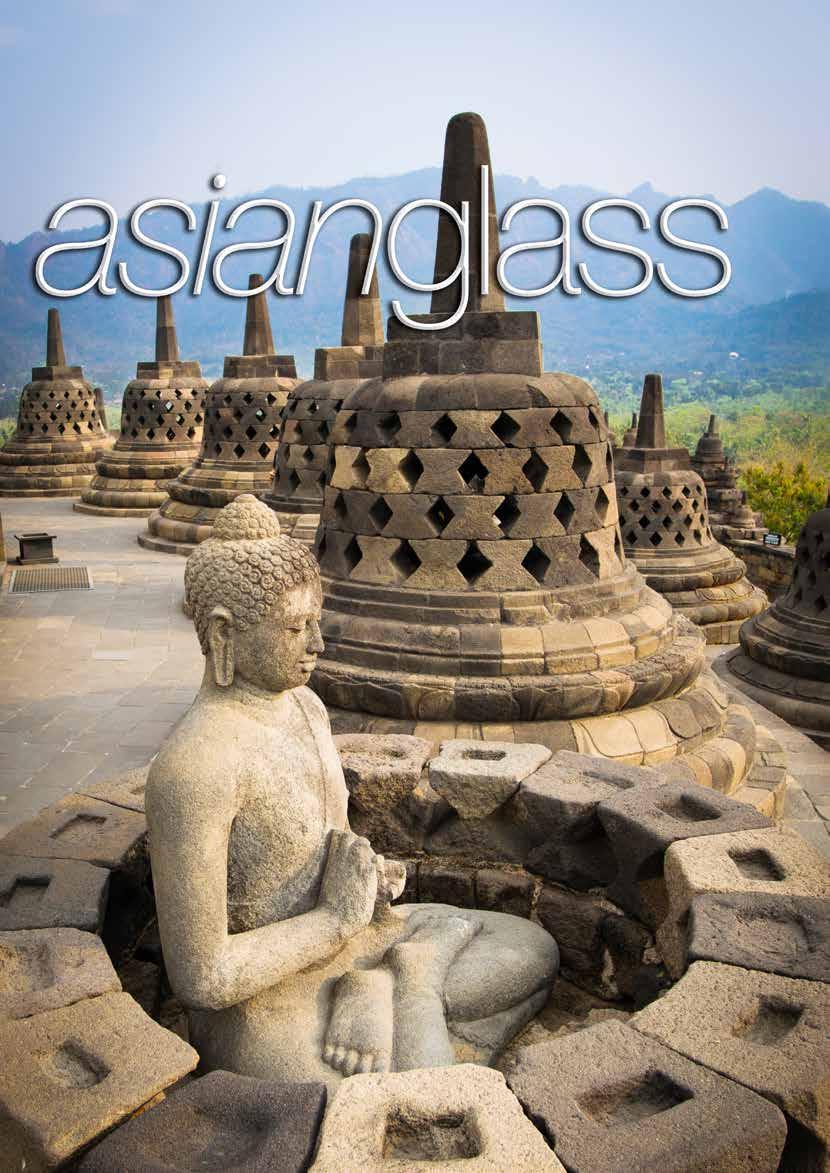
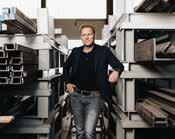
Beverage packaging trends Soda ash TECH FOCUS: What next for float glass? Is this your own copy? Subscribe online at www.asianglass.com AG22-6 Indonesia: Benders and shapers Plus news, views, interviews and more… Exclusive interview with Philipp Zippe, CEO of Zippe
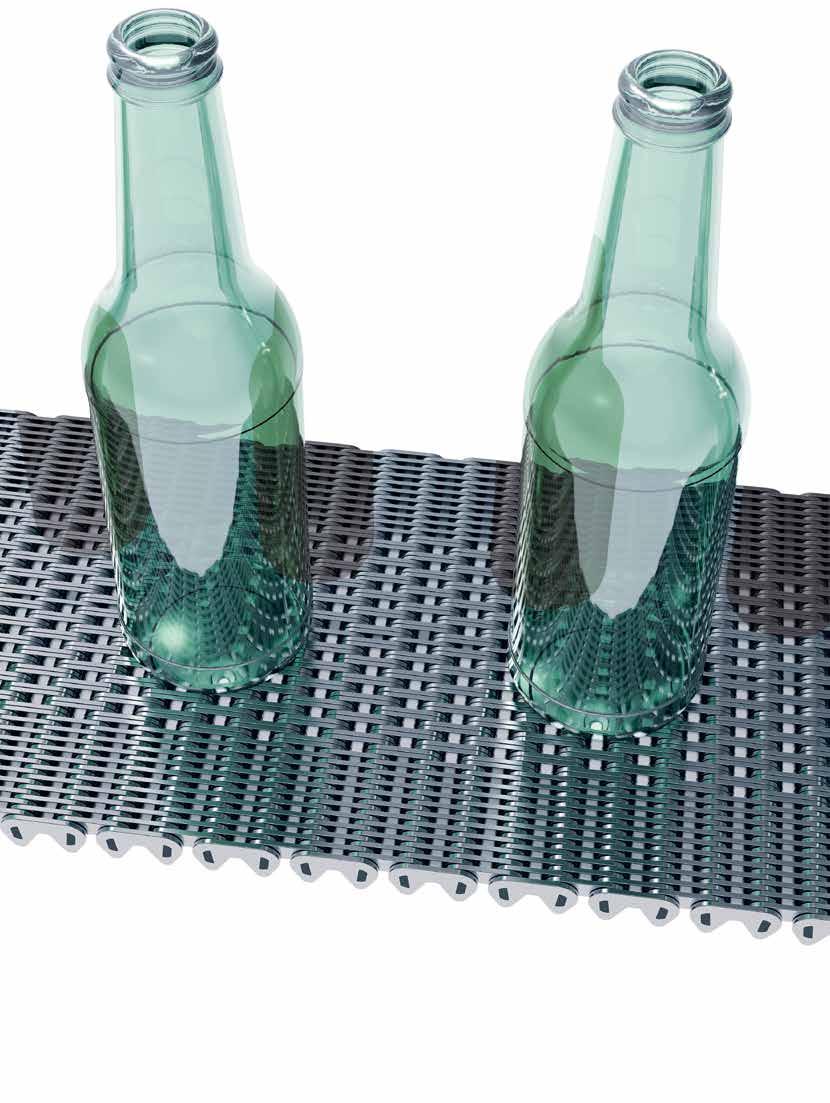

™ THE
OF CONVEYOR CHAIN www.pennine.org sales@pennine.org +44 (0) 1484 864733
FUTURE
We see a world designed with smarter, safer and more energy-efficient glass. We’re innovating the technology for you to make this a reality.
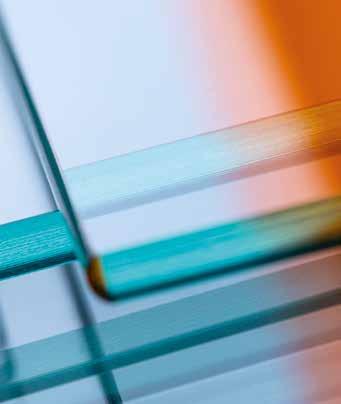

All about glass processing: www.glastory.net
info@glaston.net | www.glaston.net | www.glastory.net | www.gpd.fi
 Machinery, services and solutions designed with the future in mind for the architectural, automotive, solar and appliance industries.
Machinery, services and solutions designed with the future in mind for the architectural, automotive, solar and appliance industries.
Regulars
6 Welcome
Goodbye 2022, Hello 2023.
8 Headline News
Openings, closures and industry moves from across Asia.
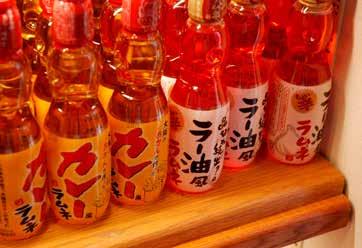
14 Global View
Our eye on the international arena.
20
People and Places
Movers and shakers, ups and downs.
26 Batch
Raw material news and updates.
32 Comment & Analysis
Mining experts believe that if cyber security is not addressed as a priority and protection against increasingly sophisticated attacks is not implemented, lives may be at risk.
Features
34 Indonesia: Benders and shapers
Sources in the Indonesian glass industry have reported an improved outlook for the year, reports Jahir Ahmed, citing a rise in demand for processed glass in the automotive, construction, and furniture industries.
42 Beverage packing trends
In some segments of the beverage industry, producers of container glass face stiff competition from alternative forms of packaging, including PET bottles and metal cans, notes Yogender Singh Malik.
50 Soda ash
It seemed that the soda ash market had just about recovered from the impact of COVID-19 when it was negatively affected by the war in the Ukraine, writes Marguerite Morrin, executive director, global soda ash, chemical market analytics by OPIS, a Dow Jones company.
56 TECH FOCUS: What next for float glass


With climate change progressing and carbon neutrality needed by 2045, switching to more renewable energy sources and more advanced technologies is becoming increasingly important, says a glasstec report.
Anaylsis
62 In Focus
Founded in 1920, the name of this German company is synonymous with different technologies in the batch and cullet processing industries. In an exclusive interview with Asian Glass, Philipp Zippe, CEO of Zippe, discusses how his company has consistently delivered on its promises for over a century.
66 Window
As insight into Indonesia’s glass trade for the period of 20172021.
68 Refractory Zone
News and developments from the refractory supply industry.
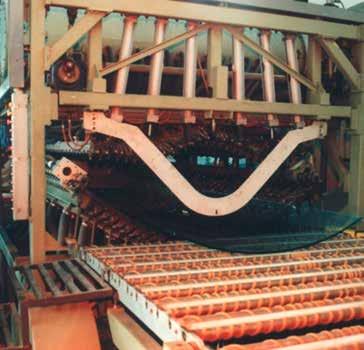
asianglass AG 22-6 www.asianglass.com 2
42
Contents: AG 22-6
Your favourite magazine is now available at the App Store… download today to see your first sample issue! Asian Glass: now for mobiles, ipads and androids 34
For humans, it’s obvious. For NEO too.
NEO Artificial Intelligence for defect recognition
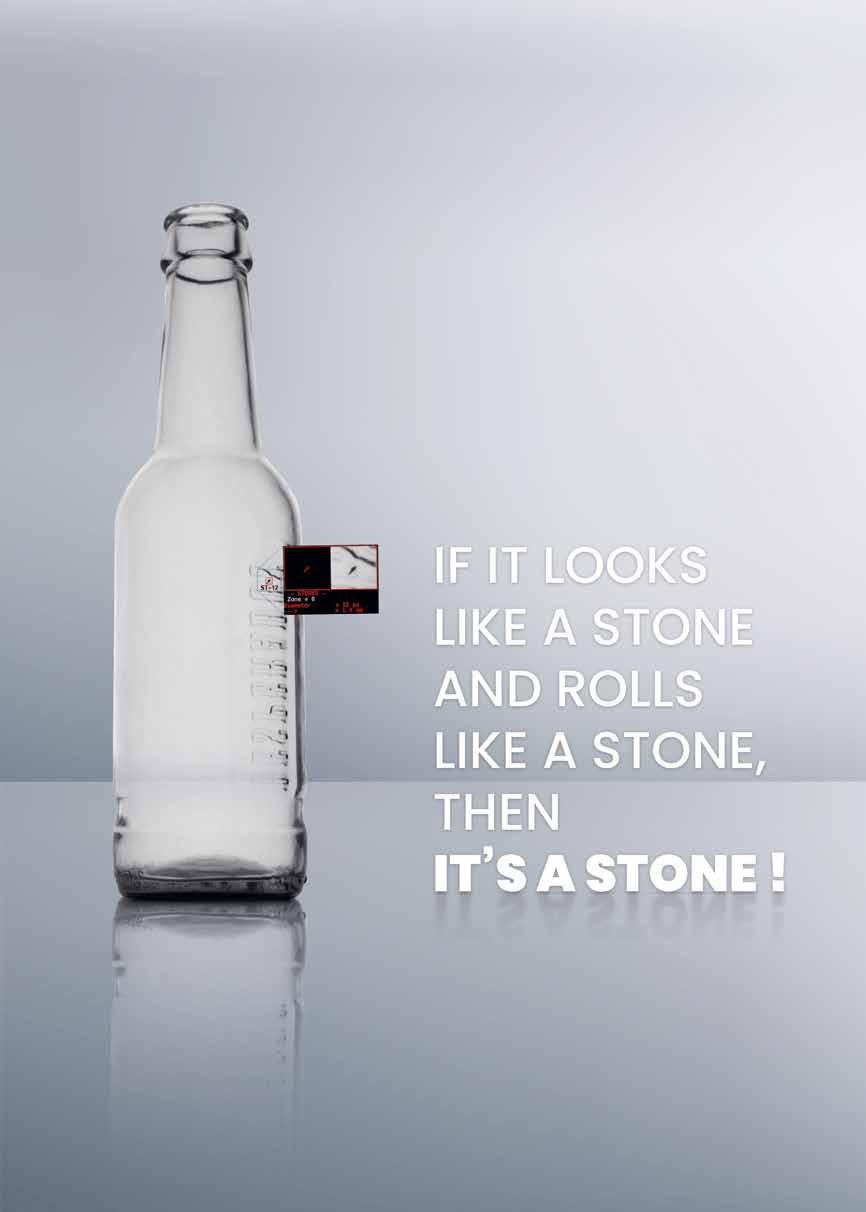
Insight Asia
Redwave Qi
Introducing the first fully automatic quality control system for mobile containers
For more than 25 years, Redwave has developed ground-breaking solutions for the recycling industry. The company has recently delivered to a major German glass manufacturer the first fully automated quality control system in mobile container design, along with sorting machines and sorting systems for extracting recyclable material. The container solution is quick and easy to install, and its flexible design facilitates both future adaptations and rapid location changes.
Wiegand-Glas, one of Germany's largest family-owned glass producers, took possession of Redwave's Qi in October 2022, the world's first quality control system designed to integrate into a mobile shipping container. The major raw material in glass production is cullet, and high-quality cullet is essential for strong final products. Contaminants such as ceramics, stones or porcelain can result in massive
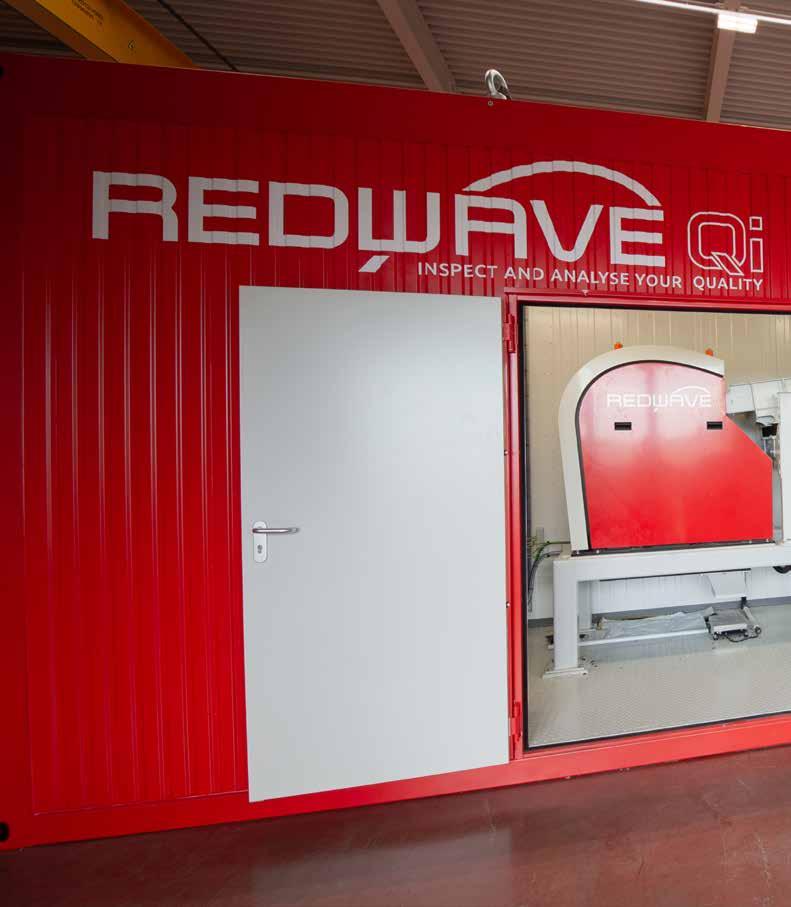
financial losses. In addition, there may be additional impurities in heat-resistant and non-melted glass-ceramic particles that can slip into the cullet, causing weaker glass and a greater likelihood of shattering. The Redwave Qi is a mobile container-housed quality control system that Wiegand-Glas invested in for the purpose of avoiding these impurities.
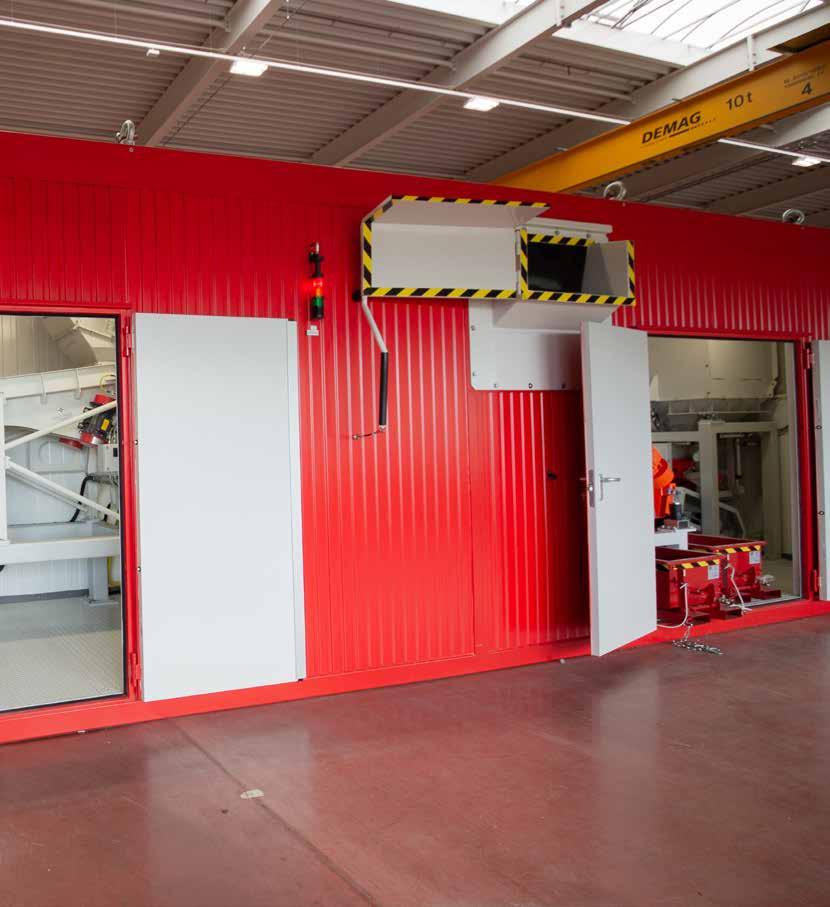
Designed to be independent, this system can be configured as either a mobile or stationary unit and can also be integrated into existing systems of sorting. A Redwave Qi analyser is used to determine the quality of cullet at the beginning of glass production by examining, controlling, and evaluating the material that is to be processed. Through the testing of the material composition, Redwave Qi is able to provide valuable information regarding the quality of input material. By performing this step, it is possible to detect undesirable impurities that may later result in weaknesses in the final product.

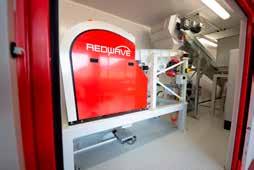
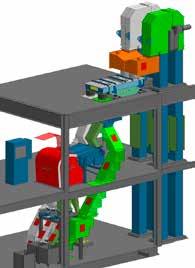
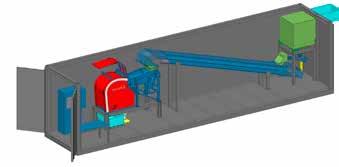
Welcome
Soda ash is one of the world’s most abundant natural resources. Additionally, it is one of the most basic industrial chemicals and an integral component of many everyday products. It has a wide range of applications in several different industries, including glass. About half of all soda ash is consumed by the glass industry: flat glass for the housing, commercial building and automotive industries as well as container glass for consumer products. Other glass-related uses include lighting, fibreglass insulation, glassware, display screens for consumer electronics and solar panels. However, in recent years, the soda ash market has seen extreme volatility. Events in 2020 set the stage for today’s soda ash industry. There was a sharp decline in demand in 2020, followed by a strong recovery in 2021, to the point where demand in 2021 exceeded that prior to COVID. The soda ash market has, however, experienced extreme volatility in recent years, not least as a result of the conflict in Ukraine. According to market experts, this volatility may continue into the new year, but the market will stabilise towards the middle of the year after a period of turbulence. That is very welcome news for our industry, indeed.
Indonesia: Benders and shaperrs
CONTACT DETAILS
EDITOR
Editor Isaac Hamza
Email: ihamza@asianglass.com
Direct line: + 44 (0) 208 123 1540
ADVERTISING
AND DESIGN
Advertising Sales

Paul Russell
Email: prussell@asianglass.com
Direct line: + 44 (0) 208 638 0619
Valerie Adamson
Email: vadamson@asianglass.com
More than 80% of the total container glass demand is derived from the beverage packaging industry. The fortunes of the container glass industry are therefore closely tied to the fortunes of the beverage packaging industry. In most countries, the growth of the beverage market has led to a steady increase in the demand for glass containers, but Yogender Singh Malik notes that container glass producers face intense competition in some subsectors of the beverage industry, including PET bottles and metal cans. Through his review, we can gain a better understanding of how the container glass manufacturers are surviving and sometimes even thriving.
The Zippe company is among the world’s leading manufacturers of batch and cullet plants for the glass industry. For more than 100 years, it has designed and implemented more than 600 batch plants and more than 1,000 cutting plants in accordance with customer requirements.
Philipp Zippe, CEO, Zippe takes us behind the scenes of a company that consistently delivers on its promises for more than a century in this issue’s exclusive interview.
Last but not least, as the year comes to an end, we at Asian Glass would like to express our gratitude to all of our readers, as well as to all of our advertisers, contributors, and well-wishers. You have been an integral part of our success - and we owe it all to you. Here’s wishing you a
Direct line: + 44 (0) 208 133 5273
Production and design Tim Mitchell www.piernine.co
OVERSEAS OFFICES
Bangladesh Jahir Ahmed jahir@asianglass.com
India Yogender Singh Malik yogender@asianglass.com
Sri Lanka Rohan Gunasekera rohan@asianglass.com
RESEARCH
Research Manager
Andy Skillen
Isaac Hamza Editor
Email: askillen@bowheadmedia.com
HEAD OFFICE
27 Old Gloucester Street, London WC1N 3AX, UK.
Directors: Valerie Adamson & Paul Russell.
Asian Glass (ISSN: 1475-6501), is published by Adamson-Russell Communications Ltd, registered in the UK No. 13652192.


6 asianglass AG 22-6 www.asianglass.com
Beverage packaging trends Soda ash TECH FOCUS: What next for float glass? Is this your own copy? Subscribe online at www.asianglass.com AG22-6
Plus news, views,
and more… Exclusive
Covers_CURRENT.indd 2 16:42 News, Views, Analysis and much more! www.asianglass.com
interviews
interview with Philipp Zippe, CEO of Zippe
NO.1 IN SPEED AND FLEXIBILITY MAXIMISE YOUR PROFIT
H i PERFORM
COMBINE SPEED AND FLEXIBILITY WITH SUPERIOR LIFETIME
+ High production speed
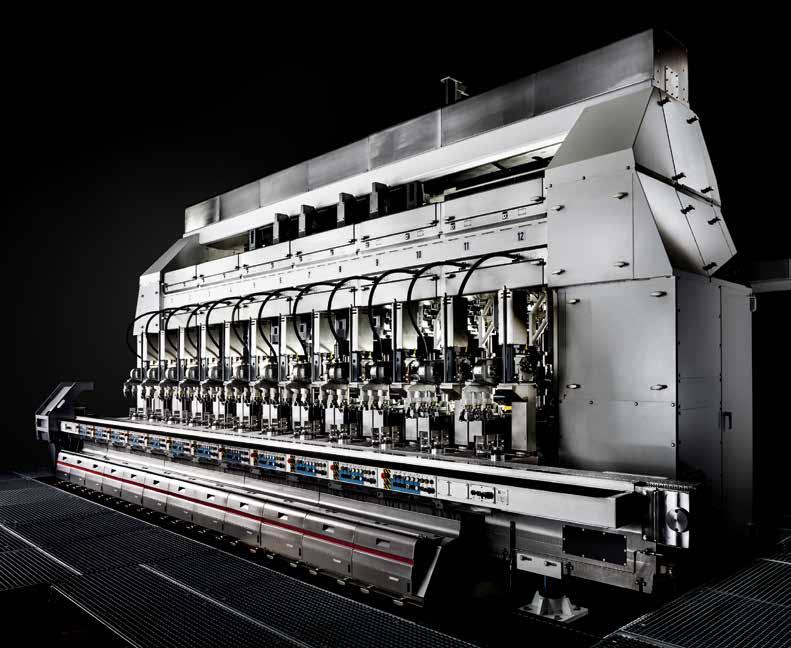
+ Fast job changes
+ Reduced downtimes
+ Robot option
+ Clean design
www.heye-international.com
HEADLINE NEWS ASIA
Ras Al Khaimah industrial audit sees companies sign-up
United Arab Emirates
Ras Al Khaimah Municipality has launched an energy audit programme for the industrial sector. The programme will help industrial companies identify energy saving opportunities that will make them more environmentally friendly and competitive.
Companies such as RAK Ceramics, Stevin Rock, RAK Rock, Falcon Technologies, RAK Ports, Union Cements, Eternity Technologies, and Future Architectural Glass among the first signatories signed agreements with Ras Al Khaimah Municipality during the RAK Energy Summit to take part in the programme. The industrial sectors initially supported in the programme are cement, ceramics, quarries, glass, building materials, metal fabrication and packaging.

On the occasion of launch,
Munther Mohammed bin
Shekar, director general of Ras Al Khaimah Municipality said: “The programme will support local industrial companies in identifying opportunities for energy savings and reduction of emissions, that will help them remain competitive over the long run. I encourage all the industrial companies in Ras Al Khaimah, for whom energy is a main cost, to participate in this initiative.”
Participating industries will receive an energy audit, conducted by expert energy auditors, and will periodically share progress of implementation with Ras Al Khaimah Municipality. Audits are procured at scale with the support of Ras Al Khaimah Municipality, while Rakbank provides a credit facility to dilute the cost of the audit over time along with evaluating for any
other financial support that such companies may need.
Until now, Ras Al Khaimah Municipality has empanelled a total of seven expert industrial auditors using a competitive tender process. Participating companies can choose any of the empanelled auditors to conduct an energy audit, including onsite measurements and assessment of energy saving opportunities. Reem Office of Ras Al Khaimah Municipality will support both parties during the whole process by facilitating data collection and logistics as well as by providing technical support.
In addition to the energy audits, the programme will also include knowledge sharing sessions with energy efficiency experts as well as suppliers of technologies and services. These sessions will enable local industries to learn
and follow best-practices and use state-of-the-art technologies to become more energy efficient and contribute to achieving wider sustainability targets.
This initiative is part of the Energy Management programme of Ras Al Khaimah Energy Efficiency and Renewables Strategy 2040, and is in line with several strategies and policies, including Operation 300bn of the Ministry of Industry and Advanced Technology, and the UAE Circular Economy Policy.
Visitor influx at Eurasia Window, Door and Glass Fairs
Turkey
The Eurasia Window, Door and Glass Fairs, which are included among the largest and most prestigious industrial events in the region, was held at the Istanbul Tüyap Fair and Congress Center from 12 -16 November 2022.
The 23rd International Window, Window Shade, Facade Systems and Accessories, Profile, Production Technologies and Machinery, Insulation Materials, Raw Materials and Auxiliary Products Fair brought together leading firms in the industry operating in the fields of window manufacturing machinery and technologies, window profiles, profile manufacturing machinery, window mechanisms, window side industry, facade systems, insulation materials, raw materials and auxiliary products with numerous decision-making
industry professionals.
The fairs, held in collaboration with the Window and Door Sector Association (PUKAD), Window Producers Quality League Association (PUKAB) and Entrepreneur Aluminum Industrialists and Business People Association (GALSIAD), were visited by 60,128 people from 126 countries, including 13,143 visitors from abroad and 46,985 local visitors from Turkey.
Ali Muharremoğlu, managing director, Reed Tüyap Fuarcılık, stated: "The Eurasia Door, Window and Glass Fairs were concluded with a record-high attendance figure. Leading firms from the industry exhibited their latest innovative solutions in the fields of door, window and glass manufacturing. This year our participants were also extremely pleased with the interest shown
in the auxiliary products and solutions at the aluminium and shading special sections. We have seen professional visitors from 126 countries establish key business contacts during the fairs."
The Eurasia Door Fair gathered visitors for the 14th time, and the Eurasia Glass Fair for the 12th time. The Eurasia Door Fair, where the industry's leading manufacturers of interior door and door systems, locks, panels, panels, partition systems and accessories exhibited their products and services, met with its visitors for the 14th time; and the Eurasia Glass Fair met with its visitors for the 12th time with glass products and applications, productionprocessing technologies and machines, and complementary products and chemicals.
See you again between November 11 - 15, 2023…
The Eurasia Door, Window and Glass Fairs will open its doors again between November 1115, 2023, presenting a wide range of opportunities for establishing key business contacts.
Asian Glass: mobiles, ipads & androids


8 asianglass AG 22-6 www.asianglass.com
Borosil Renewables acquires 86% of Interfloat Group
India


India’s largest solar float glass producer, Borosil Renewables has acquired an 86% stake in Interfloat Group, Europe’s largest solar glass manufacturer.

Interfloat Group is based in Germany and Lichtenstein and has been serving customers in the solar industry since 2008. It operates through Glasmanufaktur Brandenburg GmbH (GMB), which has a production facility near Berlin, and Liechtensteinbased Interfloat Corporation, which supplies the glass to the
European market.GMB operates a solar glass plant with a production capacity of 300 tonnes/day.






With this acquisition, Borosil Renewable’s solar glass manufacturing capacity will grow 66% to 750 tonnes/day.
Company’s total capacity would increase to 1,300 tonnes/day with the commissioning of a new furnace with a capacity of 550 tonnes/day in India over the next two months.
This acquisition will make a wider range of solar glass available



to BRL's expanded customer base in Europe.
“The overseas wholly owned subsidiaries of the Company [Borosil Renewables], namely, Geosphere Glassworks GmbH and Laxman AG, have completed the acquisition of 86% stake in GMB Glasmanufaktur Brandenburg GmbH (GMB) and Interfloat Corporation (Interfloat), respectively. Consequently, both GMB and Interfloat have become step-down subsidiary companies of the company.

“Borosil is committed to investing in manufacturing in Europe and will be increasing capacity at GMB’s Tschernitz plant at an appropriate time in the near future.
“This means that BRL and Interfloat will be able to supply significantly higher volumes of solar glass to their present and new customers by improving the serviceability as a result of the production from two locations now,” stated a company statement published on the stock exchange.
Competition Commission of India puts on hold HNGL acquisition
India’s largest container glass producer, Hindustan National Glass Limited’s ( HNGL) acquisition has been put on hold by the Competition Commission of India ( CCI), a few days after the committee of creditors (CoC) showed a green light to the proposed resolution plan.
CCI has invalidated details furnished by AGI Greenpac and has asked the company
to submit more details. These details are sought by the competition commission when the market share of the acquiring company is more than 15% in the domestic market.
In the last week of October, HNG's CoC approved the plan of the company's acquisition by the second largest container glass producer, AGI Greenpac for INR 22,130 million.
HNG owes INR 17,100 million to a group of 12 creditors, led by the State Bank of India (SBI). The insolvency proceedings were initiated in October 2021 by DBS Bank which has an exposure of INR 4,680 million.
Earlier, AGI Greenpac was known as Hindusthan Sanitaryware & Industry. Its resolution proposal got 98% votes of the CoC, followed by
88% to the Uganda-based Madhwani group.
AGI Greenpac offered INR 18,510 million upfront and INR 3,650 million in the form of deferred payments to the lenders. An amount of INR 60 million was proposed to be paid to the employees of HNG.
The plan was given a go-ahead by SBI, Edelweiss, DBS, LIC and other important CoC members.
Yalova's Ekomat project, a first in Turkey, gets underway
India Turkey
The Ekomat project, which is being implemented for the first time in Turkey with the support of the BIRCAM Foundation, the GCA, and Park Cam, has been launched in Yalova, which was chosen as the pilot city. It is the goal of the project to create awareness about recycling and to collect numerical data for waste management setup prior to the implementation of the mandatory deposit system.
Yalova Governor Muammer Erol, Yalova Deputy Mayor Mustafa Tutuk, Bircam Foundation President Ömer Kızıl, Park Cam General Manager Semih Özbey and GCA General Manager Abdullah Gayret attended the opening ceremony
at the Yalova Raif Dinçkök Cultural Center.
The Ekomat Project details were explained by Gayret and Özbey, and the first bottles were recovered following the protocol. Ekomat, which is supported by the Turkish Environment Agency and whose pilot city is Yalova, is financed by the glass packaging manufacturers GCA and Park Cam, and the waste management operations are carried out by the BIRCAM Foundation. Gayret explained that the main objective of the EKOMAT project is to contribute to recycling, since glass is a material that is limitlessly recyclable, while at the same time raising consumer awareness of
this issue. "With Ekomats, we will reduce the demand for new raw materials to be used in production, and at the same time, we will create recycling awareness in the society. With this project, we experience the pride and joy of being an example to the whole of Turkey.”
Özbay said: “We love our country and we want to leave a more livable world to our children, who are our future. We are also aware that if we do not make important individuals for the environment today, it will be too late tomorrow.
“As Park Cam, we have made significant expenditures on recycling activities since the day we were founded. We created sustainable
glass waste management models by establishing the Bircam Foundation with Beypazarı, Uludağ, Kınık and Sarıkız mineral waters. It is our most valued project at EKOMAT, we look forward to your participation.”
Kızıl said: “As part of the Ekomat project, an end-to-end integrated waste management system will be provided. Thanks to the national software we developed, the occupancy rates will be monitored with the integration of vending machines into the software.
"When they reach a certain occupancy rate, the field team will be messaged and instructed to empty the vending machine.”
9 www.asianglass.com AG 22-6 asianglass
Glass for Europe brings sustainability to Glasstech Asia
Singapore
Glasstech Asia reassembled in Singapore from 26-28 October for the first time after several years of COVID-19. Alongside the fair gathering hundreds of actors of the South-East Asian industry and the 2022 International Year of Glass celebrations by the Singapore glass association, the 2022 Asia Façade and Glass Conference was organised. Its main theme was sustainability, both in the industry and in architecture and buildings.
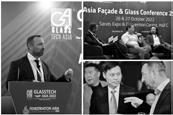
Glass for Europe was called upon to address these topics and explain the European vision and work in the field, considering the
leading role of Europe’s industry in this regard. Glass for Europe’s Secretary General, Bertrand Cazes, made a presentation on the 2050 vision of the flat glass industry in a climate neutral Europe and how this vision supports the industry’s sustainability efforts to keep glass as material of first choice for the design of genuinely sustainable buildings.
Bertrand also moderated an exciting panel discussion with Glenn Carlton from Guardian Glass, Jayrold Bautista from DOW and Johannes Kreissig from the German Sustainable Building Council, on how to enhance
sustainability considerations in the design and construction of facades is South-East Asia.
Reflecting on the German experience and the realities of the South-East-Asian markets, the panel touched upon the importance of raising awareness on whole life-cycle carbon assessment, of product transparency and verified environmental declarations and of safeguarding affordability. The panel discussion concluded that sustainable buildings ought to be breathable buildings both for the planet and for their occupants that are achievable and
scalable worldwide.
The event also offered the opportunity to meet with with Gan Pay Yap, Chairman of Singapore Glass Association, and enlarge Glass for Europe’s network building new ties with representatives of Glass associations from Vietnam, Indonesia and Malesia.
Vibrantz Technologies to sell DipTech digital printer business
Israel/United States
Vibrantz Technologies today announced that its DipTech subsidiary based in Israel has entered into an agreement to sell its digital printer business to Kerajet. The digital ink business is not part of the sale. The deal is expected to close within the next 60 days.
“This sale allows Vibrantz to redouble our focus on the production and development of digital inks for Kerajet and other digital printer manufacturers,” said D. Michael Wilson, Vibrantz president and CEO “It also
helps ensure our unmatched glass expertise and capabilities continue to grow in support of the digital printing market.”
“Kerajet’s expertise in the ceramics market and two decades of experience in digital printers well positions the company to take over DipTech’s digital printer business,” added Matthias Bell, president of Performance Coatings at Vibrantz.
Vibrantz will provide further information to DipTech customers upon the closing of the transaction. Until that time, customers should continue transacting with DipTech
as usual.
Founded in 1998 and headquartered in Castellon, Spain, Kerajet is a designer and manufacturer of advanced digital printers for ceramics, textiles, tableware, PVC, fibre cement and other applications using different kinds of inks, depending on the final product.
Vibrantz provides specialty chemicals and materials around the world. The company serves over 11,000 customers and its products and technologies are used in a broad range of
applications and consumer products. It specialises in particle engineering, glass and ceramics science, and colour technology, and offers specialty mineral and chemical additives for batteries, electronic components, and construction, dry powder pigments for paints and coatings, thermoset plastics, thermoplastics, glass coatings, and porcelain enamels. It is based in Houston, Texas, and employs over 5,000 people across 65 manufacturing sites across six continents.
NSG operates second float glass plant in Argentina
Japan/Argentina
The NSG Group has announced that the construction and operation of the second float glass plant has been completed.
Located in Los Cardales, Argentina, the new plant is operated by Vidriera Argentina S.A. (VASA), a joint venture subsidiary with over 80 years of experience.
The investment was made in 2018 in order to meet the growing demand for architectural and automotive glass in Argentina, as well as supply the market in South America, which continues to grow. It was originally planned to begin operations at the beginning of 2020, however due to the turmoil in the global economy, which includes the spread of COVID-19, the start of operations has been delayed.
After the construction work was successfully completed, the furnace was warmed and production of glass began on 8 October.
In spite of a challenging macroeconomic environment, glass demand continues to outpace supply due to a continued increase in construction activity. The NSG Group views the region as a promising market in which to demonstrate its business capabilities.
NSG Group promotes "Expansion of Value-Added Business" and "Transformation into more profitable portfolio of business" as part of its mediumterm management plan titled "Revival Plan 24 (RP24)". One of the Group's strategic investments will be the operation of a new
float line in Argentina and South America, where the Group has established a strong position for many years.
The NSG Group is a global supplier of glass and glazing systems offered through its three main business segments, Architectural, Automotive, and Creative Technology.
Architectural Glass manufactures and supplies architectural glass as well as glass for solar energy and other sectors.
Automotive Glass serves the original equipment (OE) and aftermarket replacement (AGR) glazing markets.
Creative Technology comprises several discrete businesses, including lenses and light guides for printers and scanners, and
specialty glass fibre products such as glass cords for timing belts and glass flakes.
Founded in 1938, VASA is a joint venture of NSG (51%) and SaintGobain (49%) that is Argentina's only supplier of float glass. VASA's Llavallol plant currently operates one float line, one rolled line, one silvering line, two laminated lines for architectural glass, and an offline cutting facility for automotive glass.
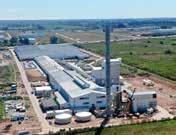
10 www.asianglass.com asianglass AG 22-6 News
Dimensional measurement for glass containers—simplified.

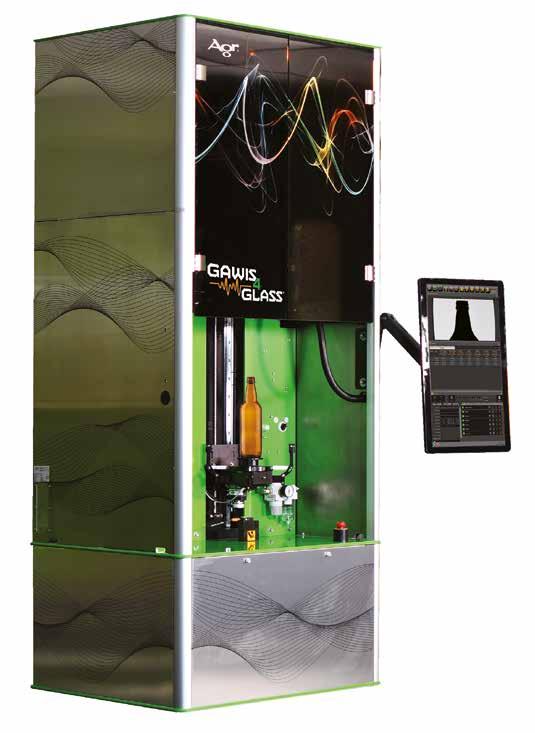
• Accurate. Fast. Intuitive. Powerful, simple job creation and editing
Pre-defined container measurement routines
automated feature recognition and job setup in seconds
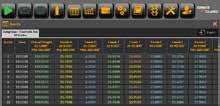

AGRINTL.COM +1.724.482.2163
Phoenicia and Airovation Technologies sign MOU

Israel
The new MOU will see Airovation’s groundbreaking technology implemented into Phoenicia’s plant to turn the factory’s CO2 emissions into raw materials used in the glass making production process. By creating this circular economy, the two parties hope to not only reduce the carbon footprint but enable the Phoenicia to be less dependent on imports. A glass manufacturer, developer, and supplier since 1934, Phoenicia produces, develops, and supplies
glass. The factory is located in the Lower Galilee, in the fast-developing industrial area of Nazareth, enabling easy and fast deliveries to local customers and to Haifa Port, which serves more than 30 different destinations worldwide. Phoenicia's float line is designed to produce low iron float glass and specialty glass. Airovation Technologies provides original, patented air purification and carbon capture systems. The core technology has been developed at The Hebrew University of Jerusalem
over a period of over ten years and is designed to efficiently and economically capture and convert CO2 into valuable mineral endproducts in the form of carbonate and bicarbonate minerals and oxygen. The technology can also be used to purify indoor air spaces by oxidising microbiological threats, such as viruses and bacteria, while converting harmful gases into oxygen-enriched clean air. A key technological advance is the generation of superoxide
Cobalt Blue participates in Korean delegation
Australia/South Korea
Cobalt Blue again participated in the Australian Critical Minerals Delegation to South Korea, with this visit held on 11-14 October. The Delegation was led by Senator the Hon Don Farrell (Australian Minister for Trade and Tourism) and his counterpart, Minister Lee
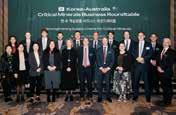
(Korean Minister for Trade, Energy and Industry).
Government and industry representatives from the South Korea and Australia acknowledged the strategic importance of securing critical minerals supply chains to support the development of clean
energy applications.
Bruce Blunden represented Cobalt Blue Holdings Limited on the Delegation, where he shared information on the opportunities for a long-term supply of ethical cobalt for battery applications from the Broken Hill Cobalt Project.
AIS reports unaudited second quarter results
India
Asahi India Glass Limited (AIS), which manufactures and delivers glass products to retail and institutional customers, announced its unaudited financial results for the second quarter ended 30 September at its Board Meeting.
Sanjay Labroo, CEO and managing director of AIS, said: “I am happy to share that we
posted our highest absolute sales figures this quarter, which were backed by a very strong and steep demand recovery in the automotive segment.
“However, our operating profits remained almost flat during the quarter, resulting in a compression in EBIDTA margins. This was a result of inflation over the last quarter,
especially in our automotive glass business which also witnessed very high volatility in model mix of the increased demand, leading to some operational inefficiencies versus our internal budgets.
“I am also glad to update that our new project for setting up a greenfield float glass plant is progressing quite well, and we
radicals in situ, which are among the strongest oxidisers known to science. The company develops solutions for indoor air treatment as well as carbon capture in industrial settings.
Blunden said: “Taking part in the Delegation provided many occasions for us to present and discuss the Broken Hill Cobalt Project.”
target to commence operations in Q2 FY 24-25.”
AIS was established in 1986 and is one of the leading players in the automotive and architectural glass segments. It holds a market share of approximately 72% in Indian passenger car glass and has an established track record over the past three decades.
Glasstech Asia and Fenestration Asia 2022 celebrate success
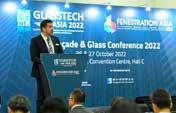
Singapore
Glasstech Asia and Fenestration Asia concluded successfully on 28 October. In total, more than 2000 attendees from over 28 countries attended the event which held the fair alongside an all-inclusive variety of side events such as the inaugural Asia Façade & Glass Conference, Singapore façade tour, international year of glass exhibition Through the Looking Glass, buyer-seller meetings, as well as an annual networking gala dinner.
Michael Wilton, CEO and managing director of MMI Asia, said: “The importance of this event and its success shows a promising trajectory for the glass and façade sector. The personal touch of
having face-to-face discussions remains undisputed as the most effective way to set growth in the industry.
“With more plans to integrate Glasstech Asia and Fenestration Asia into the global BAU Network, I foresee an exciting future in providing the industry with increasing opportunities to share their story with a wider global audience.”
Gan Pay Yap, chairman of Singapore Glass Association, said: “The success of this edition does not only represent a restoration of industry norms, but the revival of close knitted connections made possible by regional platforms
such as Glasstech Asia and Fenestration Asia.
‘The Glass Hub of Southeast Asia’, Glasstech Asia is an annual rotating exhibition that focuses on all things related to glass. A combined event of the 18th edition of Glasstech Asia and Fenestration Asia was held at the Sands Expo & Convention Centre in Singapore from the 26th to the 28th of October, this year. This three-day event featured exhibitors from the Southeast Asian glass and glazing sector, ranging from glass manufacturing, processing, and machinery to accessories, raw materials, and finished glass products.
The next Glasstech Asia - the 19th International Glass Products, Glass Manufacturing, Processing & Materials Exhibition, and Fenestration Asia – the 6th International Windows, Doors, Skylights, Curtain Wall & Facade Technology Exhibition, will take place from 29 November-1 December 2023 at the IMPACT Exhibition and Convention Centre in Bangkok, Thailand.
12 www.asianglass.com asianglass AG 22-6 News
Image Credit: Yoav Weiss, Airovation Technologies, Airovation Technologies
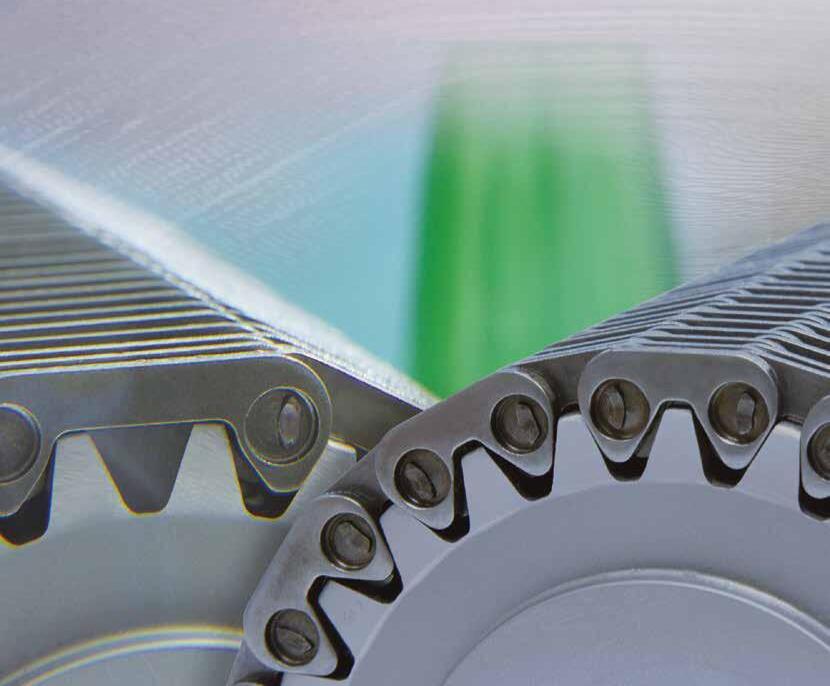
13 www.asianglass.com AG 22-6 asianglass News Contact Ramsey at www.ramseychain.com, sales@ramseychain.com, (704) 394-0322 • Guard Links with Fully Recessed Pin Heads • 100% Hardened Alloy Steel Construction • Staked to Decrease Chain Elongation • Special Side Links For Easy Connection • Pre-Stressing for Reduced Chain Elongation • Available in ½” and 1” Extended Pitch ACTUAL PHOTOS OF SENTRY SINCE 1923 SENTRY 2-PI N CHAIN. FOR LONGER LIF E & HIGHE R SPEEDS. Ramsey’s 100% Steel Sentry 2-Pin Chains:
Global View
Glass Focus Awards 2022 winners revealed
The winners of the Glass Focus Awards 2022 were unveiled at a black-tie dinner hosted at the Sefton Park Palm House in Liverpool on 17 November.
Companies from across the glass supply chain gathered to celebrate the International Year of Glass and the milestones of the previous 12 months at the event which saw Pilkington NSG crowned Company of the Year for the first time.
The flat glass manufacturers also won the health and safety action award while Saint-Gobain Glass UK and Ardagh Glass Packaging were both double winners on the night. The former took home the Design of the year – flat glass and Strengthening business through people awards with the latter awarded the Sustainable practice and Marketing impact categories.
Other winners included Beatson Clark’s Dana Godfrey winning the Rising Star award, Encirc securing the Innovative
solution prize and Stoelzle Flacconage’s One Gin coming out on top in the Design of the year – container award.
British Glass CEO Dave Dalton said:
“It has been another testing year for the glass sector and while may of the problems we have faced still persist, it is a great pleasure to gather everybody together at the Glass Focus Awards again to celebrate all the achievements our great industry has accomplished.
“As always, the level of entries for each of the categories has been spectacular and wide ranging. From showcasing our talent for innovation and our status as pioneers on the journey towards net zero to the beautiful designs we see every day on our bottles and buildings and the unrivalled talent that makes up our workforce, it is a reminder of why the glass industry stands in a class of its own.
“We are all extremely proud of
the work we have done over the last year, and we look forward to continuing to build on our successes in 2023 and beyond.”
The full list of winners from the Glass Focus Awards 2022 are:
Design of the year – container (sponsored by Packaging Innovations): One Gin by Stoelzle Flaconnage Ltd
Design of the year – flat (sponsored by Glass International): The Spark by Saint-Gobain Glass UK
Innovative solution (sponsored by Glass Technology Services): Cooling system improvements by Encirc
Health and safety action (sponsored by Grayling): Vehicle and pedestrian GAP analysis tool by Pilkington NSG
Strengthening business through people (sponsored by Glass Worldwide): Complex cold repair by Saint-Gobain Glass UK
Rising Star (sponsored by the Worshipful Company of Glass Sellers): Dana Godfrey at Beatson Clark
Marketing Impact (sponsored by awesome.): The Glass making process by Ardagh Glass Packaging
Sustainable Practice (sponsored by Glass Futures): Water saving initiative by Ardagh Glass Packaging
British Glass Company of the Year: Pilkington NSG
Stakeholders mark UN International Year of Glass in 2022
The United Nations designated 2022 as the International Year of glass, the first time a manmade material was chosen for worldwide attention. On 16 November, Glass Alliance Europe marked the occasion with an event gathering policy makers and stakeholders at the Representation of the Free State of Bavaria to the European Union in Brussels.
Opening the event, Maive Rute, Deputy Director-General, DG GROW, European Commission, said: “Glass can play an important role as a material, helping to enable our green and digital transition and supporting our society in achieving long-term sustainability and prosperity. The glass industry has a long and rooted tradition in Europe, and we must work to ensure that it is able to continue operating in our continent at competitive conditions.”
Barbara Schretter, Director of the Representation of the Free State of Bavaria to the
European Union added that “Europe is home to many glass producers who are helping to turn Europe into a prosperous and sustainable economy and society.”
Speaking on how glass can enable a world without waste, Aurel Ciobanu-Dordea, director of circular economy, DG ENVI, European Commission welcomed “the glass industry efforts to deliver on the EU’s Circular Economy Action Plan to ensure that waste is prevented, and the resources used are kept in the EU economy for as long
as possible.”
Glass plays a key role as a high-tech material vital to the energy performance, safety, security and comfort of our homes, offices, buildings and cars and is essential to make Europe fit for sustainable living.
Anne-Katharina Weidenbach, energy efficiency expert at the Cabinet of Commissioner Simson (DG Energy), was among the panellists to discuss how glass will contribute to sustainable living and will be crucial to green energy production in Europe.
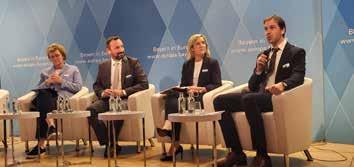
The glass industry is committed to ensuring that greenhouse gas emissions from glass production drop substantially in the next decades. MEP Monika Hohlmeier along with UNIDO’s Managing Director Gunther Beger highlighted the challenges of decarbonisation and the importance of sharing best practices emerging from the glass industry’s roadmaps towards a climate neutral Europe.
Asian Glass: mobiles, ipads & androids


14 asianglass AG 22-6 www.asianglass.com News
United Kingdom
Belgium

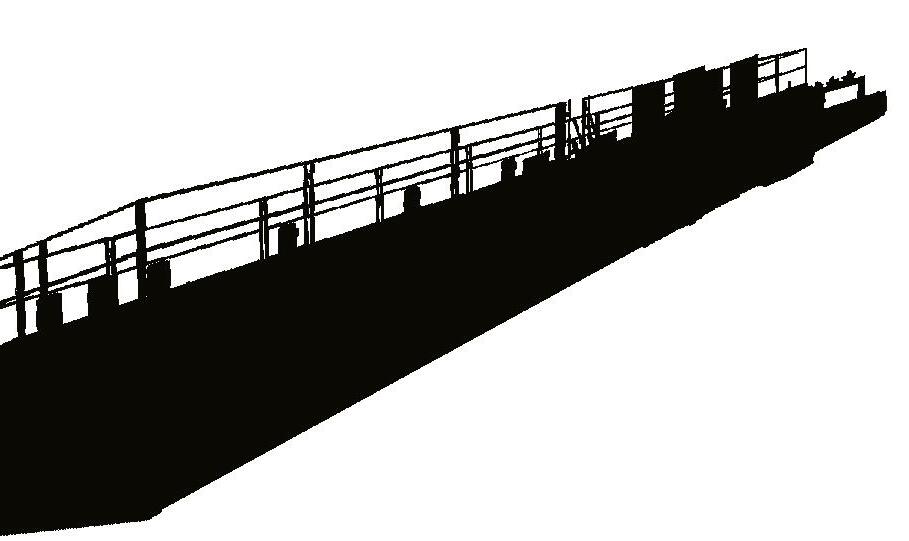
LEHRn°
GLASS MACHINERY
Pochet and Fives announce strategic partnership
France
The Pochet Group, a French luxury packaging specialist in the beauty sector, is joining forces with Fives, a global industrial engineering group, to reduce carbon emissions while producing eco-friendly glass.
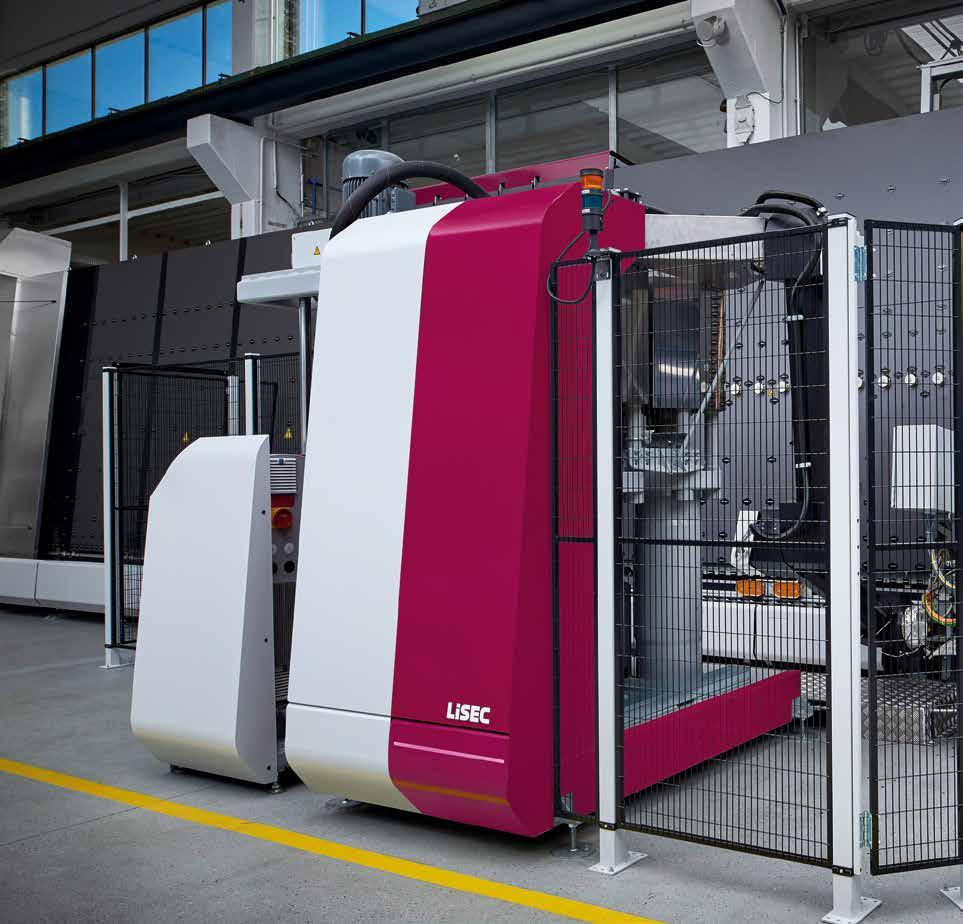
A division of the Pochet Group, Pochet du Courval, which has been shaping and decorating glass for 400 years, has announced a goal to reduce its CO2 emissions by 50% by 2033 through the use of decarbonised glass. A flagship industrial site in Normandy, France, the Guimerville plant produces and decorates more than one million
glass bottles and jars every day for top-end perfume and beauty companies.
The Guimerville plant will be built with an electric furnace manufactured by Fives, a wellknown name in all-electric melting technology. The
furnace, a Prium E-Melt coldtop vertical melter, is one of the most advanced technologies available to significantly reduce CO2 emissions. The melter is designed based on Fives’ significant electric melting operational experience.
Benoit Marszalek, Pochet du Courval’s chief operating officer, said: “The investment, supported by Pochet Group's private shareholders, falls in line with the company's strategy to reduce environmental impact and will require both technological and human transformation. “This electric
furnace will be the very first French furnace dedicated to luxury bottles enabling us to offer carbon-free glass to perfume, skincare and makeup brands that will deliver tomorrow’s beauty,” said Alexandre Brusset, vicepresident of glass at Fives, said: “Fives is committed to providing innovative solutions based on our proven technology to electrify glass process. We help the industry partners to meet their objectives in terms of decarbonisation, as well as to train technicians and operators at the plant level.”
Companies sign agreement establishing Packaging Alliance Europe
Luxembourg
Industrial Packaging Group and Treffpack Beteiligungsgesellschaft announced the signing of an agreement for combining their shareholdings into a new holding called Packaging Alliance Europe SA.
Over the past five years, Gaasch Packaging and Treffpack have gradually increased their cooperation. Using a common growth strategy and joint investments, both companies laid the groundwork for the next logical step, which was recently formalised with the creation of Packaging Alliance Europe. All operational companies will preserve their identity and day-to-day organisation, while benefiting from alliance-wide expertise and guidance.
Peter Börner from Treffpack Beteiligungsgesellschaft said: “Dorothée Kuhnert and I believe in the strength and sustainability of a family enterprise. Representing the fifth and sixth generation in the business we are very pleased to partner up with IPG and the Gaasch and Henckes families in Packaging Alliance Europe.
“Together, we represent a very strong European provider of packaging solutions. We are here to stay and grow together with our customers and manufacturing partners.
Jean-Christophe Gaasch, managing director at Gaasch Packaging said: "This transaction strengthens our joint position in the Western European primary packaging wholesale market.
“After more than five years of close collaboration with Treffpack, Véronique Henckes, Sébastien Hottlet and I are fully convinced that we share the same values of trust, reliability and long-term commitment.
“Our family shareholders and committed staff fully support Packaging Alliance Europe as the sustainable continuation of our history of more than 100 years.”
To date, Packaging Alliance Europe includes member companies operating from offices in Germany, Belgium, Luxembourg, United Kingdom, Denmark, Sweden, the Netherlands and France under the following names: Treffpack, Gaasch Packaging, Pattesons Glass, Nova-Pack, Ursan Verpakkingen, Dijkstra Vereenigde,
Premium Glass, EPG Service.
Altogether, the companies generated a traded turnover exceeding €200 million in 2021. The closing of the transaction is expected to be finalised before the end of the year.
TreffpackBeteiligungsgesellschaft is the private holding company of the families behind CE Gätcke’s Glas Gesellschaft and F. Dau & Sohn with a history going back to 1873. The companies operate from Hamburg under the Treffpack brand.
Industrial Packaging Group SA is the holding company of Gaasch Packaging and its sister companies. In the business since 1906, the group constitutes one of the leading privately held European wholesalers in the primary packaging industry.
Saint-Gobain signs PPA with Spanish energy supplier
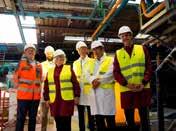
France
Saint-Gobain has signed a Power Purchase Agreement (PPA) with the top energy supplier in Spain, Endesa.
This 11-year agreement will start in 2024 and will cover around 55% of Saint-Gobain’s Spanish electricity needs. The electricity supplied by Endesa will be generated by its renewable portfolio: wind, solar and hydroelectric power.
This agreement will enable a reduction in CO2 emissions of roughly 39,000 tonnes per year.
This is the second renewable energy supply agreement signed by Saint-Gobain in Spain. Together, the two agreements will cover 65% of the Group’s electricity needs in Spain. It is a major step in the Group’s fight against climate change and towards its commitment to reach carbon neutrality in 2050.
Under this agreement, Endesa will supply Saint-Gobain 150 GWh of renewable energy annually, which corresponds to the supply of about 43,000 Spanish homes with
renewable energy every year.
This announcement follows the recent signings by Saint-Gobain of two important renewable electricity supply agreements in Poland and North America, increasing the share of renewable electricity to more than 60% for the entire Group. It comes after the recent endorsement by the Science Based Targets initiative (SBTi) of the Group’s greenhouse gas emission reduction targets as consistent with the organization’s
new Net-Zero Standard and the Paris Climate Agreement. Saint-Gobain designs, manufactures and distributes materials and services for the construction and industrial markets. Its integrated solutions for the renovation of public and private buildings, light construction and the decarbonisation of construction and industry are developed through a continuous innovation process and provide sustainability and performance.
16 asianglass AG 22-6 www.asianglass.com News
High Speed and High Quality
New standards for the production of insulating glass units with thermoplastic spacers

� Most accurate TPA material application
� Permanent support of all center glasses
� 20% higher output due to vertical lift over
www.lisec.com
TPA
Pilkington makes 50 millionth sq ft of glass at St Helens
Pilkington United Kingdom Limited, part of the NSG Group, has manufactured its 50 millionth square metre of specialist glass at its advanced coating line in St Helens, as the site marks 10 years since production began.

The milestone was passed after the manufacturer ramped up production to meet consistently high demand from building designers and the construction sector over the last year.
The volume of glass produced by its OLC1 off-line coater at Cowley Hill in the town is enough to cover 7000 football pitches.
This total includes glass that prevents heat from escaping through windows, such as Pilkington K Glass S, a lowemissivity glass designed to
provide the highest Window Energy Rating (WER) performance and Pilkington Optitherm S1 Plus which is helping building designers meet increasingly tougher regulatory requirements for insulation.
The line also manufactures its Pilkington Suncool range of solar control glass that helps to prevent overheating in buildings by limiting the amount of energy transmitted by the sun through glazing.
The company expects to see higher demand for solar control glass in the UK as building designers mitigate against the increasing frequency of heatwaves, and work to meet new Part O regulations for overheating in new homes.
OLC1 uses advanced glass
coating technology to apply added performance to float glass produced on Pilkington UK’s UK5 production line at Greengate, St Helens. UK5 recently achieved three world first trials of hydrogen and biofuel to fire a glass furnace as part of the industry’s journey towards decarbonisation.
Neil Syder, managing director at Pilkington UK, said: “Demand for advanced coated glass that helps to deliver better energy performance to buildings is growing as building regulations tighten and developers go above and beyond to meet their own environmental targets.
“Advanced coated glass is also solving new challenges thanks to R&D breakthroughs, from antimicrobial glass that helps to
sanitise healthcare and transport settings, to glass with a special UV pattern that helps to protect wildlife by being visible to birds.
“Our OLC1 line at Cowley Hill has played an integral role over the last 10 years supplying glass that helps specifiers in the UK and internationally to give added performance to their projects, from schools in Dudley to skyscrapers in Dubai. It’s set for another busy 10 years as industry demands more performance from glass to meet major challenges like net-zero.”
The milk bottle is UK's most iconic glass packaging
United Kingdom
The everyday glass milk bottle has been voted by leading experts as the most iconic glass packaging in the UK.
Seeing off competition from popular classics such as Heinz Tomato Sauce and Coca Cola, the single pint reusable glass milk bottle won out thanks to its instantly recognisable shape, perfectly suited design and enduring sustainable, made-to-bereused credentials.
As part of the UN International Year of Glass 2022 celebrations, experts from the worlds of packaging, retail, manufacturing
and plastic-free living were brought together to choose the UK’s top 10 glass bottles and jars.
Waqas Qureshi, news editor of Packaging News, said: “It was a thoroughly informative judging session, with the panel assessing contenders for their iconic status, as well as their sustainability and user-friendly credentials. It was fitting that while we all had different suggestions for the final top ten, we were unanimous in choosing the simple glass milk bottle for the undisputed winner”.
Also on the panel was Jenni Richards, federation manager at
British Glass: “I found the process of choosing my top 10 iconic glass bottles and jars difficult as there are so many wonderful contenders.
“Even easily distinguishable classics such as Ribena, Orangina, Marmite and Jack Daniels didn’t make it into our final shortlist. I think the milk bottle absolutely deserves its number one spot. Milk is synonymous with child nutrition and what better to convey such a pure liquid in than in safe, chemically inactive glass.”
Iain Ferguson, an award-winning environmental consultant who was environmental manager at
The Co-Operative supermarket said: “The judging was great fun, and there were so many possible containers that we could have chosen from. Even deciding between the iconic entries on our shortlist was difficult. However, the top two entries virtually chose themselves – the glass milk bottle and the Moët and Chandon Champagne bottle. While they are at different ends of the price scale, they are both associated with important events – breakfast and celebrations. I'm looking forward to seeing whether the general public agree with us."
Corning introduces Corning Gorilla Glass Victus 2
United States
Corning Incorporated unveiled its newest glass innovation, Corning Gorilla Glass Victus 2. A new glass composition allows Gorilla Glass Victus 2 to provide improved drop resistance on rough surfaces, including concrete, the most abundantly engineered material in the world. However, the scratch resistance of Gorilla Glass Victus remains the same.
David Velasquez, vice president and general manager, Gorilla Glass, said: “Smartphones are the centre of our digital lives, and the requirement for exceptional scratch and drop resistance has only increased with our growing reliance on clear, damage-free
displays. Surfaces matter, and rough surfaces like concrete are everywhere.”
Corning’s extensive research has shown that 84% of consumers across three of the largest smartphone markets – China, India, and the US – cite durability as the number one purchasing consideration behind brand itself.
“We challenged our scientists not only to create a glass composition that was durable enough to better survive drops from waist height onto rougher surfaces than asphalt, but to improve cover-glass performance for larger and heavier devices,” said Velasquez.
“With more sophisticated and varied designs, today’s smartphones are nearly 15% heavier, and screen sizes are up to 10% larger, than they were four years ago – increasing both the stress on the cover glass and the probability of damage. Gorilla Glass Victus 2 redefines tough for consumers and OEMs.”
In lab tests, Gorilla Glass Victus 2 survived drops of up to one metre on a surface replicating concrete. Competitive aluminosilicate glasses from other manufacturers typically failed when dropped from half a meter or less. In addition, Gorilla Glass Victus 2 continued to survive drops up to two meters on
a surface replicating asphalt and maintained scratch resistance up to four times better than competitive aluminosilicate.
Gorilla Glass Victus 2 is currently being evaluated by multiple customers and is expected to reach the market within the next few months. It has been designed into more than 8 billion devices by more than 45 major brands.
Corning Incorporated is an American multinational technology company that specialises in specialty glass, ceramics, and related materials and technologies including advanced optics, primarily for industrial and scientific applications.
18 asianglass AG 22-6 www.asianglass.com News
United Kingdom
Biesse is listed among the Best Managed Companies








The first award marks Biesse's fifth consecutive win - placing it in the Gold category - of the ‘Best Managed Companies’ award, the prize instituted by Deloitte Private with the participation of ALTIS Università Cattolica del Sacro Cuore, ELITE-Gruppo Euronextthe ecosystem that helps small and medium-sized businesses to grow and access private and public capital markets - and Confindustria Piccola Industria.
“These shining examples of Italian entrepreneurship were assessed according to the parameters of strategy, skill and innovation, commitment and corporate culture, governance and performance measurement, sustainability, supply chain and internationalisation, and were officially presented with their awards at Palazzo Mezzanotte, the headquarters of Borsa Italiana-Euronext, on 4 October”.
“We are delighted to receive this important recognition, which once again confirms the value of our work. This award falls within a highly positive period for our group, as the latest financial documents show - although we know, now more than ever, that it is essential to remain cautious with regard to the immediate future, in light of the many unknowns that the international scenario represents. In order to compete in a market that is increasingly changeable, we have launched a deep-rooted process of renewal of the group
over the last two years, with a view to rendering it leaner and more efficient, simplifying its processes, and ensuring that it can adapt rapidly as new contexts arise”, emphasised Pierre La Tour, CFO of Biesse Group, at the award ceremony.

Biesse also received the "Italy's Best Employer" award, following the company's inclusion in the rankings drawn up on the basis of the survey conducted by expert analysts from Statista in collaboration with Corriere della Sera, which lists the companies with the highest level
of satisfaction among employees in Italy. Biesse comes in third place in this ranking (with a score of 7.97) with regard to the engineering and systems design sector. “It's not just about smart working: employees are looking for values, well-being and training”this is what has emerged from the analysis conducted on the Italian companies in the study.
The eventual solution is hybrid fur naces operating at up to 80% electricity BUT small steps increase electric boost to reduce the CO2 then superboost. GS and FIC are THE companies to supply CFD modelling of your flexible future fur naces.
19 www.asianglass.com AG 22-6 asianglass News
Italy GLASS SERVICE Tying Technology Together
FIC ...the pathway to a cleaner future www.fic-uk.com +44 (0) 1736 366 962 The World,s Number One in Fur nace Technology FIC (UK) Limited Long Rock Industrial Estate, Penzance, Cornwall TR20 8HX, United Kingdom Are you looking to the future for CO2 reduction? Then look no further than FIC... FIC GREEN ad 2022_Layout 1 03/12/2022 08:38 Page 3 Asian Glass: mobiles, ipads & androids
People and Places Appointment
Corinna Lovati has been appointed sole director of Lovati SRL to pursue a global renewal focused on modernisation and innovation.

“I am very happy and proud of this new role. The goal is to continue to be recognized as a leading company of Italian excellence in the world of manufacturing machines for flat glass processing.”
Lovati’s, important technical figure, Rolando Locatelli, in addition to providing attentive and timely assistance to customers, continues to follow the software and electronic design part, and is also responsible for machines production.
“The company is experiencing a good time of global renewal. I will go on to be a reference between customer and company and follow step by step all the production dynamics. My focus
Jim Nixon has been appointed as Quanex's first vice president of innovation and new markets.
In this role, Nixon will develop and lead an enterprise-level innovation strategy, advance new product and market possibilities, drive revenue and EBITDA growth and ensure a return on investment for new market product launches. He will also lead strategy development, sales, new product development and market growth for Quanex Custom Mixing (formerly LMI Custom Mixing).
George Wilson, president and CEO, Quanex, said: “We couldn’t be happier to welcome Jim to this senior leadership role as we continue exploring new ways to drive value for our customers and shareholders.
“Jim will be instrumental in our efforts to develop innovative new polymer solutions, expand our capabilities and diversify into new markets.”
Nixon joins Quanex with more than two decades of industry experience, serving in various operational and leadership roles of increasing responsibility. Most of his career has been focused on successfully growing LMI Custom Mixing, which Quanex acquired in 2022, where he served
is also on the development of software and electronic components for which we are planning important innovations for the future.”
Lovati is a manufacturer of glass processing machines.
We are specialised in the design and construction of machines for the processing of shaped glass, from simple manual grinders to the most sophisticated numerical control machining centres. Over 80 years of tradition and continuous innovation.
Lars Wismer (49) has been appointed to lead glasstec, the world's leading trade fair in the glass industry, as well as A+A, the International Trade Fair for Safety, Security and Health at Work, effective December 1, 2022.


In addition to overseeing these leading trade fairs, he will also be responsible for the international Glass Technologies portfolio, including glasspex and glasspro trade fairs for the Indian market, as well as the international Occupational Safety & Health portfolio, including TOS+H, CIOSH and OS+HA.
Wismer said: “I look forward to being back onboard at Messe Düsseldorf again and to working with a strong team to further expand the leading position of the two leading trade fairs and the international portfolios."
The event professional has been working as a senior project manager for 16 years. He also has extensive experience in the management and marketing of large, international events. His most recent position was as Executive Director Sports of D.SPORTS Events, Sales, PR/
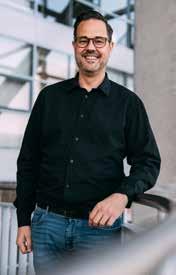
Communication and Marketing at D.LIVE GmbH & Co. KG.
Petra Cullmann, executive director at Messe Düsseldorf, said: “I am delighted that we have been able to win back Lars Wismer for Messe Düsseldorf. He has many years of expertise in managing international events in Germany and abroad,”
The next glasstec will be held at the Düsseldorf Exhibition Centre in Germany from 22 to 25 October 2024.
as the general manager for the last 21 years.
Nixon said: “I’m looking forward to helping this team identify new opportunities to innovate, in both new and legacy markets.
“I’m confident that through the combined abilities of Quanex’s polymer and extrusion expertise, and the state-of-the-art technology at Quanex Custom Mixing, we’re going to do some great things and create significant new growth for Quanex.”
Nixon holds a bachelor’s degree in chemical engineering with a minor in economics from Case Western Reserve University, and a master’s degree in business administration from Ashland University.
In his new role, Nixon will report directly to Wilson and will serve as a member of Quanex’s strategy council. He will share his time between Cambridge, Ohio, and Akron, Ohio.
Wolfgang Böhm has assumed the position of Technical Director at Zschimmer & Schwarz KG Chemische Fabriken effective 1 December 2022. This position entails responsibility for the areas of production and technology, logistics, purchasing, environmental protection, and occupational safety at the Lahnstein site. During his career, he has held various management positions in the fields of production and technology at Hoechst, Clariant and Allessa.
"I am looking forward to my new assignment, which will involve further developing the Lahnstein site and setting new trends with my know-how and experience," said Böhm. "Together with my colleagues in management and our employees, I would like to share the success story of
Zschimmer & Schwarz."
"With Wolfgang Böhm, we are strengthening the management at the Lahnstein site with an experienced expert who will provide new impetus in his area of responsibility and thus further advance Zschimmer & Schwarz in the implementation of efficient processes," said Felix Grimm, COO of Zschimmer & Schwarz Chemie. "We warmly welcome Wolfgang Böhm and look forward to working together."
20 www.asianglass.com asianglass AG 22-6 News
Corinna Lovati
Jim Nixon
Wolfgang Böhm
Lars Wismer
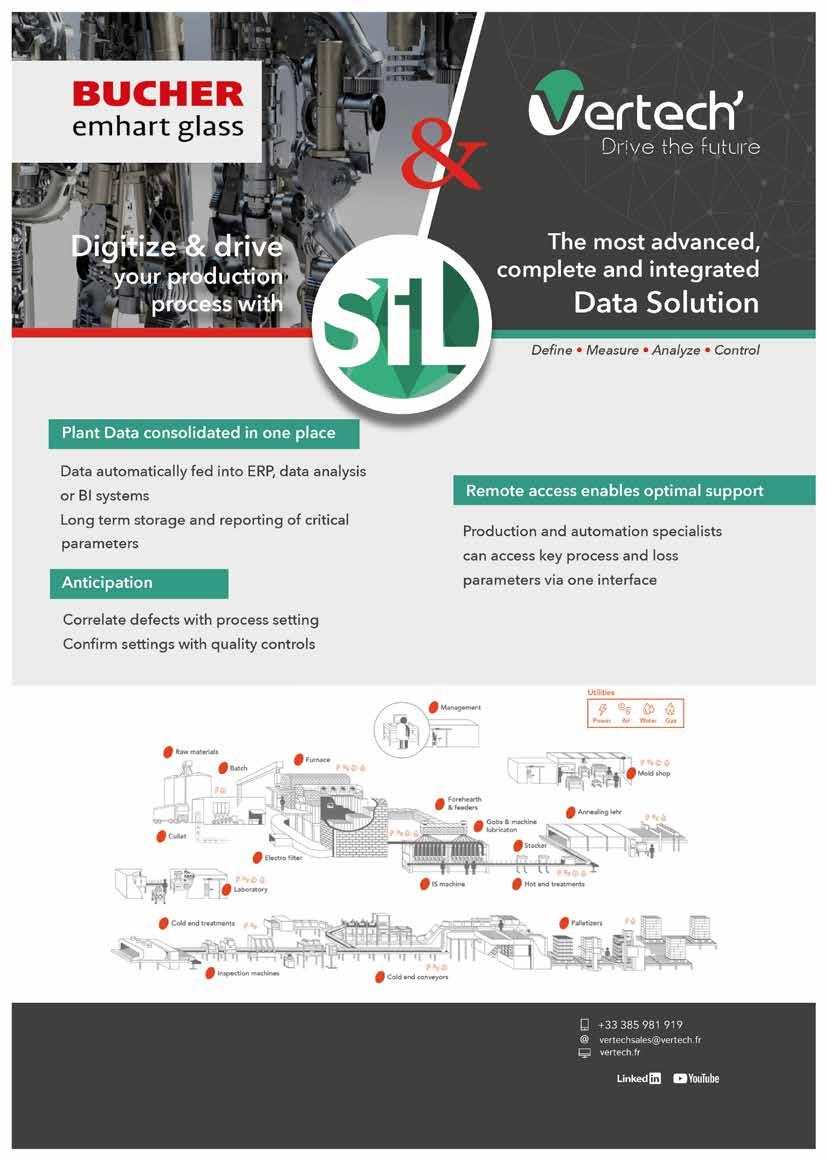
Darko Šlogar
Darko Šlogar has been appointed by Vetropack Group, a European manufacturer of glass packaging, to lead their Croatian operations, starting on 1 January 2023. He succeeds Tihomir Premužak, who passed away unexpectedly in August.
Šlogar has already been acting as interim site manager of Vetropack Straža since Premužak’s passing. The company is also moving into new offices in Zagreb.
Šlogar draws on more than three decades of experience in glass manufacturing. Born in 1963, the father of two studied at the Faculty of Mechanical Engineering and Naval Architecture at the University of Zagreb. Following graduation in 1987, he began his professional career at Straža glass factory, now Vetropack Straža, as an expert in technological advances in production. Among his responsibilities was the establishment of a new mould construction department. He moved from marketing to sales in the early 1990s before being promoted to the position of director of marketing and sales in 2001.
Obituary
During his career, the new general manager became involved in a variety of activities, including teaching computer science and technical drawing as a part-time teacher for the training of glass workers. Additionally, he served as mayor of the Croatian municipality of Hum na Sutli for a period of time. Šlogar said: "I am proud to have worked for this forward-thinking company for such a long time, especially since it is also an important employer for the region. Shaping the future of this growing site is a challenging task that I look forward to.”
"With the new presence in an office building in Zagreb, we are counteracting bottlenecks at the plant in Hum na Sutli. This shows the positive development of the company. In this respect, I look to the future with great optimism," he added.
Awards & Honours
Envelon wins Product Design of the Year
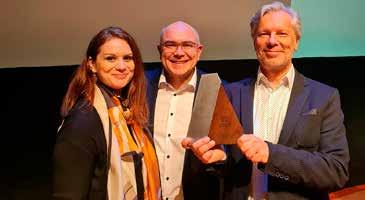
Envelon has been named Product Design of the Year at the Architecture MasterPrize 2022, held at the Guggenheim Museum in Bilbao, Spain, on 24 November. The company's technology enables buildings to integrate photovoltaics to achieve carbon neutrality with alternative renewable energies. In contrast to traditional rooftop solar systems, Envelon uses architectural building façades as the way to integrate aesthetics and performance, as shown by the award-winning designs of architect Peter Kuczia.
A solar façade, developed by Envelon, integrates architectural design with solar energy in a durable and application-flexible glass facade, transforming conventional buildings into sustainable power plants.
High-performance and costeffective BIPV systems are available in a wide variety of
attractive colours and have been successfully installed on large-scale buildings. In order to reduce technical complexity, Envelon has been engineered on a simple, modular basis in order to turn the building's façade 'ON' with electrifying architectural elements.
Kuczia said: “Thanks to the Envelon System, the facade material – in addition to its conventional technical, protective and aesthetic functions – adds value to the building by converting sunlight to electricity."
A key objective of Envelon is to drive the vertical energy revolution. An important part of this effort involves a flexible, 360-degree approach that encompasses not only the production in Hamlar, Germany, but also custom project design for the respective locations and turnkey installation.
Vitro Architectural Glass announced the passing of longtime colleague and friend Joe Sennese on 7 November at the age of 55 after a long battle with cancer.


In a statement, the company said: “Sennese’s legacy of humble service to our customers and architects in the Chicago and Great Lakes region has inspired countless Vitro team members and endeared him to all who knew him.”
Sennese began his career with Vitro, formerly PPG Glass, in 2005 as an architect representative. He quickly advanced his career in the glass business by becoming a national architectural manager before leading the architectural representatives in the Eastern US as Vitro’s director of architectural development. In June 2022, Sennese was appointed manager of product sales and business development.
Glenn Davis, vice president of international sales and sales development at Vitro, said: “Joe was an invaluable part of our team and served as a mentor to so many in the industry
throughout his career,”
“We’re all deeply saddened by his loss and we’re thinking of his family in this difficult time.”
To honour Joe’s legacy, Vitro contributed to the Amyloidosis Foundation in his name.
Asian Glass would like to take this opportunity to offer condolences to Sennese's family and friends.
Consequently, building owners, architects, and planners are able to benefit from holistic project management, professional support, and a reliable collaborative relationship.
Envelon offers frameless façade panels, made of highquality glass elements, to meet
the needs of architects and builders. By providing customised façade kits or turnkey solutions, high quality and reliable handling can be ensured.
A thin internal glass coating releases the potential of colours, creating solar facade panels that are vibrant throughout the day.
22 www.asianglass.com asianglass AG 22-6 News
Joe Sennese
From left: Andrea Steigerwald, head of corporate marketing and communications of the Grenzebach Group, Hans-Peter Merkelin, CEO, Grenzebach Envelon, and Peter Kuczi, architect.
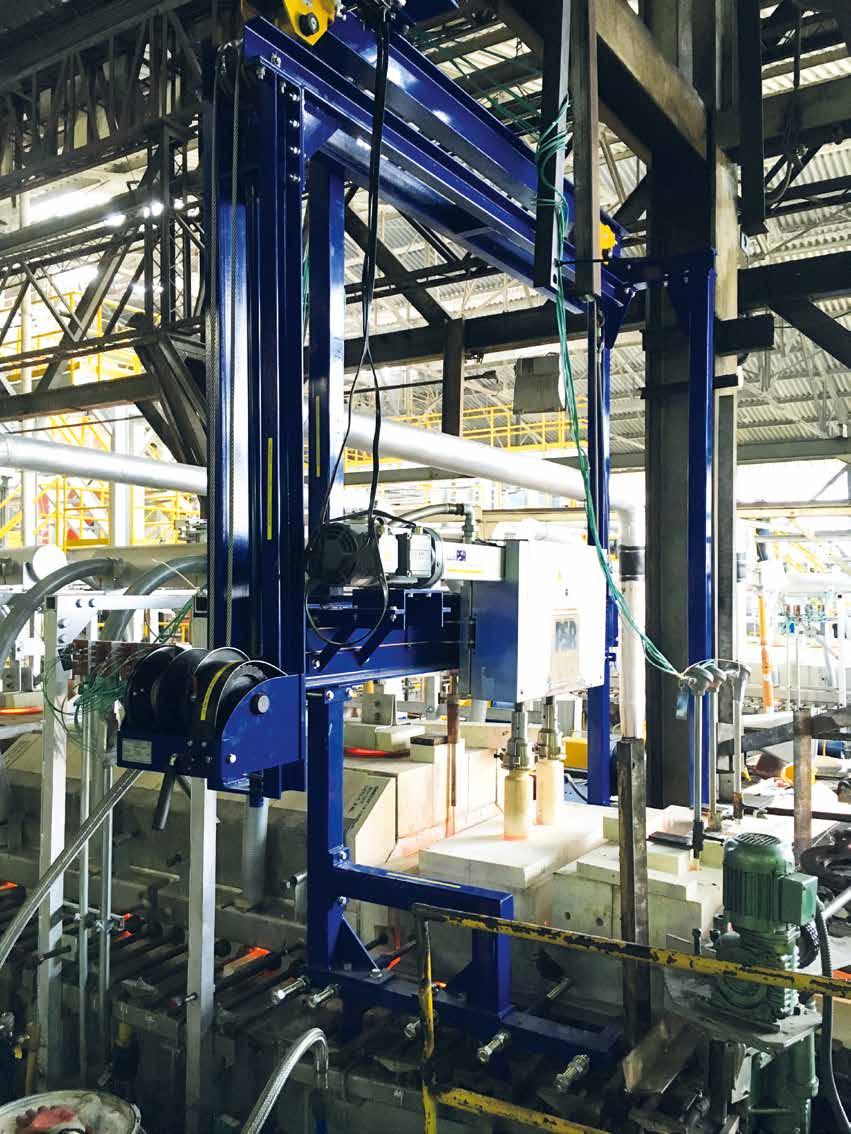
News PSR CORD DISPERSAL SYSTEM Proven and guaranteed. www.parkinson-spencer.co.uk
Phoenix Award names Hua as Glass Person of the Year
The Phoenix Award Committee announced Li Sheng Hua as the 50th recipient of the Phoenix Award and ‘Glass Person of the Year 2022’
Li Shen Hua is the founder of Huaxing Glass in 1978. Under his leadership, Huaxing has grown from a small glass factory into the largest group producing container glass in China with an annual production capacity of more than three million tonnes, or about 16% of the total output in the country. The group has 13 factories across China. Today, Huaxing has 34 glass furnaces and 167 production lines.
Li served as executive chairman of China Daily Glass Association for several years.
Being the China daily glass industry leader, he has won the China Light Industry Meritorious Enterprise Prize for six consecutive years.
The Phoenix Award Committee has also selected Li to receive this year’s prestigious Phoenix Award in recognition of his outstanding achievements in the glass industry and his leadership in pollution reduction in China.
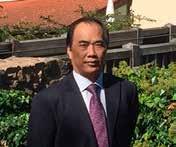
Li was among the first to respond to the call to reduce industrial pollution in China.
In 2007, he introduced a series of actions to transform Huaxing into green and environment friendly production units in response to
Places
the country's promotion of energysaving and emission reduction.
Through his effort, Huaxing Glass was named the ‘Green Label Enterprise’ and received an environmental credit for the achievement. It also set the benchmark of environmental protection in Guangdong Province for advanced energy-saving and safety production enterprises.
He has promoted the principle of quality and set up two national quality inspection centres in Central and Southern China respectively to enhance the quality of the company’s products and effectively promoted the rapid upgrading of product quality in the glass industry. The company is also an active member of the China Quality Inspection Association.
Li will receive his award from Kevin Lievre, the PAC 2022 Chairperson, at the occasion of a future Banquet. The Banquet and Award Ceremony will be conducted in China as soon as travel restrictions permit.
Ireland - The Keep Well Glass Quilt Project
An exhibition of glasswork collaboratively created by 50 glassmakers is now on display at the National Museum of IrelandCountry Life, located in Turlough Park in Castlebar, County Mayo.
Designed by members of the Glass Society of Ireland, the display is entitled 'A Breath of Fresh Air, The Keep Well Glass Quilt Project'.
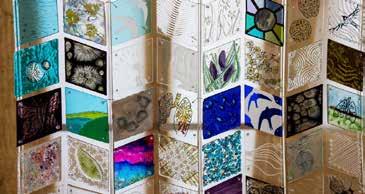
The project was undertaken during the third wave of COVID-19 and the twelve weeks that followed the lockdown.
Confined to within five kilometres of their homes and studios, 50 glassmakers came together virtually to collaborate on a large glass quilt.
Professional and amateur glassmakers are represented in the artwork, as well as all
techniques of glassmaking, from traditional cutting, glass painting, kiln working, etching, engraving and lampworking.
In making their individual pieces, each glassmaker interpreted their own ideas around what the theme meant to them. Themes include, nature, poetry, textiles, patterns, mental health, capturing actual air, and emotional responses.
As each piece was added to the artwork, a unique story of a unique time evolved. Testimonies emerged from participants on how this project was critical to their creative process and well-being at a very difficult time.
Each of the four provinces of Ireland is represented, bringing the whole island together in one
Encirc named ‘BITC NI Responsible Business of the Year’
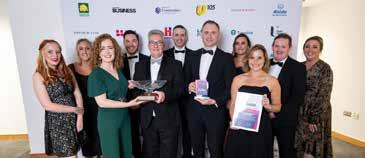
Glass container manufacturer and filler, Encirc, has been awarded the ‘NI Responsible Company of the Year’ accolade at the BITC NI Responsible Business Awards, marking the first time Encirc has won the award.
The company, initially created in 1998 in Derrylin Northern Ireland, has been a pillar of the community in County Fermanagh, NI, since its inception. Now part of the Vidrala Group, Encirc has three sites in England, Northern Ireland and Italy and is a well-known name in the production of sustainable packaging, creating more than four billion glass containers a year while continuing to innovate and drive forward the manufacturing sector to be more sustainable and inclusive.
In 2022, Encirc and its parent company Vidrala became one of the first organisations of its kind to have its Science Based Targets approved by the SBTi (Science Based Targets Initiative), ensuring the company operates in a way which helps prevent the planet’s temperature from rising more than 1.5°C compared to pre-industrial levels.
At the same time, the company announced its ambition to be the first glassmaker to create net-zero glass containers. From its original site in Derrylin, Northern Ireland, Encirc will be supporting its parent company in reducing its Scope 1 and 2 greenhouse gas emissions by 47%, and its Scope 3 emissions by 28% by 2030, helping prevent the worst effects of climate change whilst also future-proofing the company.
Encirc is also active as a BITC climate champion, and member of its Environmental Leadership Team. The glass bottle manufacturer supports BITC with speaking slots aimed at the wider industry, outlining how it is acting on the climate emergency, and inspiring others to drive change in their organisations.
It also works heavily within its local communities through its HOCAM (Helping our Communities Achieve More) programme, partnering with schools and colleges to raise awareness of diversity issues, sustainability considerations and career opportunities.
collaborative piece. Some of Ireland’s best glassmakers are represented in The Glass Quilt, making this artwork a unique and historic portfolio of Irish artists and their generosity of community spirit
during a difficult time.
The project was made possible by the support of the Health Service Executive ‘Keep well’ campaign and Design and Crafts Council Ireland.
24 www.asianglass.com asianglass AG 22-6 News
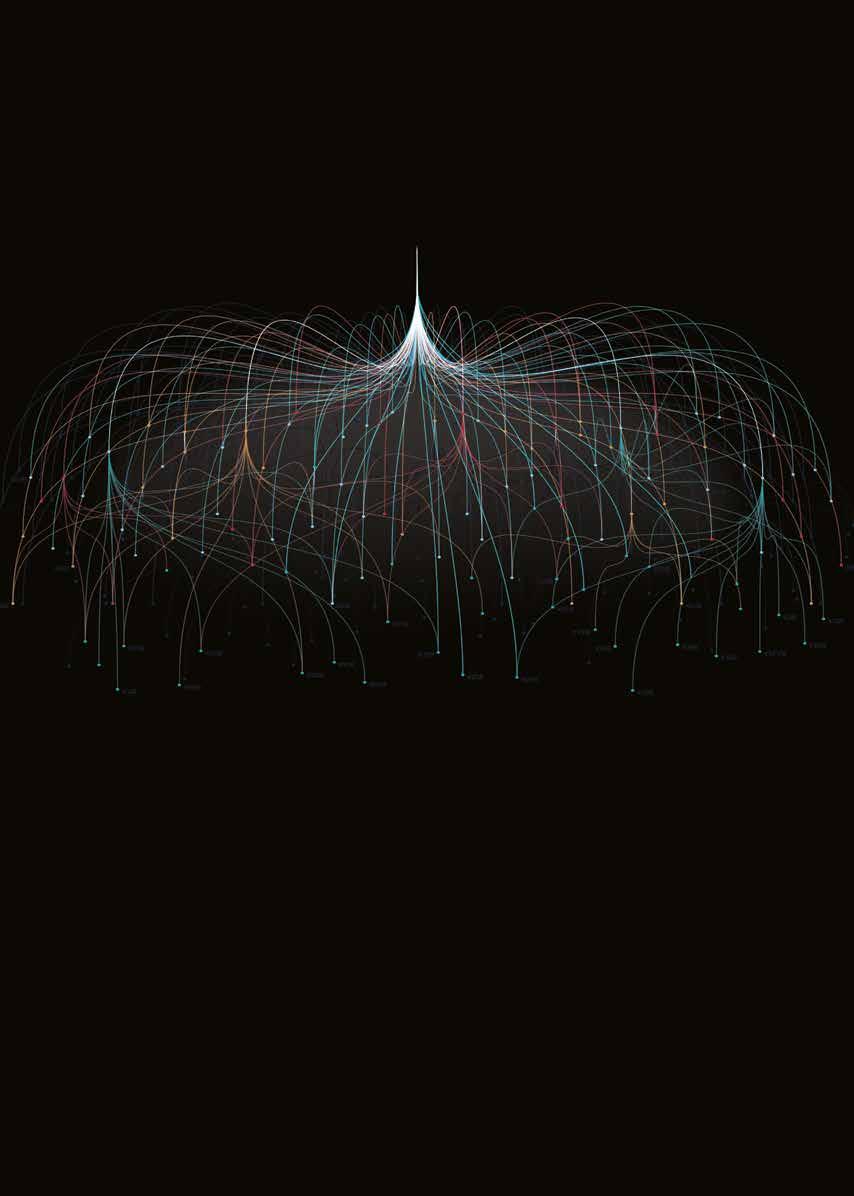
under control – all the time Data – the deciding factor Visit youniverse.tiama.com to arrange a demonstration It‘s having ALL the right data, at the right time, at the right places. YOUniverse gives you more process control and helps you to foresee problems early and to take the right decisions quickly, With open-protocol software solutions, linking hot and cold end sensors to your production machinery, you make the most of the data in your plant, you improve glass quality, you reduce wastage and increase productivity. Make your life easier - with YOUniverse.
Almatis expands its tabular alumina plant in India
Almatis, a group company of OYAK, celebrated the official opening of its fully integrated tabular alumina facility in Falta, India.
The opening ceremony, attended by members of the local government and trade organisations, as well as many customers, marks another milestone in the history of Almatis.
This investment is the first of its kind in India, adding a completely new sintered tabular processing plant to the existing sizing facility. Almatis India operations is now fully independent in their sourcing and supply chain requirements for the Indian market.
Almatis CEO Anιl Sonmez stated in his welcome speech, said: “Almatis is proud to have established the first integrated
tabular operation in India and is committed to being a reliable supplier and partner to our customers. This is a significant milestone showing Almatis commitment to being a reliable supplier and partner to our customers and also for tabular alumina supply to the Indian market.”
Many experts from other Almatis plants around the world brought in their long experience and deep knowledge to now produce in India the accustomed reliable quality.
The history of Almatis business activities in India goes back to 1995 when a joint venture was founded by Alcoa and Associated Cement Companies Limited India (ACC). In 2007 Almatis purchased
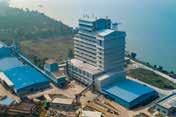
the remaining stake in the JV to form a 100%-owned subsidiary.
With sales offices in Kolkata and Singapore, technical support from a local R&D lab in Kolkata, and support from the Almatis global network, Almatis India operations is well positioned to meet the increased demand of the refractory and steel markets for the upcoming years.
Almatis, which is part of the OYAK Group of Companies, processes aluminum oxide (alumina) and produces and sells special alumina. It has been developing, manufacturing and supplying specialty alumina and alumina-based products for more than 100 years. Alumina is a key input for many industries including
refractory, ceramics, and glass. The company has nine production centres, six sales offices, and six application-product development laboratories located throughout the world. Besides its headquarters in the Netherlands, the Group has factories in the United States, Germany, the Netherlands, Japan, China and India, and sales offices in the US, Germany, India, Japan and China.
Ardagh Glass Packaging – Africa additional capacity investment
Ardagh Glass Packaging – Africa
(AGP – Africa) announced a further extension of its Nigel production facility in Gauteng, South Africa.
This investment in a third furnace (N3) follows the recently commissioned Nigel 2 (N2) expansion and will further increase the facility’s capacity to provide sustainable glass packaging to support customers’ current and projected demand growth over the
next few years.
N3 will be a replica of the N2 expansion completed earlier this year and will similarly incorporate a new furnace and additional production lines. It will also provide significant energy, water efficiency and environmental benefits, representing another important step in AGP – Africa’s journey to decarbonise the glass production process and reduce emissions.
This capital investment will further bolster government’s economic recovery plans in Ekurhuleni, Gauteng, offering additional job opportunities and increased ancillary supply-chain benefits in the community.
The investment, which is backed by long-term customer contracts, is in line with Ardagh’s commitment at the time of acquisition to invest in the
growth of the South African glass industry. Leveraging Ardagh Group’s technical capabilities and global sourcing, the expansion is expected to be commissioned in late 2023, well ahead of current standard lead times.
Following completion, the Nigel production facility will be the largest glass container production facility in the AGP - Africa network, and in the African continent.
Sibelco and Diatreme invest in joint venture
Sibelco has completed a 11 million Australian dollar (€7 million) first tranche investment in a newly incorporated joint venture company, Cape Silica Holdings Pty Ltd (CSHPL), for 9.99% stake.
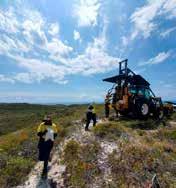
As announced in June, Sibelco committed to invest AUD 49 million (€32 million) in Diatreme Resources Limited, an emerging Australian producer of mineral and silica sands based in Brisbane, Australia.
A second tranche investment of AUD 24 million (€15.5 million) is expected within 12 months, as part of the strategic joint venture,
after which Sibelco will hold a 26.8% stake in CSHPL.
The investment will advance the development of Diatreme’s emerging Galalar Silica Sand Project (GSSP) and Northern Silica Project (NSP), amid surging demand for high purity silica from the fast-growing solar energy industry.
The strategic partnership between Sibelco and Diatreme also included an AUD 13.97 million Australian (€9 million) corporate strategic placement, which has made Sibelco a significant shareholder in Diatreme with a 15% equity
stake. The long-term joint venture also includes plans for joint product marketing, pursuit of onshore silica processing downstream opportunities and assistance in accessing project finance, benefitting from Sibelco’s established global networks.
“We are delighted to partner with Diatreme on both a corporate and strategic level. This partnership supports Sibelco’s vision and ambition to be the global leader in silica sand, extending access to silica sand reserves across the globe. We look forward to creating
long-term success together,” said Ian Sedgman, Sibelco’s chief strategy and business development officer
News 26 asianglass AG 22-6
www.asianglass.com
Batch
India
South Africa
Australia/Belgium

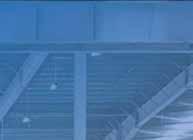
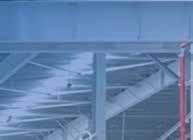
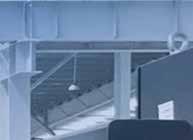

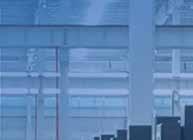
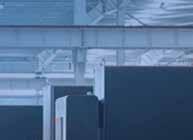
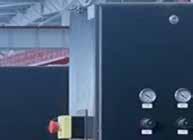
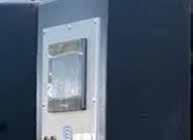
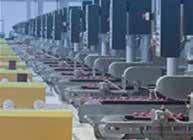
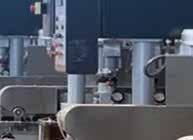
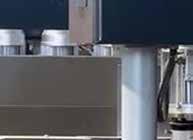
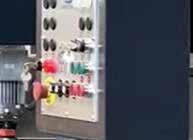

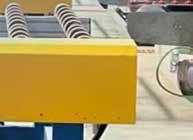
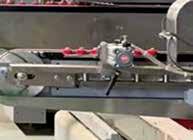
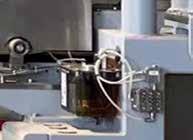


Quanex buys LMI, baroadens polymer solutions
United States
Quanex announced the acquisition of LMI Custom Mixing (LMI), an advanced polymer solutions provider with a focus on advanced methods for mixing rubber compounds for the most demanding applications.
The acquisition will complement and expand Quanex’s polymer solutions expertise, enabling the Company to diversify into key new markets, enhance polymer solutions for its existing businesses and deliver an enhanced experience to LMI customers throughout North America.
Located in Cambridge, Ohio, LMI operates a state-of-the-art custom polymer mixing facility, featuring an advanced computer controlled facility capable of producing consistent, quality custom mixed
rubber compounds. LMI will now be known as Quanex Custom Mixing with LMI team members transitioning employment to Quanex.
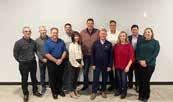
Bob Daniels, president, Quanex North American Fenestration, said: “LMI has been one of our important vendor partners for a long time, and we’re excited to welcome them to the Quanex family.
“We are confident their expertise will help us solidify and enhance our portfolio of solutions in the areas where we do business today, and as we seek to diversify, the LMI team will be essential in allowing us to develop innovative new compounds and meet our growth goals.”
LMI was identified not just for the complementary technology it will
bring to Quanex, but for its shared culture, values and commitment to its customers.
Daniels said: “Culturally, we couldn’t be more similar, and we believe bringing both companies together is a great fit.
“LMI has long empowered its people to do the best work possible for their customers, and that’s something we’re committed to continuing. What they bring to the table will help augment everything we do, bringing a new breadth of compounds that we can use to enhance what we offer to our customers.”
Jim Nixon, general manager for LMI, said: “Quanex has a tremendous reputation around quality and innovation, and we’re excited to join forces with a partner
Vetropack builds new plant in Italy
Italy
European glass manufacturer,
The Vetropack Group, is investing over CHF 400 million in a new facility designed to serve the traditionally important Italian market. It is anticipated that production will begin in Boffalora sopra Ticino near Milan in the second quarter of 2023. In addition to increased capacity and a focus on sustainable processes, the new high-tech site provides increased flexibility in production.
The Italian subsidiary Vetropack Italia S.r.l. has been a member of the Vetropack Group since 2015. However, it has been manufacturing glass since 1960. Due to the fact that the previous plant in Trezzano
sul Naviglio was unable to meet Vetropack's ambitious quality and sustainability goals in the long term, the Group decided to build a new factory in Boffalora sopra Ticino, approximately 25 kilometres away.
"The Italian market is of great importance to us and, with its many global brands, plays a central role in our strategy," explains Johann Reiter, CEO of Vetropack Holding.
The new, state-of-the-art production plant is being built on the site of the former Reno di Medici paper mill and covers an area of 347,000 m2, of which 170,000 m2 will be utilised for actual production. As in the
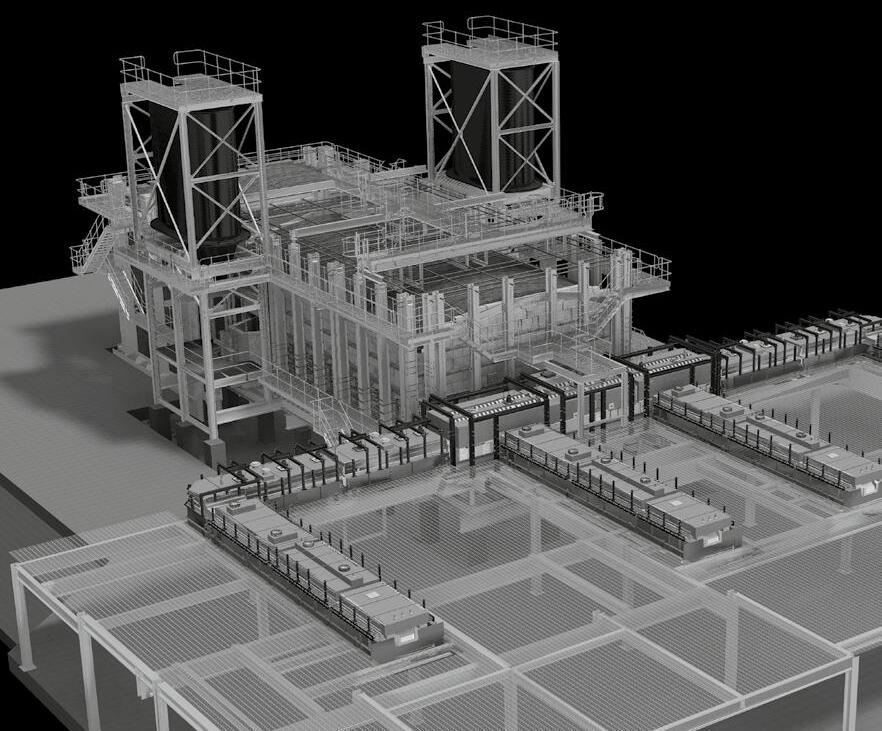
previous plant, two furnaces will be put into operation at the beginning of operations. However, the manufacturer expects to increase production capacity by approximately 70% as compared to the previous site. Vetropack anticipates a positive market development in Italy and beyond in the medium term, which is why the infrastructure is designed to maximise capacity. There has been an offer for all 301 employees of the previous site to transfer. Even though production volume per employee has increased significantly, the workforce is expected to continue to grow. Employees, both new and existing,
ProFrac Holding to acquire Eagle Ford Sand Mine
United States
ProFrac Holding announced that it has entered into a definitive agreement to acquire the Eagle Ford sand mining operations of Monarch Silica. The transaction is expected to close by the end of 2022.
Matt Wilks, ProFrac's Executive Chairman, said: "We are pleased to add the Monarch mine to the growing portfolio of in-basin sand mines we operate through
Alpine Silica.
“This transaction further demonstrates ProFrac's commitment to its vertical integration strategy, providing the company with access to highquality, local proppant in the Eagle Ford, where we currently operate eight active fleets.
With Monarch's production capacity expected to expand to nearly four million tonnes per year
by Q1 2023, ProFrac will be well positioned to bundle internally sourced proppant across our active fleets in the region."
With a strategically located mine in the Eagle Ford basin, Monarch’s acreage consists of 70+ million tonnes of third party proven reserves. The reserve consists of high quality 40/70 and 100 mesh proppants utilised in hydraulic fracturing.
that is committed to our growth and creating new opportunities for our people to do great work.
As a part of Quanex, we will strengthen our dedication to the custom mix market, while offering new capabilities and opportunities for our customer base to grow as we expand our portfolio of products. Our team is looking forward to working with a company that shares our culture and is strategically aligned with how we do business.”
have already been trained on the new production equipment since 2020.
Vetropack is investing in high-performance and smart technologies that facilitate more flexible, customised, and resourceefficient operations in Boffalora. "Thanks to modern equipment and processes, we can produce more flexibly and better meet the increasing demand for high-quality packaging, even in smaller volumes – so-called semi-specials," says Christoph Burgermeister, project manager at Vetropack. At the same time, the site is geared towards significantly more sustainable production.
ProFrac Holding is a growthoriented, vertically integrated and innovation-driven energy services company providing hydraulic fracturing, completion services and other complementary products and services to leading upstream oil and gas companies engaged in the exploration and production (E&P) of North American unconventional oil and natural gas resources. Founded in 2016, the company was built to be the go-to service provider for E&P companies' most demanding hydraulic fracturing needs.
News 28 www.asianglass.com asianglass AG 22-6
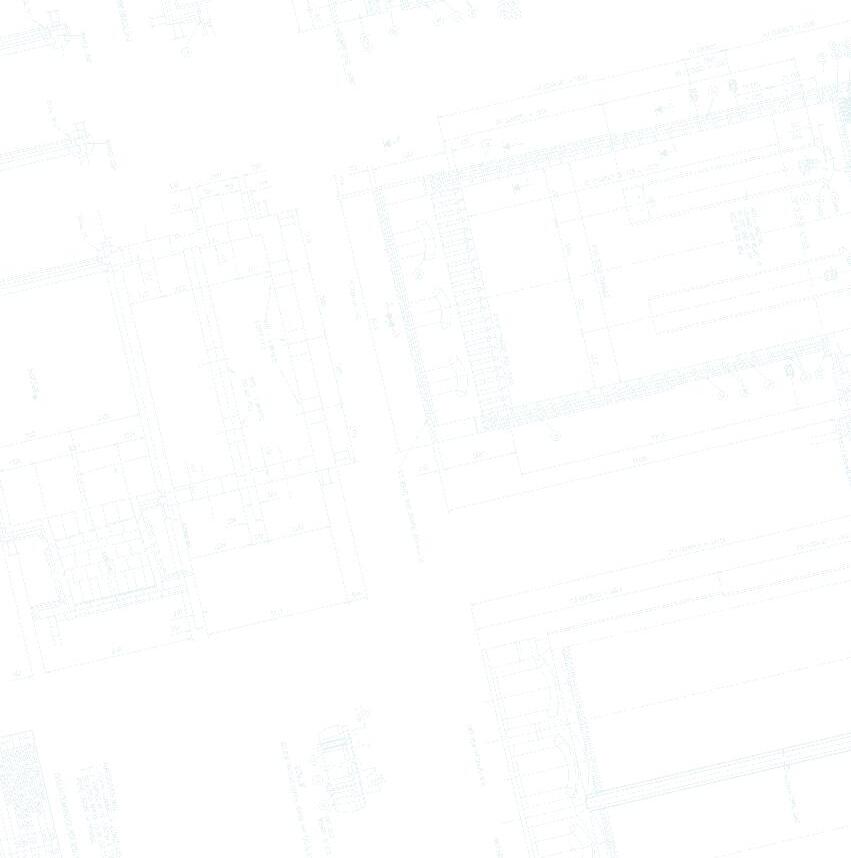
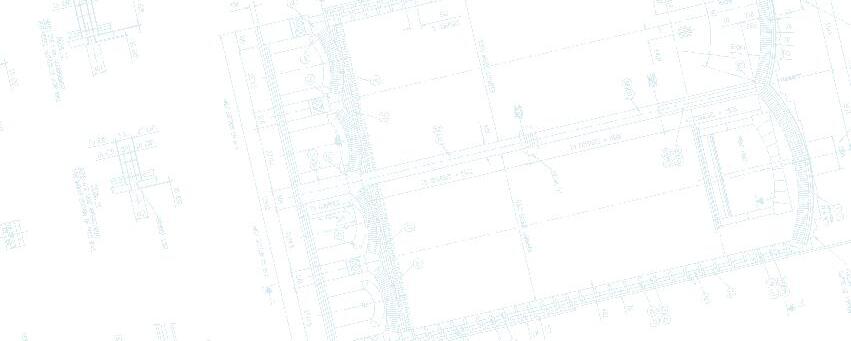

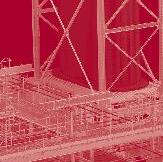
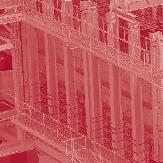
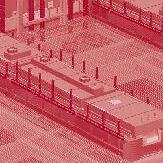


WE ARE USING ALL OUR ENERGY DESIGNING YOUR FURNACE, SO YOU DON'T WASTE YOURS! INNOVATION AS STANDARD ® TOLEDO ENGINEERING / TECOGLAS / ZEDTEC / KTG ENGINEERING / KTG SYSTEMS / EAE TECH www.teco.com
Encirc buys 'The Park' facility from Accolade Wines
United Kingdom
Encirc, a Vidrala Company, has entered into a deal with Accolade Wines, one of the world’s leading premium wine producers, to purchase the assets of ‘The Park’ bottling and warehousing facility in Bristol, UK.
The agreement will see Accolade Wines entering a 10-year contract bottling and distribution agreement with Encirc to ensure ongoing support for its flagship beverage brands. The move will utilise rail distribution between sites and supply into retail, enabling Encirc to provide an ultra-efficient, sustainable supply chain service across the UK b everage market.
The Park is a highly advanced, sustainable and award-winning
manufacturing facility, capable of producing the equivalent of more than 30 million, nine-litre cases of wine a year. Following investments by Accolade Wines, the facility is currently zero waste and carbon neutral, with the installation of wind turbines in 2019 contributing to the use of 100% renewable electricity.
Encirc operates from its three purpose-built sites in Derrylin, Co Fermanagh, Elton, Cheshire and Corsico, Italy. It produces around four billion glass bottles and other containers annually and can fill more than 200 million litres of bulk shipped beverages every year. Encirc is already unique in the market due to its 360 service, a complete supply chain offering
for glass, filling, storage and distribution that helps reduce the carbon footprint of every glass bottle it makes and fills.
The 360 service allows Encirc to fill, store and distribute bottles from one location in Elton Cheshire, significantly reducing the number of lorry journeys needed to get a product onto supermarket shelves.
Encirc managing director, Adrian Curry, said: “This deal shows how collaboration and innovation between organisations who put sustainability and planet-first operations first can lead to the realisation of a shared vision. This deal will allow us to service the UK glass beverage market with an offering that is unrivalled globally in terms of service and sustainability.
We are excited to welcome our new colleagues from The Park into the Encirc family.”
Under the terms of the agreement, Encirc will acquire The Park facility and all associated plant and equipment. As part of the transaction, approximately 400 employees engaged in manufacturing at The Park will transfer to Encirc on their existing terms of employment. The Accolade Wines team members not involved in manufacturing will continue to drive Accolade Wine’s European business, and work with Encirc to ensure a smooth transition to the new model with no disruption to customers. The transaction is scheduled to close in January 2023.
CR Minerals and Rio Tinto collaborate on pozzolans
United States
CR Minerals announced that it has reached an agreement with Rio Tinto, on the production of pozzolans from waste materials at the US Borax facility in Boron, California.
The company intends to use waste tailings present onsite to produce pozzolans that can be used as a cement replacement in concrete. The pozzolans will be manufactured at a new facility to be constructed by CR Minerals on Rio Tinto's property as part of this agreement.
Rio Tinto has had operations
in Boron for nearly a century, mining and manufacturing products used in fertilisers, but it is also in other industries such as glass manufacturing, wood protection and insulation fiberglass.
President of CR Minerals, Jeffrey Whidden, said: "We have been working with Rio Tinto for several years now to bring this concept to life.
“Taking what was once considered waste streams and turning them into usable products for the construction materials
industry is part of the vision of our company.
“Manufacturing a low carbon alternative to cement will be an exciting venture in the State of California that prides itself on being at the forefront of effecting positive environmental change."
Renny Dillinger, Rio Tinto's general manager for US Borax, said: "Rio Tinto continues to demonstrate its leadership in the mining industry through this agreement.
"Our commitment to the environment and leaving a lasting,
positive legacy is fundamental to our sustainability goals. Finding new uses for our waste streams and by-products such as this is a key component to our goal of decarbonisation and also to achieving a circular economy."
CR Minerals is a global producer of pumice products and pozzolanic materials (natural pozzolans and patented, remediated fly ashes) for the construction and oil and gas industries. It has operations in various states in the Western USA and is based in Southlake, Texas.
Solvay to expand capacity at soda ash plant
United States
Solvay announced plans to resume the construction of its 600 kT soda ash capacity expansion in Green River, Wyoming. Production is expected to start at the end of 2024 in time to meet customers’ growing needs for a secure and cost competitive source of supply.
In addition, a project to deploy a new breakthrough technology to reduce emissions originating from Trona mining operations will be implemented, leading to a 20% reduction of the site’s greenhouse gas emissions, consistent with Solvay’s commitment to decarbonise its operations in line with Solvay One
Planet’s sustainability roadmap. This innovation will make Solvay the first company to implement regenerative thermal oxidation technology to abate emissions in a trona mine.
Ilham Kadri, CEO, Solvay said: “These investments reinforce Solvay’s leadership position as a long-term, sustainable global supplier to our customers. I am also particularly proud of the role that our innovation is playing to cut greenhouse gas emissions at our Green River facility in the US, where CO2 emissions currently have no cost, contrary to Europe.
“This attractive investment
expands our supply of tronabased soda ash and will position the business for superior and responsible growth into the future.”
The investments total around $200 million and complement the previous investment that secured sole ownership of the natural soda ash operation. The facility, operated solely by Solvay since May 2022, produces soda ash and sodium bicarbonate from trona, a naturally occurring mineral to serve markets such as flat glass for building insulation, container glass, detergents as well as fast growing markets including solar panels and lithium carbonate for
electric vehicles.
Solvay Soda Ash & Derivatives is a global business unit of Solvay. It provides a global, secured and sustainable supply of soda ash to its customers manufacturing glass for building, automotive, solar panels and packaging applications, as well as detergents and chemicals. It also develops solutions based on sodium bicarbonate for the health care, food, animal feed and flue gas cleaning markets. Solvay Soda Ash & Derivatives has 11 industrial sites worldwide, more than 3,200 employees and serves 120 countries.
News 30 www.asianglass.com asianglass AG 22-6
Cutting fluids
The perfect complement for optimum glass cutting
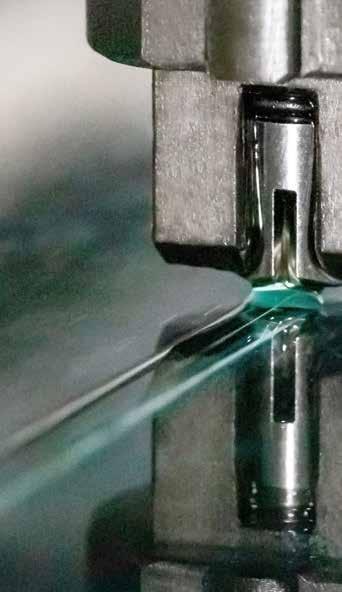

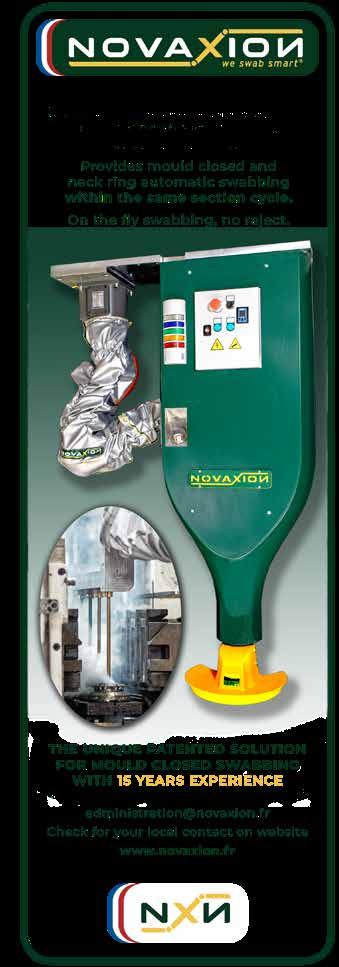
AG 22-6 asianglass
www.bohle.com Silberschnitt®
Experts in the mining industry believe that lives might be at risk if the industry fails to address cyber security as a business priority and protect itself against increasingly sophisticated attacks.
The mining industry’s growing reliance on technology across its entire value chain makes cyber security an essential issue, one which was discussed at length at the recently held International Mining and Resources Conference (IMARC) at the Sydney International Convention Centre.
In the past, the sector has shown a surprising lack of concern. In PwC’s 2020 ‘Global CEO Survey’, only 12% of mining and metal CEOs indicated they were extremely concerned about cyber security threats, compared with 33% of global executives.
Rob Labbé, chairman of the Mining and Metals Information Sharing Analysis Centre at IMARC, believes that the industry has not yet identified cyber security as a significant business risk.
“It’s where safety was 20 years ago where it was largely seen as a technical problem, and you put up another guard rail and the issue was solved. Versus now when you will be hard pressed to find an operator where safety is not continuously discussed at the executive and board level,” he says.
According to Paul Kallenbach, head of MinterEllison’s Cyber Law and Data Protection practice, who was also attending IMARC, while the industry is evolving rapidly, there is still room for improvement, since – although most risks are now related to production, finances, and information –safety could emerge as the most significant concern in the future.
“The industry must be alive to cybersecurity threats. Increased ‘technologisation’ creates new entry points, which cyber criminals are increasingly exploiting to compromise production and supply chains, potentially jeopardising
human safety. Indeed, according to a recent Gartner report, it is predicted that by 2025, cyber criminals will have effectively ‘weaponised’ IoT environments to harm humans,” he says.
Many worst-case scenarios involve automated heavy machinery, says Labbé.
“If we think about the types of systems that manage things like automated haulage trucks, you have got hollow trucks running around and you’ve seen the size of those. Maybe it does not stop before it gets to the
News Anaylsis A global threat to mining giants: cyber security

becomes increasingly reliant on technology.
“Companies are increasingly outsourcing smaller parts of their business to a third party or vendor, and that provides a bigger attack surface, so if I am going after a mining company, I know that I can cause operational disruption by attacking the law firm that they use or a manufacturer that they source parts from,” he says.
“The heaviest sector that we see hit by ransomware far and away is manufacturing and that is not these massive Fortune 1000 manufacturing companies. It is, for example, the small manufacturing company in Perth that you’ve never heard of but might provide a critical component to a mining company. So, when you look at that downstream risk, it is often the thirdparty businesses in the supply chain that is your biggest attack surface and the biggest threat to operational continuity.”
Toyota Hilux, which would be markedly uncomfortable for the people in the Hilux.
“Computers are going to do what they are told to do whether it is right or wrong and so the opportunity for that to be affected now is so much greater than it was in the past,” says Labbé.
“Unless we get ahead of this as an industry. It is only a matter of time before a cyber incident is the root cause of a significant safety or sustainability problem for somebody.”
One of the companies collaborating at IMARC on trends in mining, investments and innovation was Dataminr, which provides real-time perspective on cyber threats through artificial intelligence.
According to Nate Green, a cyber risk expert at the organisation with a background in the United States Intelligence Community, nefarious actors are being presented with an increasing number of opportunities for disruption of companies to gain financial or political benefit as the entire value chain
Labbé says these attacks are only getting more sophisticated.
“In 2019 at the last in-person IMARC, I would have told you only around 5% of attacks are from sophisticated actors. Now around 25% of the attacks are very targeted, very sophisticated actors versus the spam that we all get in our personal mailboxes, so that’s a material shift and it is largely because mining is drawing the interest of the state sponsored adversaries,” he says.
In Labbé’s opinion, events like IMARC offer the industry a unique opportunity to collaborate on solutions to constantly emerging problems.
“As an industry we need to start working together on this, both as a supplier community as well as an operating community, really encompassing the breadth of the industry. This is too big for any of us to do by ourselves. It does not matter if you are BHP or a small earlystage exploration company – we need to work together to do to solve these issues,” he says.
32 asianglass AG 22-6 www.asianglass.com News
Added Value Storage
Customer-Specific Broad Product Range
Greater Flexibility and Extended Product Range


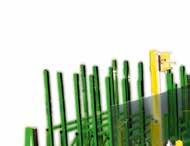


Increase your flexibility and extend the product range in your glass storage with Rapidstore. Glass and packages find their optimal place in the movable rack frames. Benefit from direct access to additional types of products in your gantry or floor loading system for customer-specific products with faster availability.
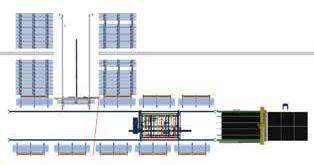
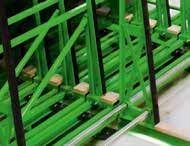
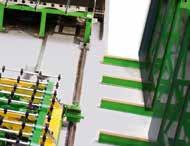
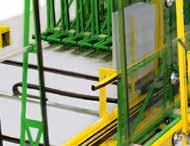
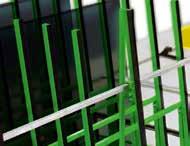
• Optimal for custom-tailored extension of your glass storage




• One or more cutting lines have direct access to more types of products
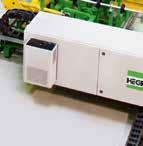

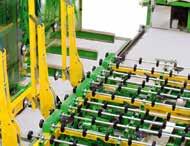
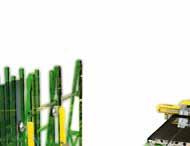

• Ideal for flat halls without craneways

glass technology HEGLA • Industriestr. 21 • 37688 Beverungen / Germany • E-mail: info@hegla.de
In good
Indonesian benders and shapers look forward to a better 2023
Indonesia is awaiting a significant increase in production and sales of glass due to inflation and the increase in commodity prices, including energy, following the Russian-Ukraine war. Sources in the industry suggest that a rising trend in demand for processed glass in automotive, construction, and furniture sectors seems to have improved the outlook for the year, writes Jahir Ahmed.
Indonesian benders and shapers in glass industry have recovered greatly from the slowdown impacted by the COVID-19 pandemic, but due to inflation and rise in prices of commodities, including energy, following Russia-Ukraine war, Indonesia is waiting for a large-scale boost up in production and sales. However, a rising trend in demand for processed glass in automotive, construction and furniture sectors has already improved the outlook for the current year, according to the industry sources.
Indonesia’s automotive glass user industry is one of the largest consumer segments for the benders and shapers. Industry sources believe that the automotive glass sector will rise significantly in 2023 as other automotive component sectors are showing an upward trend. A major automotive component manufacturer PT Dharma Polimetal believes that the component industry will remain promising in 2023. The company’s sales are expected to grow by 20% in 2023. Sales growth is expected to be 20% in 2022, and about 50% in net profit.
Indonesian Automotive Industry Association (GAIKINDO) estimates that in the January-October 2022, total car sales in Indonesia reached 822,013 units, which was 21.4% higher than the previous year’s corresponding period’s sales of 677,346 units.
To exploit the increasing demand, Dharma Polimetal is expanding its production substantially with setting up of three new factories. “As the Indonesian automotive industry is rising faster our efforts are to seize opportunities by making various investments in automotive component industries,” said Irianto Santoso, president director of Dharma Polimetal.
GAIKINDO had previously anticipated that the government-sponsored loan interest relief would help revive the car market following the impact of COVID-19. As Jongkie D Sugiarto, First Co-Chairman of GAIKINDO, explains, the credit mechanism is the first choice for Indonesian car consumers because it is convenient and does not require large amounts of cash up front. He said in Indonesia credit or leasing is an important factor in selling cars as about 70% of the sales depends on such finance.
In Indonesia, the glass processing sector has experienced an improvement in production and demand as a result of the current reduction in natural gas prices.
Chairman of the Flat and Safety Glass Association (AKLP) Yustinus Gunawan assessed that the government’s reduction of gas price in 2020 to $6 per mmBtu, from previous $8-10, had helped increase the competitiveness of glass industry.
“The effect of reducing gas rates has had a positive impact on manufacturers’ performance during the pandemic. In fact, export demand has started to increase,” he said. Yustinus expects that the Ministry of Industry’s efforts to run a 35% import substitution programme in 2022 will boost up domestic demands.
Production
With the relocation and start of PT Asahimas Flat Glass (AMFG)’s second furnace operations in Cikampek, near Jakarta in West Java, the company’s four flat glass furnaces now have a combined annual production capacity of 720,000 tonnes. Cikampek has two furnaces with a combined annual production capacity of 420,000 tonnes, while Sidoarjo has two furnaces with a combined annual production capacity of 300,000 tonnes.
asianglass AG 22-6 www.asianglass.com 34 ANALYSIS: Indonesia: bender and shapers
GLASS
AMFG’s flat glass products are used partly as glass application on buildings, interiors and as raw materials for further processed glass and automotive glass. It produces about 52,000 tonnes of automotive glasses annually and has a growing demand, given the expansion of automobile production capacity in Indonesia and other countries in the region. Asahimas is the largest manufacturer and supplier of float glass, safety glass and curved and automotive glass in Indonesia. Its processed glasses are exported worldwide.
The safety glass division of Indonesia’s other major glassmaker, PT Muliaglass, manufactures various tempered, laminated and curved glasses of some half a million square metres for automotive industries, special vehicles and transports including railcars.
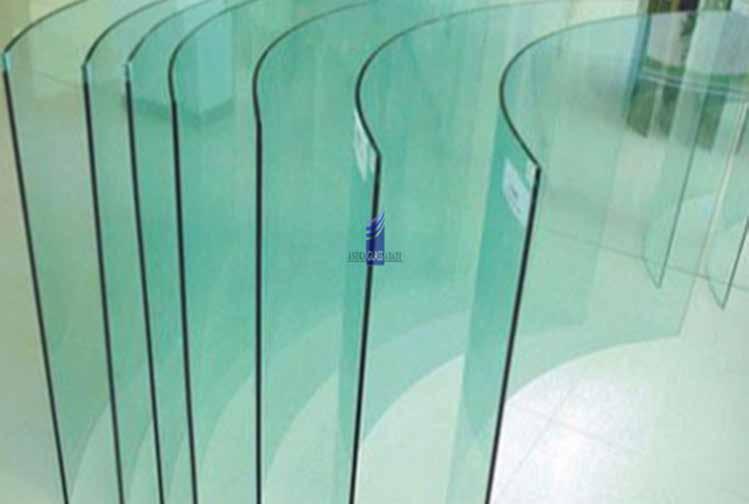
PT Mulia Industrindo, one of the market leaders, operates Muliaglass,
a major glass manufacturing facility that produces float glass, glass containers, glass blocks, and safety glass. Muliaglass’ Safety Glass Division has a production capacity of 150,000 car sets annually.
In the next two years, Indonesia’s glass industry will add new capacity. South Korea’s KCC Glass Corporation has begun construction of PT KCC Glass Indonesia, its first overseas glass factory, in Indonesia to produce float and various types of processed glass, including bended and shaped architectural and automotive glass. The factory is currently under construction in Batang Industrial Park, Central Java, Indonesia. It is expected to be completed and able to begin production in 2024. The facility will be capable of producing 428,000 tonnes of architectural float glass per year upon completion. The glass will be produced by KCC for the Indonesian and South East Asian markets.
35 AG 22-6 asianglass www.asianglass.com
ANALYSIS: Indonesia: bender and shapers
shape
INDONESIA’S AUTOMOTIVE
USER INDUSTRY IS ONE OF THE LARGEST CONSUMER SEGMENTS FOR THE BENDERS AND SHAPERS.
ANALYSIS: Indonesia: bender and shapers
Processing
Indonesia has many architectural, automotive and industrial glass processors, including benders and shapers. One of the best-known processors, PT Roxy Prima Indoproducts, better known by its brand name, Roxyglass, is a prominent bender and shaper of tempered glass used in architectural construction and automobiles. Roxy’s curved glass is tempered and bent with the latest technology. “Roxyglass meets international standards with excellent qualities,” Roxy claimed.
Roxy’s bent glass’ shape is controlled by computer that eliminates mould marks on the glass and provides accurate dimensional tolerances. The maximum size of the bent glass is 5,100mmx2,400mm with thickness of 4mm to 9mm. Minimum radius, 5mm-6mm = R1000, 8mm-12mm = R1500 and 15mm-19mm = R2000.
Roxyglass supplies a comprehensive range of standard bent and shaped glass, as well as custom made-to-size product. Its comprehensive and expanding product range leads the processed glass markets with an established reputation for technical excellence. Roxyglass range is also under constant review, extends and improves by responding to the changing demands of the industry. The company claims “its ability to react quickly and positively places it in a strong position to offer the highest product specification at the most competitive prices.”
The brand named Roxyglass, our curved glass, is manufactured with latest bending and tempering system, said the company. “Our produced glass meets the international standards with excellent qualities.”
Roxyglass was established in 1990 in Jakarta as an export-oriented manufacturer and has a wide range of experience in glass for building and decorative products. According to the company, it “draws its inspiration from the elegance and versatility of this beautiful material.”
“Employing an in-house design team of creative designers and experienced craftsman,” the manufacturer said, “we have the ability to mass produce high quality glass in compliance with international products certifications, such as, ANSI, BS, EN, JIS and ANZ, for local and export markets.”
Indonesian glass benders and shapers
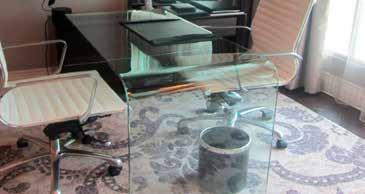
PT
Asahimas Flat Glass Tbk (AMG)
(Part of Japanese global glass major AGC Group)
Location: Cikampek, near Jakarta, West Java, and in Sidoarjo, East Java, Indonesia
Products: Curved safety glass and automotive glass
Markets: Domestic and export markets
Others: Asahimas is the largest manufacturer and supplier of float glass, safety glass and curved and automotive glass in Indonesia. Its processed glasses are exported worldwide. It manufactures automotive glass for various premier brands of automobiles of different countries. Asahimas float glass, construction glasses, tempered and laminated safety glasses, automotive glasses, figured glass, glass mirrors, heat-reflective glass and Optima brand IGU panels are widely used in Indonesia and abroad, and capturing demand steadily in the emerging markets. Asahimas is one of the biggest in Southeast Asia. It has an aggregate installed production capacity of 720,000 tonnes for flat glass, 5,800,000 square metres for safety glass and 6,800,000 sq metres for mirror.
PT Mulia Industrindo TBK (PT Muliaglass)
Location: Sukaresmi, Cikarang Selatan, Bekasi (near Jakarta), West Java 17550, Indonesia
Products: Curved glass and automotive glass
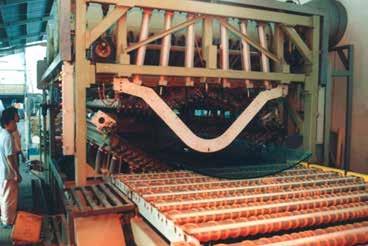
Markets: Domestic and export markets
Others: Muliaglass is a major manufacturer and supplier of float glass and curved and automotive glass in Indonesia. It manufactures automotive glass for various premier brands of automobiles of different countries. Muliaglass produces 120,000 car sets of automotive glass for home markets and exports. Its float glass is also exported worldwide. It caters to domestic demand greatly for building and industrial uses. Also, it manufactures packaging glass and glass blocks for home and world markets.
PT Sinar Rasa Kencana (SRK)
Location: Tangerang, near Jakarta, Indonesia
Products: Curbed glass, automotive glass and other safety glass
Markets: Domestic and export markets
Others: SRK manufactures a diverse range of architectural and automotive glasses with various thickness and dimensions. Its bent and shaped architectural glass, automotive glass, industrial glass and glass furniture are exported to different countries. It is capable of tempering glass panels of up to 7,000mm long by 2,140mm wide. It processes about half a million sq metres of glass per year.
Roxy Glass (PT Roxy Prima Indoproducts)
Location: Tangerang City, near Jakarta, Indonesia
Products: Bended and other shaped processed glass
Markets: Domestic and export markets
Others: Roxyglass is export oriented. It has markets in many countries in addition to its premier domestic markets. Roxy produces handcrafts, some 10,000 pieces, per month, of quality safety and building glasses and mirrors of classic/contemporary designs. Its triple glazed IGU in lead and brass insert is known as ‘Roxy Glass.’
asianglass AG 22-6 www.asianglass.com 36
BECOME A DIGITAL ENTERPRISE
How digitalization ensures lasting success
To maximize production efficiency and become more sustainable, plants must be thoroughly optimized. By transforming into a Digital Enterprise and using a Digital Twin, you can test system components before commissioning, train operators offhand, and optimize plant sections during operation. We support you with integrating solutions of machine and plant builders into a plant-wide automation, providing a reliable foundation for data transparency, holistic operation, and process optimization. This way, you can maintain your leading market position and meet customer expectations while boosting the productivity and availability of your plant along the entire lifecycle. siemens.com/glass
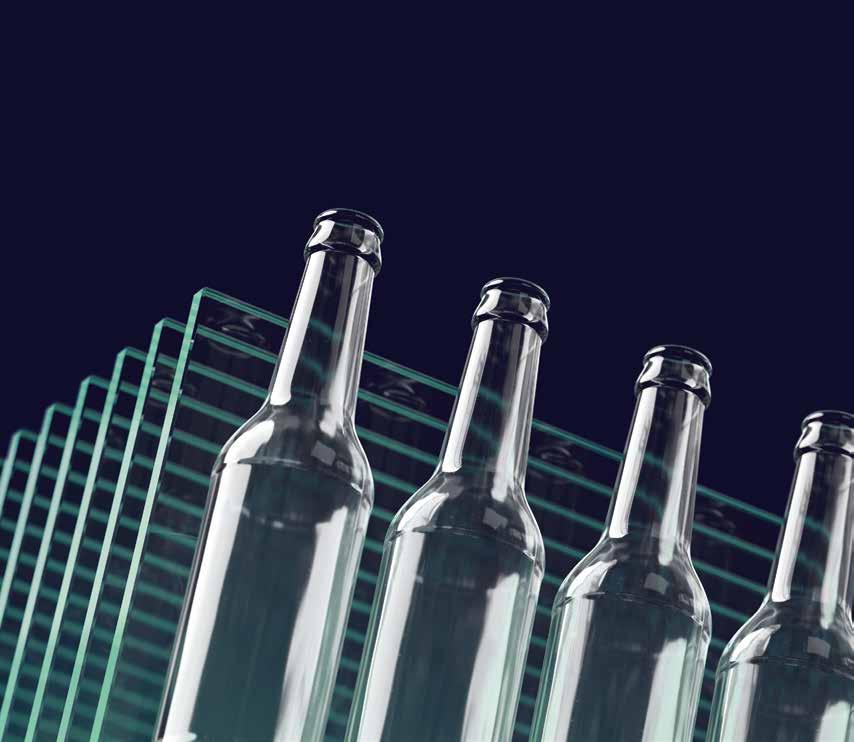
ANALYSIS: Indonesia: bender and shapers
Roxyglass supplies a comprehensive range of standard products. It also offers custom-made products. Its range, under constant review, extends and improves by responding to the changing demands of the industry.
Sinar Rasa Kencana (SRK) is another major bender and shaper. Located in Tangerang, adjacent to Jakarta in the west, SRK manufactures a diverse range of architectural and automotive glasses with various thickness and dimensions. It has a highly potential export market in the ASEAN bloc. Its maximum curved tempered glass size is 3660mmx2850mm. Its pre-processing machinery includes four CNC cutting machines, six multi-spindled double-edgers, two CNC shape grinding machines and two water jet cutting machines.
By utilising the latest CAD/CAM technology, SRK offers a variety of innovative ways to use glass in any shape or design. A wide range of functional glass furniture, including table tops and display cases, bookcases, and engraved partitions, is available, while in large building projects, it has more than 20 years of bending experience manufacturing tempered curved glass of diverse shapes, which has attracted many leading architects and developers to use their products and services in their extraordinary projects. Among other things, it offers laminated safety glass for automobile windshields.
Since starting up its production of curved glass and windshields, including side-lites in 1982, SRK has successfully made its mark in a number of prestigious projects all over Indonesia and other ASEAN countries, particularly, in Malaysia and Singapore.
PT Surya Adhitia Fortuna Glass (previously PT Surya Fortuna Glass)
Location: Batuceper, Km. 23, Tangerang 15121, Banten, Indonesia
Products: Processed shaped glasses for various uses.
Markets: Domestic and export markets.
Others: Surya Adhitia Fortuna’s tempered glasses are available with ceramic frits (ceramic coated to create desired motifs), usually applied in home appliances, electronic panel, room divider, bus and train windscreen, etc.
PT Aneka Glass Abadi
Location: Surabaya, East Java, Indonesia
Products: Curved safety glass and other processed glass

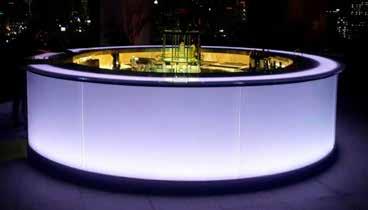
Markets: Domestic and export markets
Others: The bending glass that Aneka Glass processes has a minimum radius of 2,000mm with sizes, at least 600mmx1,000 mm, and maximum size of 2,000mmx3,000mm, depending on glass thickness.
PT Mayatama Manunggal Sentosa
Location: Singosari-Malang, East Java 65153, Indonesia
Products: Processed and crystal safety glasses.
Markets: Domestic and export markets.
Others: Mayatama Manunggal Sentosa is the holder company of ‘Diamond Tempered’ brand that involves glass processing. Mayatama Manunggal process crystal and normal glasses to make safety glass for building, automotive and industrial uses. It also produces printing glass for furniture, industry, building and automotive.
PT Multi Arthamas Glass Industry (MAGI)
Location: Surabaya, Propinsi Jawa Timur, Indonesia
Products: Processed safety glass.
Markets: Domestic and export markets
Others: Multi Arthamas produces tempered, laminated and bending glasses for automotive, building and industrial uses.
Abebersa Pratama PT
Location: Bekasi, Jawa Barat, Indonesia.
“Architects and designers are becoming ever bolder in expressing their visions. As the increasing complexity of contemporary design becomes the mainstream in today’s architecture, so are the demands for special shaped glass,” the manufacturer said.
“SRK’s curved tempered glass is manufactured with Glasstech’s advanced bending and tempering system. The glass produced meets international fracture standards while retaining excellent optical qualities. The shape is controlled by computer, which eliminates mould marks on the glass and provides accurate dimensional tolerances.”
It was established primarily to supply glass to the growing automotive industry in Indonesia. Through the use of the latest Japanese technology, SRK introduced the Fujiwara trademark for its tempered automotive glass. It soon established a dominant position in Indonesia’s carroserie and replacement glass markets.
The innovative spirit that is the hallmark of this company continued in 1997 when SRK offered curved tempered glass into the market. The very first second-generation advanced bending and tempering system from Glasstech was installed and went on-line in May that year. SRK now has the ability to process laminated curved tempered glass, one of the most difficult products to manufacture in the industry.
Products: Processed safety glass and building glasses.
Markets: Domestic and export markets.
Others: Abebersa Pratama manufactures double and triple glass window and curtain wall IGUs, insulating glass panels, architectural and decorative glass panels and tempered/toughened glasses.
asianglass AG 22-6 www.asianglass.com 38
For 75 years, HFT has developed a reputation as a leading EPC contractor to the global glass industry. What you might not know is in that time, HFT has completed over 300 EPC projects in 47 countries for Float Glass, Container Glass, Fiberglass, and more.
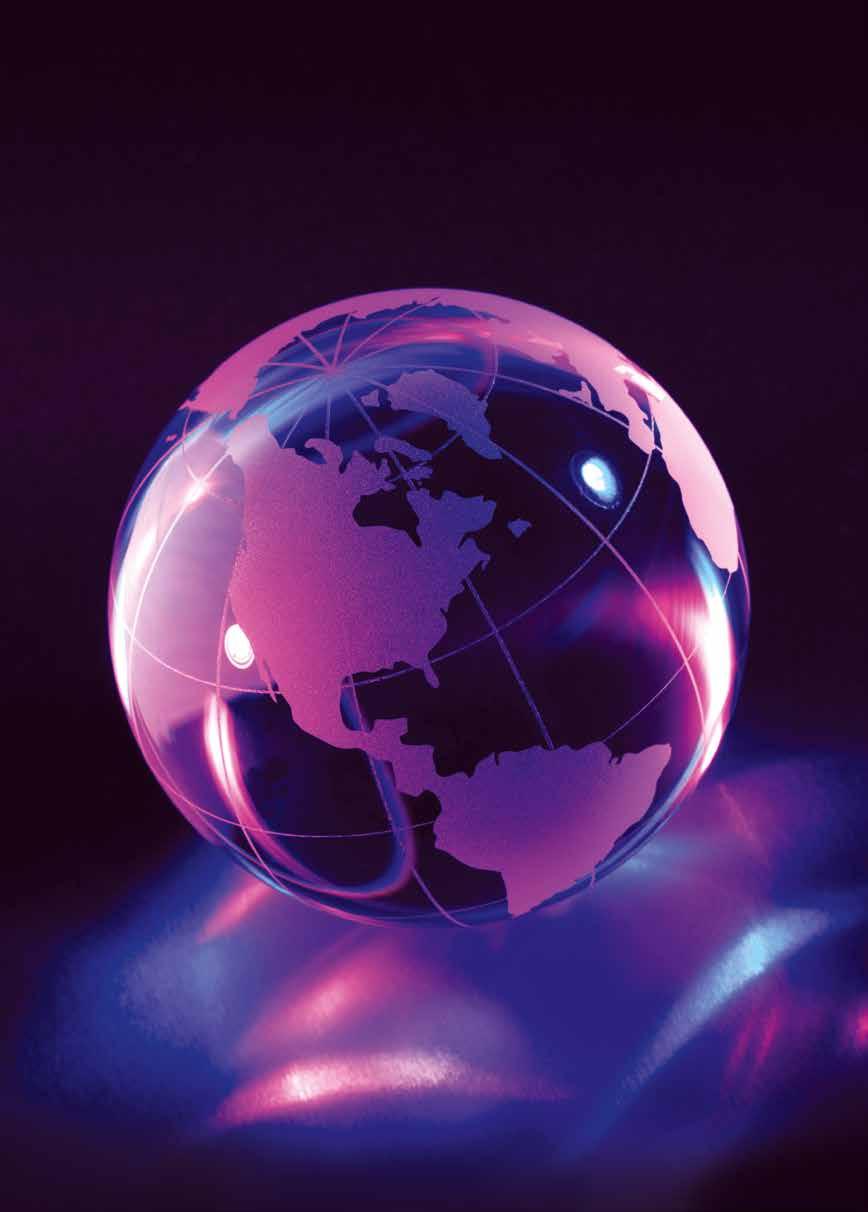
Whether it’s a greenfield glass factory in a far corner of the globe or a major facility reconfiguration just up the road, HFT has consistently delivered quality, efficient, and innovative project solutions. This performance, plus our commitment to customer satisfaction makes us the clear single-source choice to take your next project from concept to completion.
Your vision. Our expertise. The perfect partnership.
www.hft.com | info@hft.com
Some solutions are clearer than others.
ANALYSIS: Indonesia: bender and shapers
The SRK line of curved tempered glass is produced using the latest Glasstech technology coupled with over 20 years of bending experience. SRK’s claim is that as architects and designers become increasingly bold in expressing their visions, and as contemporary design becomes the mainstream in today’s architecture, so is demand for its special shaped glass. The SRK challenge is to dream of new ways to use glass, in any shape or design and now with the added benefit of tempered safety glass as well.
The application of the glasses are mainly in spiral staircase, curved glass railings, automotives, shower screens, display cases, glass furniture, shop fronts, pool surrounds, revolving doors, partitions and glass lifts.
SRK claims its tempered safety glass’ shaped interior glass and furniture glass’ timeless quality makes it the perfect medium for interior decorations. Contemporary designers are coming up with new and innovative uses for glass to achieve products that are elegant as well as long lasting.
Multiple units
PT Multi Arthamas Glass Industry (MAGI) has a broad range of products in the Indonesian market. Its development in contemporary architecture and design has promoted exceptional ideas such as the curved shapes of buildings and furniture.
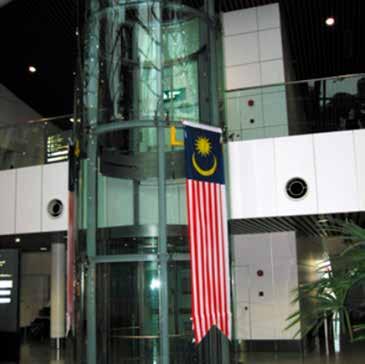
“As this exceptional design needs an exceptional shape of glass, we introduce MAGIBEND, a convenient product to use for the curviest shape possible. Producing this unconventional product obviously needs delicate attention,” said the company. MAGI is the source of various quality tempered bent glass.
Among many others, PT Bintang Mas Glassolutions (BMG) manufactures a diverse range of curved safety glass, primarily used in architectural, both interior and exterior, furniture, and appliances industry. Founded in 2002, BMG was spun off from its parent company, Bintang Mas, a major distributor and processor of safety glass in Indonesia since 1968. Since then, BMG has steadily grown to become one of the major manufacturers of safety glass.
Based on over 10 years of experience and expertise in glass processing, it has achieved the Indonesian National Standard SNI for safety glass, and bended products.
PT Tamindo Glass produces bending annealed curved glass used for revolving doors, banisters, display cases, curtain walls, handrails and furniture.
PT Bintang Mas Glassolutions (BMG)
Location: East Java, Indonesia
Products: Curved glass and other processed glass

Markets: Domestic and export markets
Others: PT BMG also serves export markets worldwide. It has a distribution network covers all major cities and towns in Indonesia.
PT Tamindo Glass
Location: Cikarang lndustrial Estate, Bekasi, lndonesia
Products: Bent and shaped glass and other processed glass
Markets: Domestic and export markets
Others: It manufactures various architectural and furniture glasses, among others.
PT Abdi Rakyat Bakti
Location: Sei Rengas I, Medan Area, Medan 20214, Sumatera Utara, Indonesia
Products: Sheet glass and processed glasses.
Markets: Domestic and export markets.
Others: Abdi Pakyat Bakti markets its flat and processed glasses in Indonesia and neighbouring countries.
Tunggal Majuasri Glass PT
Location: Kawasan Industri Benua Indah, Tangerang 15131, Banten, Indonesia
Products: Flat and processed glasses.
Markets: Domestic and export markets.
PT Tossa Shakti Group, closed and declared bankrupt
Location: Raya Semarang-Kendal KM 19, 5, Kendal, Indonesia
Products: Float, figured/pattered and processed glasses.
Markets: Domestic and export markets
Others: Tossa Shakti group has two manufacturing factories, PT Tossa Shakti Float Glass for float, and PT Tossa Shakti Figured Glass for figured/patterned glass, with daily production capacity of 900 tonnes and 70 tonnes, respectively.
asianglass AG 22-6 www.asianglass.com 40






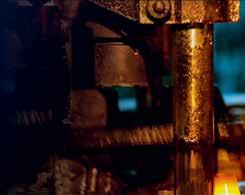
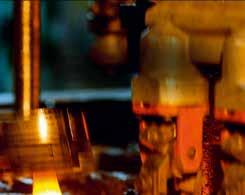




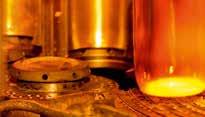
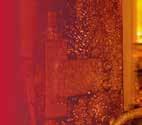
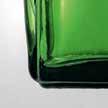
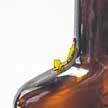



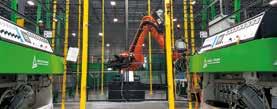
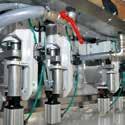
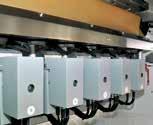
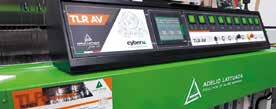

Zero defect quality in the vacuum process Vacuum Control System VCS www.futronic.de automation in a new dimension Inexpensive reject system Early detection of manufacturing and system problems Reduced error rate Significantly improved quality of products and production Photos: O-I Germany INDUSTRY SOLUTIONS FOR TRANSFORMING PRODUCTION AND BECOMING A SMART FACTORY ROBOTS NEW INTEGRATED, FLEXIBLE AND CUSTOMISED SOLUTIONS A-WR SYSTEM TIRED OF PERFORMING WHEEL PRESETTING ON VERTICAL EDGERS? SOLUTIONS FOR AUTOMATING ACTIVITIES AND INCREASING PRODUCTION FLEXIBILITY AUTOMATIC MACHINES cyberal ADELIO LATTUADA S.R.L. - Via Abbondanza, 11/13 - 22070 Carbonate (CO) IT - adeliolattuada.com | cyberal.adeliolattuada.com
In compe
Beverage packaging trends in Asian countries
Container glass industry’s fortunes are intertwined with the beverage packaging to a large extent as demand from this segment accounts for more than 80% of the total container glass demand. Beverage market product growth has led to a steady increase in the demand of glass containers in most of the countries. However, growth in beverage consumption has also led to an increase in the diversity of packaging formats during the last decade in most of the countries. It is sad to state that our industry has lost market share in some of the key sub-segments of the beverage industry to PET packaging, metal cans, and Tetra pack.
Forty years ago, before the plastics, and metal cans revolutions had gathered pace, most beverages were sold in glass bottles. Today, a high proportion of soft drink bottles are made from a tough plastic material called polyethylene terephthalate, or PET. Metal cans has eroded container glass industry’s market share in beer industry in a number of countries. In fact, in some countries, share of metal cans in beer packaging is as high as 65%. Though, in some of these sub-segments, container glass is again making inroads and trying to win back its lost share.
Beverage packaging has evolved at a rapid pace in recent years, driven by a combination of forces including changing consumer preferences and increased competition and technology innovations in the packaging mediums. The course of this evolution was disrupted by COVID-19, which sent shockwaves throughout the Asian beverage markets. Some of the evolutionary trends in beverage packaging were accelerated, others slowed slightly, and a few new short-term trends emerged.
One of the most notable developments in the Asian beverage consumption
has been the rapid expansion of e-commerce, though this varies from region to region. For example, the penetration of online shopping is high in ASEAN region, whereas it is low in South Asian region. Increased online shopping has led to an increase in home delivery of everything from individual alcohol purchases to beverages purchased as part of grocery orders. As more products are offered online, beverage producers are adapting under different shipping and delivery scenarios.
Intense competition from alternate forms of packaging – PET packaging and metal cans – has posed serious challenges for container glass producers in some of the sub-segments of beverage industry.
asianglass AG 22-6 www.asianglass.com 42 ANALYSIS: Beverage Packaging Trends In Asia
Share of different regions in overall beverage packaging market at retail Region Share ( in pc) Asia Pacific 39.5% Australasia 1.2% Eastern Europe 6.8% Latin America 11.6% The Middle East and Africa 4.3% North America 20.7% Western Europe 15.9%
More than 80% of the total demand for container glass comes from the beverage packaging industry. Container glass producers in some subsectors of the beverage industry are facing intense competition from alternative forms of packaging, including PET bottles and metal cans, observes Yogender Singh Malik.
tition
Container glass position in ever changing consumer preferences
Container glass scores very high in consumer preference in most of the categories of beverage industry. Consumers today are concerned with the sustainability of the products they purchase, especially related to packaging materials.
In a recent survey by consulting company, McKinsey, more than 50% of consumers stated that they are greatly concerned about the environmental impacts of packaging, and nearly 70% are willing to pay extra for eco-friendly packaging. As a result, manufacturers are promoting sustainability in packaging across the beverage industry. We need not to state that container glass is the most obvious winner
of
this shifting consumer preference.
Rising popularity of premium products
Much like the Western countries, Asian beverage industry has witnessed a steady rise in the consumption of premium beverage products in both alcoholic and
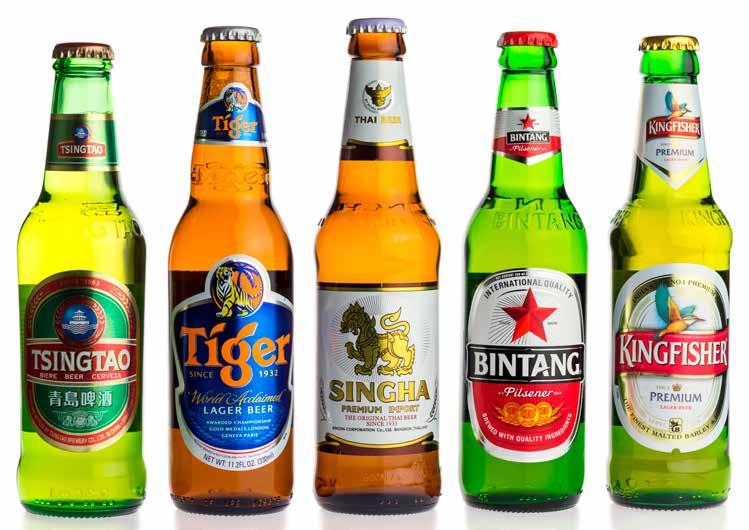
non-alcoholic beverage segments. Container glass packaging has outscored its rivals (PET packaging and metal cans) by a very high degree in the packaging of these products.
Vikram Bhalla, a New Delhi-based brand consultant, told Asian Glass: “When it comes to premium packaging, container glass is seen as a bespoke way to package products and add premium quality to the designs of products.
“In fact, to a large extent success of premium products is due in large part to packaging innovations that give the products a premium look-and-feel and help them stand out from the competition. The high margins associated with premium products will ensure that we see more and more of these in the years ahead.”
Lightweighting
Weight of glass bottles has been an impediment in the usage of container glass bottles in some of the sub-segments of the beverage industry. Beverage producers have often complained that excessive weight of glass bottles have added to their transportation costs.
43 AG 22-6 asianglass www.asianglass.com
ANALYSIS: Beverage Packaging Trends In Asia
compe
ANALYSIS: Beverage Packaging Trends In Asia
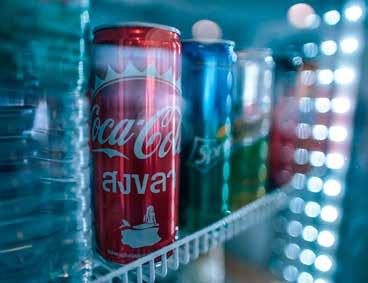
Container glass producers have addressed this issue by offering light weight glass bottles. Our industry has made steady progress in the lightweighting of containers, with glass bottles 40% lighter than 20 years ago.
Lightweighting has been very popular in the non-alcoholic beverage and beer industries, but , spirits and wine producers have been reluctant to use light weight glass bottles: which tend to favour heavier glass bottles as a sign of premiumisation. The main obstacle in adoption of light weight glass bottles in these two segments has been the fear that these products in light weight glass bottles will be perceived as lower quality products.
BEVERAGE MARKET PRODUCT GROWTH HAS LED TO A STEADY INCREASE IN THE DEMAND OF GLASS CONTAINERS IN MOST OF THE COUNTRIES.
Sustainablity of packaging: A key concern
One of the top concerns for today’s beverage consumers is the overall sustainability of the products they are purchasing. Specifically, consumers are looking for packaging that is more sustainable, especially packaging that finds ways to reduce or eliminate plastic usage. Though, this trend was more pronounced in the West, but Asian consumers have become very conscious to this trend. This trend is especially strong among millennials. Beverage manufacturers are responding to this trend with the awareness that millennials are expected to become the largest consumer demographic in most of the countries in the region in medium and long term .
There are several strategies that beverage producers are adopting to address this issue, but by far the most important is reducing the overall amount of plastic utilized in their packaging. Plastic has become a hot-button issue for consumers, especially given the mounting statistics demonstrating the damage improperly discarded plastic does to the environment. The beverage industry faces a particularly challenging problem with plastic. To achieve lower levels of plastic usage, manufacturers have turned to a variety of solutions that include reducing their overall packaging material requirements and adopting alternatives to plastic altogether.
Alcoholic beverage packaging
Historically alcoholic beverages were packaged in container glass products, but advent of aluminium cans in the penultimate decade of last century and metal cans huge popularity in beer packaging has eroded container glass dominance in beer packaging.
Alcoholic beverage industry can be broadly classified in three distinct categories from container glass perspective. Hard liquor, which comprises of whiskey, rum, vodka and other variants where alcohol content is high, beer and wine.
Among these three categories, container glass dominates the packaging of hard liquors. In Asian countries, almost 94% of the hard liquor is packaged in container glass bottles. Though, in some countries, for example in India,
cheaper liquor is packaged in PET bottles due to cost considerations, but even in these sub-segments the trend is reversing. Some of the state governments in India has banned the sale of country liquor in PET bottles.
asianglass AG 22-6 www.asianglass.com 44
Major players, location and capacities in Indian container glass industry Company Expansion Year Hindustan National Glass Industries Pan India 4800 AGI Glasspac Andhra Pradesh 1600 Piramal Glass Gujarat 1530 Haldyn Glass Gujarat 320 Mohan Meakin UP 240 Sunrise Glass Gujarat 220 Janta Glass Gujarat 220 Universal Glass UP 215 Hyaline Glass Madhya Pradesh 150 Vitrum Glass Mumbai 130 Pragati Glass Industry Gujarat 130 Enki Glass Industry Gujarat 120 Firozabad based various small-scale units UP 900 Cumulative capacity of all the remaining small producers Pan India 1200 Grand Total 12330 TPD
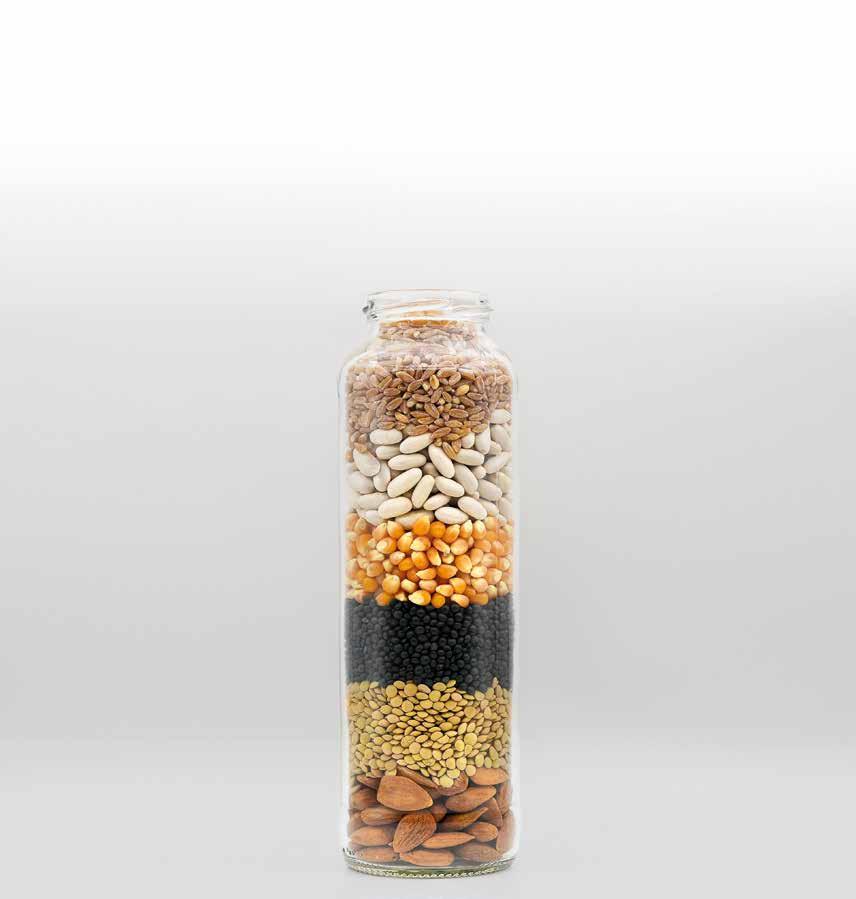
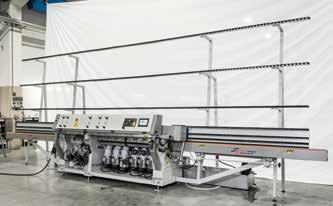
ANALYSIS: Beverage Packaging Trends In Asia
Sprits packaging
Spirits packaging accounts for the largest share of container glass demand in Asian countries. There have been isolated experiments of spirits packaging in PET, tetrapack and aluminium cans, but these have not been successful on a mass scale.
Container glass remains the dominant medium of packaging in this segment of alcoholic beverages.
Regis Maillet, marketing director for Saverglass Group, says:“Given the increasing demand in the premiumisation of the non-and-low alcohol category, brands are taking on an innovative approach for an innovative product.
“Brands seek glass packaging designs to reflect the brand identity contributing to the exceptional non-and-low alcohol drinking experience. From refined bottles that have an appealing shape that draws attention, personalisation through embossing on the finish, or decoration techniques instead of simply just labels, these are packaging solutions to stand out amongst the competition.”
Saverglass is the world’s specialist in the manufacturing and decorating of premium and luxury glass bottles, with production sites spread around the world to locally serve customers both large and small: three glass production sites and three decoration sites in France, one glass production site in Belgium, one glass production and decoration site in Mexico, one glass production site in the United Arab Emirates. Saverglass produces a total of about 520,000 tons of premium glass and decorates over 150 million bottles per year. In 2021 the Saverglass Group achieved a sales revenue of $675 million.
bottles differs significantly by market, even in the same region.
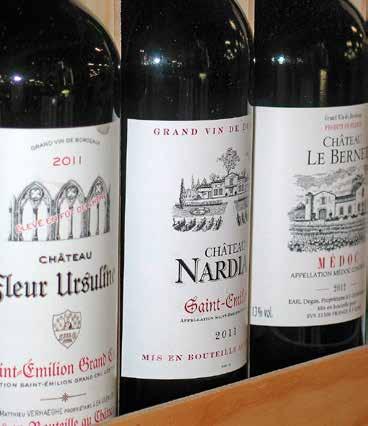
For example, the use of container glass is as high as 94% in India, while it is a mere 34% in Japan. Between these two extremes are countries like Thailand, South Korea, China, Philippines and Vietnam, where use of container glass is between these two extreme ranges.
Beer packaging
Beer packaging is one of the most lucrative sub-segments of beverage industry for container glass producers due to uniformity of final products and high volumes.
Currently, around 60% of the conventional beer beer in Asian countries is sold in returnable bottles, representing the beverage category where returnable bottles currently dominate. However, the proportion of beer sales in returnable

Wine packaging
Glass has a long, loved heritage in the wine industry and it remains the best choice for wine on every front, whether its taste, sustainability, recycling or returnable packaging with manufacturers and brands alike committed to a more sustainable future with glass.
Wine packaging has been historically dominated by container glass industry and the trend is likely to remain so for the foreseeable future. In fact, wine industry will be one of the most important demand drivers for container glass industry in Asian countries, where wine consumption is low but growing steadily.
Among Asian countries, China is the only sizable wine producing country. Countries like India have a small but rapidly growing wine industry. In addition to the domestic production, Asian countries import a sizable amount of wine in bulk, which requires bottling in their domestic countries. These operations demand a significant demand of glass bottles.
Non-alcoholic beverages
Over the years, non-alcoholic beverage producers in Asian countries almost phased out the ubiquitous returnable glass bottles, replacing them with PET bottles and aluminium cans, both of which has a sizable market share in the packaging of these products.
Non-alcoholic beverage industry has diversified during the last two decades. While carbonated beverages dominated the non-alcoholic beverages by a huge margin about two decades ago. Newer categories like fruit juices, energy drinks, functional drinks, and bottled water now account for more than 50% of the total non-alcoholic beverage market on value basis.
asianglass AG 22-6 www.asianglass.com 46
Container glass producers in Pakistan Company Expansion Installed Capacity Balochistan Glass 1 Hub, Balochistan 36,000 TPA Balochistan Glass II Sheikhupura 75,000 TPA Balochistan Glass III Kot Abdul Malik, lahore 22,000 TPA Ghani Glass Limited Haripur ( Khyber Pukhtunkhwa) 250 TPD Plant 1 Landhi Industrial Area, Karachi 300 TPD Ghani Glass Limited Plant II Hattar, Kheybar Pukhtunkhwa 110 TPD Murree Glass Pan India 1200
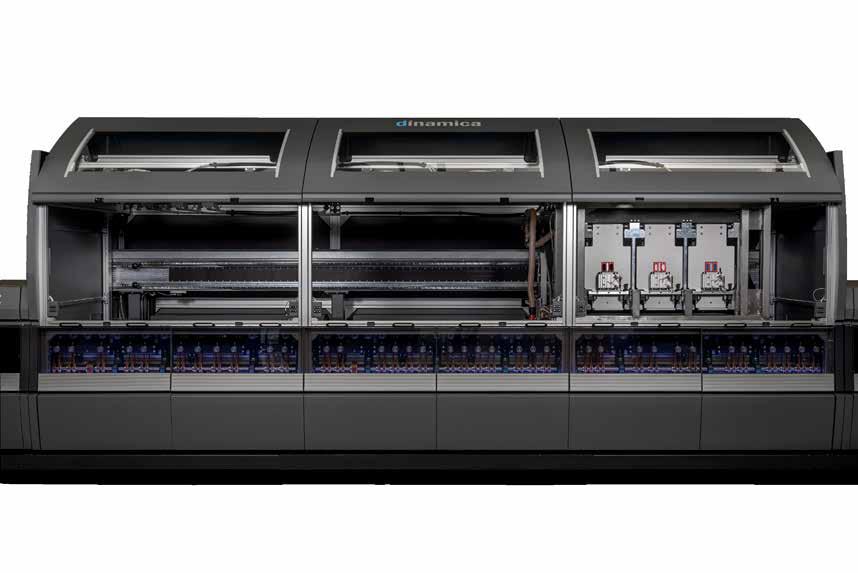
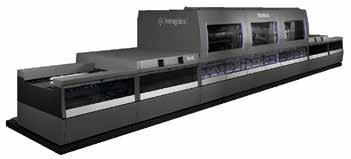
ANALYSIS: Beverage Packaging Trends In Asia
Carbonated beverages were one of the mainstays of container glass industry, but the advent of PET bottles led container glass industry to lose a huge market share in this category. If competition from PET was not enough, metal cans too started to chip away the share of container glass in the packaging of carbonates in Asian countries in the first two decades of the century.
However, container glass is making some inroads in this category. For example, Coca-Cola India is promoting returnable glass bottles once again, after years of focusing on disposable plastic bottles. The change helps the company reach out to more users and reduce packaging costs.
Sanket Ray, president for India and South-West Asia, Coca-Cola, says: “In 2021, we could predict that inflation is going to be one of the major challenges in the coming year and glass bottle is the least impacted packaging in inflation. It also gives us an affordability play in large parts of India.
“Glass bottles are least impacted by inflation because of negligible packaging material cost. We have to incur the cost at one time and then these bottles are rotated. We have been playing around with our packs, which is revenue growth management, specifically pack and pricing.
“For example, when we took some pricing on large PET packs, we also strongly reinforced our focus at the INR10 price points through our glass bottles. We relaunched it strongly across a few markets, to see that we do not lose out consumer because of the impact of inflation.”
The bottles rolled out last year at INR 10 price point (200 ml) in select states are available across the company’s top-selling brands such as CocaCola, Thums Up, and Sprite. In some markets, glass bottles now make up 30% of beverage sales. Overall, they account for a little less than 10% of the company’s business.
India isn’t the only market where Coca-Cola is trying glass bottles to counter inflation. Coca-Cola is expanding the distribution of its cheaper returnable glass bottles in several emerging markets.

The Indian soft drink industry is pegged at 33,559mn litres in volume terms and INR 1,283bn in value terms. Majority of volume share is contributed by packaged drinking water (PDW) at 48pc, followed by bulk/ HOD water at 23pc and carbonated soft drinks (CSD) at 19pc.
However, in value terms, the sector is majorly dominated by CSDs, which contribute 44pc (INR 567 billion), followed by PDW at 30pc (INR 385 billion). JNSD category which includes juices, nectar, still drinks, contributes 19pc (INR 244 billion) to the soft drinks industry. Other forms contributing the remainder 7pc include bulk water, energy drinks, sports drinks, flavoured water, etc.
Energy drinks
Energy drinks is one of the most popular beverage options in the Southeast Asian region. Thailand, Vietnam and Indonesia in particular have a very sizable energy drinks markets.
Thailand-based container glass producer, Asia Pacific Glass Co., Ltd. or APG, is a wholly owned subsidiary of the energy drink producer Carabao Group, produces container glass bottles for parent company. It is one of a few isolated cases of a beverage company setting up its own container glass plant to meet the captive demand.
Carabao Group set up this greenfield container glass facility in 2013 in order to meet the demand of container glass for its energy drink. The plant which become operational in August 2014, had an installed capacity of 310 TPD of container glass.
Rapid growth in Thailand’s and ASEAN’s energy drinks market prompted Asia Pacific Glass to undergo a capacity expansion within four years of its inception. In 2017, the company installed a new furnace and increased the installed capacity to 640 tonnes of glass containers per day. Bulk of this capacity goes to meet the in-house demand of parent company’s energy drink Carabao Dang.
Thailand
BG Container Glass Public Company Ayutthaya, Pathumathani, Khon Kaen, Prachinburi and Ratchaburi 3495 tonnes
Berli Jucker Packaging (Thai Glass Industries and Thai Malaya Glass)
Siam Glass Industries
San Miguel Yamamura Packaging Corporation
Asia Brewery Inc.
Philippines
Anglo Watsons Glass Incorporated
Arcya Glass Corporation
Rajburana, Bangplee, Saraburi
3340 tonnes per day
Rojana, Samutprakarn and Ayutthaya. 1480 tonnes per day
Cavite (Manila)
Mandaue (Cebu)
Cabuyao, Metro Manila
Calamba, Metro Manila
Calamba, Metro Manila
tonnes per day
tonnes per day
tonnes per day
tonnes per day
Indonesia
tonnes per annum OI Indonesia
PT Mulia Glass Cikarang (West Java)
million glass containers per day PT Iglas
tonnes per year San Miguel Yamamura Haiphong Glass
asianglass AG 22-6 www.asianglass.com 48
Leading
Country Company Location Installed Capacity
container glass producers in ASEAN countries
per day
1400
400
220
160
Jakarta
Jawa
340
100,000
Haipkong 380
110
164,000
2.3
Timur
tonnes per day Vietnam OI BJC Vietnam Vung Tau province
tonnes per day Go Vap Glass Ho Chi Minh City
tonnes per day

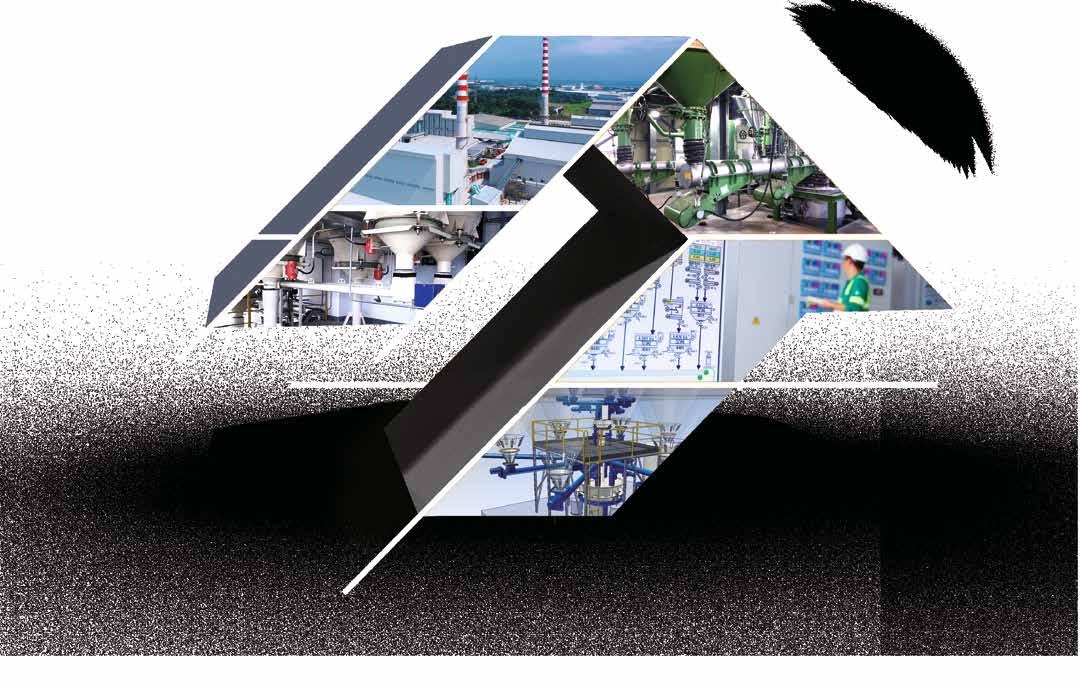



Challenging Market volatility impacts the soda ash industry
The COVID-19 pandemic has been a defining event both for our personal and professional lives. The global soda ash industry was no exception and was also severely impacted. The industry though had recovered well in 2021 with a continued recovery anticipated for 2022 and beyond. But then on 24 February Russia invaded Ukraine which has been a severe shock to the global economy, with the full impact still unfolding, writes Marguerite Morrin, executive director, global soda ash, chemical market analytics by OPIS, a Dow Jones Company.
Events in 2020 set the stage for where the soda ash industry is today. Soda ash is a basic chemical with glass dominating as the major end use, accounting for at least half of the total. Other end uses include soaps and detergents, sodium silicates and a number of applications in metals and mining. Overall demand fell sharply in 2020 but was followed by a strong recovery in 2021 to the extent that demand in 2021 exceeded pre-COVID levels.
Our expectation for 2022 was that growth would continue but global soda ash capacity was in decline with the total world capacity this year about 1.0 million mt less than the total in 2020. As such, we were anticipating tight market conditions this year. This has proved to be the case, but in fact, conditions are even tighter than anticipated following Russia’s invasion of Ukraine.
The significant of Russia for the global soda ash market is in fact more in terms of its impact on energy prices and energy availability, as opposed to its significance as a soda ash producer. Russia accounted for 4.3% of world soda ash demand in 2021 and Ukraine just 0.4%. The Russia/CIS (Commonwealth of Independent States) region is traditionally quite self-contained and while Russia is a fairly significant exporter of soda ash, exports are primarily to countries within the CIS region. However, when soda ash is extremely tight, diminishing exports from Russia places additional pressure on markets like the Indian Subcontinent and Africa, which traditionally purchase regular small spot volumes from Russia. Russia has as expected been fairly absent from international markets through much of this year. However, recently we are beginning to see product from Russia show up in some markets, typically at very competitive prices, however, to date the volumes have been limited.
Trade
In the soda ash industry, trade is extremely important as about a quarter of soda ash produced is shipped to another part of the world to be consumed. The US is by far the world’s biggest exporter, followed by Turkey in second place. China and Bulgaria vie for third place due to the fact that Chinese export volumes can swing significantly from year to year, exceeding two million in certain years only to fall back some other years to under one million mt, as was the case in 2021. The Black Sea is an important trade route for soda ash. Exports from Bulgaria via
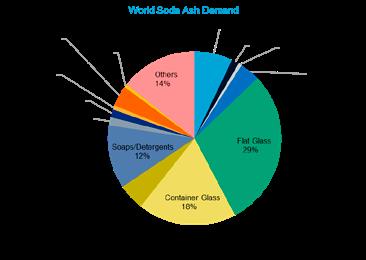
asianglass AG 22-6 www.asianglass.com 50 ANALYSIS: Soda Ash
Challenging times
the Black Sea are at risk due to the Russia/Ukraine conflict, as well as imports from Turkey to Central Europe via the same route. To date though there has been no known impact on trade via this trade route.
Events in 2020 set the stage for where the soda ash industry is today. Soda ash is a basic chemical with glass dominating as the major end use, accounting for at least half of the total. Other end uses include soaps and detergents, sodium silicates and a number of applications in metals and mining. Overall demand fell sharply in 2020 but was followed by a strong recovery in 2021 to the extent that demand in 2021 exceeded pre-COVID levels
Our expectation for 2022 was that growth would continue but global soda ash capacity was in decline with the total world capacity this year about 1.0 million mt less than the total in 2020. As such, we were anticipating tight market conditions this year. This has proved to be the case, but in fact , conditions are even tighter than anticipated following Russia’s invasion of Ukraine
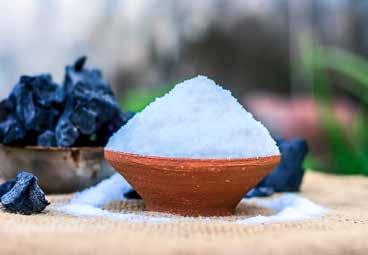
The trade patterns so far this year helps explain the global market tightness. To date exports from key sources are up by just 4% or 257,000 mt which is mainly due to increased availability from China. Logistical constraints and various operational issues have led to lower exports from other key suppliers. Exports from the US to date are down by 4% year-
The significant of Russia for the global soda ash market is in fact more in terms of its impact on energy prices and energy availability, as opposed to its significance as a soda ash producer. Russia accounted for 4.3% of world soda ash demand in 2021 and Ukraine just 0.4%. The Russia/CIS (Commonwealth of Independent States) region is traditionally quite self -contained and while Russia is a fairly significant exporter of soda ash, exports are primarily to countries within the CIS region. However, when soda ash is extremely tight, diminishing exports from Russia places additional pressure on markets like the Indian Subcontinent and Africa, which
on-year, and exports from Turkey are down by 1%. Another interesting observation in terms of trade is that for China the biggest increase in exports has been to South America, which is not a traditional destination for Chinese product. China’s exports to the region to date have totalled 196,000 mt, while in January-June last year the total to South America was just 12,000 mt. In fact, in the first half of this year Brazil was the single biggest export destination for China. Extremely tight market conditions in South America have encouraged this shift in trade from China.
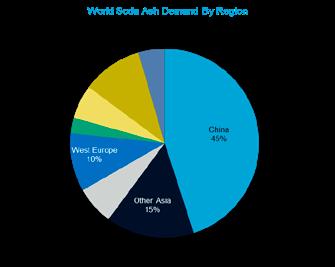
51 AG 22-6 asianglass www.asianglass.com ANALYSIS: Soda Ash
SODA ASH PRODUCTION IN WEST/CENTRAL EUROPE HAS BEEN IMPACTED INDIRECTLY BY THE CONFLICT BECAUSE OF ENERGY RELATED ISSUES WHICH HAS AT TIMES FORCED PRODUCERS TO DECLARE FORCE MAJEURE
various operational issues have led
are down by 4% year-on-year, and exports from Turkey are down by 1% Another interesting observation in terms of trade is that for China the biggest increase in exports has been to South America, which is not a traditional destination for Chinese product China’s exports to the region to date have tota lled 196,000 mt , while in January-June last year the total to South America was just 12,000 mt. In fact , in the first half of this year Brazil was the single biggest export destination for China. Extremely tight market conditions in South America have encouraged this shift in trade from China.
are down by 4% year-on-year, and exports from Turkey are down by 1% Another interesting observation in terms of trade is that for China the biggest increase in exports has been to South America, which is not a traditional destination for Chinese product . China’s exports to the region to date have tota lled 196,000 mt , while in January-June last year the total to South America was just 12,000 mt. In fact , in the first half of this year Brazil was the single biggest export destination for China. Extremely tight market conditions in South America have encouraged this shift in trade from China.
Energy/raw materials
Energy/raw materials
Energy/raw materials
The Russia/Ukraine conflict is having a major impact on global energy prices, and especially in Europe. Energy availability can also be an issue. In Europe, soda ash plants typically use either coal or natural gas as energy sources. In addition, coke and /or anthracite is/are raw material/s for the synthetic Solvay process. In Europe, anthracite is typically used more than coke because in the past it has been cheaper.
Russia accounts for about 40% of West/Central Europe’s natural gas supply. In addition, Russia is responsible for about 81% of global anthracite exports, 13% of global coke exports and about 16% of global seaborne thermal coal exports. The European Union has a ban in place on coal imports from Russia, with effect from the 2nd week in August. As a consequence, a number of soda ash plants are expected to switch from anthracite to coke. In addition, the availability of coal/coke/anthracite, on top of likely continued high prices, will maintain pressure on the region.
The Russia/Ukraine conflict is having a major impact on global energy prices, and especially in Europe. Energy availability can also be an issue. In Europe, soda ash plants typically use either coal or natural gas as energy sources. In addition, coke and /or anthracite is/are raw material/s f or the synthetic Solvay process. In Europe, anthracite is typically used more than coke because in the past it has been cheaper.
prices, especially when annual 2021 contracts come up for renewal. Through most of this year we have seen very different market dynamics with record high prices being recorded worldwide. In August 2020, in the midst of the COVID-19 pandemic, China’s export price average $161 per mt FOB while in June this year export prices from China averaged $417 per mt FOB. Very recently we are noting some softness in Chinese domestic and export prices. It remains to be seen if this is a short-term market correction or if it signals a more fundamental shift in the Chinese market.
The Russia/Ukraine conflict is having a major impact on global energy prices, and especially in Europe. Energy availability can also be an issue. In Europe, soda ash plants typically use either coal or natural gas as energy sources. In addition, coke and /or anthracite is/are raw material/s f or the synthetic Solvay process In Europe, anthracite is typically used more than coke because in the past it has been cheaper.
Russia accounts for about 40% of West/Central Europe’s natural gas supply. In addition, Russia is responsible for about 81% of global anthracite exports, 13% of global coke exports and about 16% of global seaborne thermal coal exports. The European Union has a ban in place on coal imports from Russia , with effect from the 2nd week in August. As a consequence , a number of soda ash plants
Russia accounts for about 40% of West/Central Europe’s natural gas supply. In addition, Russia is responsible for about 81% of global anthracite exports, 13% of global coke exports and about 16% of global seaborne thermal coal exports. The European Union has a ban in place on coal imports from Russia , with effect from the 2nd week in August. As a consequence , a number of soda ash plants are expected to switch from
Capacity Plans
In recent decades China has dominated soda ash capacity expansions with a huge amount of capacity being added, mostly to meet its own domestic demand. In the second half of 2019, a number of capacity expansions were announced, as soda ash demand in the medium term was expected to steadily increase. This time much of that extra capacity was planned for the US and was scheduled over the 2021-2022 time period, with further expansions due to come on stream in 2025.
to
Soda ash production in West/Central Europe has been impacted indirectly by the conflict because of energy related issues which has at times forced producers to declare force majeure. The industry has though also been plagued by plant problems and not just in Europe. Two US producers have had to declare force majeure to date this year while there have also been plant issues in Argentina, Botswana and Iran.
coke. In addition, the availability of coal/coke/anthracite, on top of likely continued high prices, will maintain pressure on the region.
coke. In addition, the availability of coal/coke/anthracite, on top of likely continued high prices, will maintain pressure on the region.
Soda ash production in West/Central Europe has been impacted indirectly by the conflict because of energy related issues which has at times forced producers to declare force majeure. The industry has though also been plagued by plant problems and not just in Europe. Two US producers have had to declare force majeure to date this year while there have also been plant issues in Argentina , Botswana and Iran.
Prices
Chinese prices tend to influence the global pricing trend because it is an important exporter and because its exports tend to be volatile. Its export prices reflect trends in the domestic market. Chinese export prices fell considerably in 2020, this put pressure on exporters in other parts of the world to lower
Soda ash production in West/Central Europe has been impacted indirectly by the conflict because of energy related issues which has at times forced producers to declare force majeure. The industry has though also been plagued by plant problems and not just in Europe. Two US producers have had to declare force majeure to date this year while there have also been plant issues in Argentina , Botswana and Iran.
PRICES
PRICES
However, the onset of COVID19 forced soda ash producers to rethink their future plans. In addition, the US producer Genesis Alkali idled its trona based plant, located in Granger Wyoming, in April 2020. Meanwhile, the expansions announced in late 2019 were pushed back. Genesis is now the first producer set to bring on stream additional capacity, which is scheduled for early/mid next year and includes the restart of Granger. All other projects have been delayed to the 2024/2025 time period, or even later.
While China has dominated capacity additions in the past its soda ash capacity has been in decline since 2021. None-the-less, there are ambitious expansion plans in China. These plans though are dominated by one single project, a huge
Chinese Weekly Soda Ash Prices (including VAT)
RMB per Metric Ton , Delivered
2020, Light 2021, Light 2022, Light 2020, Dense 2021, Dense 2022, Dense
140 220 300 380 460 540 620 Spot Contract, Quarterly Contract, Annual Southeast Asia Soda Ash Prices Source: Chemical Market Analytics by OPIS Dollar per Metric Ton, CFR © 2022 Oil Price Information Service, LLC. 1,100 1,600 2,100 2,600 3,100 3,600 4,100 Jan Feb Mar Apr May Jun Jul Aug Sep Oct Nov Dec
2020, Light 2021, Light 2022, Light 2020, Dense 2021, Dense 2022, Dense
Chemical Market Analytics by
Information Service, LLC.
Chinese prices tend to influen ce the global pricing trend because it is an important exporter and because its exports tend to be volatile. Its export prices reflect trends in the domestic market. Chinese export prices fell considerably in 2020, this put pressure on exporters in other parts of the world to lower prices, especially when
asianglass AG 22-6 www.asianglass.com 52 ANALYSIS: Soda Ash
and various operational issues have led to lower exports from other key suppliers. Exports from the US
are expected to switch from anthracite to 0.0 1.0 2.0 3.0 4.0 5.0 6.0 7.0 8.0 2021 2022 China US Turkey Russia Bulgaria Kenya Spain India Soda Ash Exports, YTD Source: Chemical Market Analytics by © 2022 Oil Price Information Service, LLC. 0 200 400 600 800 1,000 1,200 2015 2016 2017 2018 2019 2020 2021 2022 Africa Middle East Northeast Asia Southeast Asia Indian Subcontinent South America Other
Thousand Metric Tons Source: S&P Global © 2022 Oil Price Information Service, LLC. and
to lower exports from other key suppliers. Exports from the US to date
Mainland China Soda Ash Exports (YTD Jun)
anthracite
0.0 1.0 2.0 3.0 4.0 5.0 6.0 7.0 8.0 2021 2022 China US Turkey Russia Bulgaria Kenya Spain India Soda Ash Exports, YTD Source: Chemical Market Analytics by © 2022 Oil Price Information Service, LLC. 0 200 400 600 800 1,000 1,200 2015 2016 2017 2018 2019 2020 2021 2022 Africa Middle East Northeast Asia Southeast Asia Indian Subcontinent South America Other Mainland China Soda Ash Exports (YTD Jun) Thousand Metric Tons Source: S&P Global © 2022 Oil Price Information Service, LLC.
140 220 300 380 460 540 620 Spot Contract, Quarterly Contract, Annual Southeast Asia Soda Ash Prices
Chemical Market Analytics by OPIS Dollar per Metric Ton, CFR © 2022 Oil Price Information Service, LLC. 1,100 1,600 2,100 2,600 3,100 3,600 4,100 Jan Feb Mar Apr May Jun Jul Aug Sep Oct Nov Dec
Source:
Source: Chemical Market Analytics by OPIS © 2022 Oil Price
Chinese prices tend to influen ce the global pricing trend because it is an important exporter and because its exports tend to be volatile. Its export prices reflect trends in the domestic market. Chinese export prices fell considerably in 2020, this put pressure on exporters in other parts of the world to lower prices, especially when
OPIS RMB per Metric Ton
Delivered © 2022 Oil Price Information Service,
Chinese Weekly Soda Ash Prices (including VAT) Source:
,
LLC.
JOIN US IN TURKEY FOR GLASSMAN EUROPE




















The Turkish glass industry is currently enjoying an unprecedented surge in demand, join us in Istanbul next February where the hollow glass industry does business. Meet exhibitors offering the latest innovative manufacturing solutions for energy efficiency, quality control, packaging, logistics and decoration. Sign up to be the first to hear about exhibitors, speakers and what’s on at our upcoming events.

EXHIBIT
Ken Clark Sales Director +44 (0)1737 855117 kenclark@quartzltd.com
EXHBIT
Manuel Martin Quereda International Sales Executive +44 (0)1737 855023 manuelm@quartzltd.com

SPEAK

Greg Morris Editor +44 (0)1737 855132 gregmorris@quartzltd.com
































53 AG 22-6 asianglass www.asianglass.com 8-9 FEBRUARY Istanbul,
Turkey
GET INVOLVED
NEW LOCATION FOR 2023 CONFERENCE PROGRAMME NETWORKING EVENTS
Join the Glassman Group @glassmanevents BUSINESS MEDIA Official media partner: Organised by:
www.GlassmanEvents.com/Europe
Demand Drivers
in global economic growth and demand destruction in the conflict region. However, with the exception of the CIS region, any significant demand erosion has not been noticed yet. Glass plants across the world, including in West/Central Europe, appear to be operating at full capacity with demand said to be robust. There is though concern about the global economy and also about very high stocks of flat glass in China. One demand category though which may be less influenced by economic factors, and thus cushion t he blow to some extent from slower economic growth, is the environmental category This sector of demand includes lithium carbonate, solar glass, and sodium bicarbonate which were each immune to the negative impacts of the COVID -19 pandemic.
China Soda Ash Demand Indicators, YTD May
operating at full capacity with demand said to be robust. There is though concern about the global economy and also about very high stocks of flat glass in China. One demand category though which may be less influenced by economic factors, and thus cushion the blow to some extent from slower economic growth, is the environmental category. This sector of demand includes lithium carbonate, solar glass, and sodium bicarbonate which were each immune to the negative impacts of the COVID-19 pandemic.
Source: Chemical Market Analytics by OPIS © 2022 Oil Price Information Service, LLC.
natural soda ash plant in Inner Mongolia. Phase I of the Inner Mongolia project is set to have an annual capacity of around 5.0 million mt. This was to come on stream by mid this year but was delayed until July 2023. However, the exact scope of phase I of the project, including its timing and initial size are being widely debated, even locally in China.
Demand Drivers
A prolonged Russia/Ukraine conflict is likely to lower soda ash demand growth over the medium term as a result of a slowdown in global economic growth and demand destruction in the conflict region. However, with the exception of the CIS region, any significant demand erosion has not been noticed yet. Glass plants across the world, including in West/Central Europe, appear to be
Solar glass has the potential to provide significant new demand for soda ash. In the wake of the war in Ukraine, the shift to green energy is no longer just about environmentalism, it is also now about energy security. This global trend will accelerate the use of solar power in the coming years and hence, it will create additional demand for solar glass. China is dominating the PV (photo voltaic) and solar glass space. Chinese solar glass capacities under planning would alone consume something like an additional 20 million mt per year of new soda ash demand if approved. Such glass proposals seem excessive, and much more than the PV industry appears to require, nonetheless, it indicates the opportunities and also the lack of transparency in terms of what this ultimate demand opportunity may be. Meanwhile, Southeast Asia has also become a hub for solar glass capacity. In addition, India also has ambitious expansion plans for solar glass.
Solar glass has the potential to provide significant new demand for soda ash. In the wake of the war in Ukraine, the shift to green energy is no longer just about environmentalism, it is also now about energy security. This global trend will accelerate the use of solar power in the coming years and hence, it will create additional demand for solar glass. China is dominating the PV (photo voltaic) and solar glass space. Chinese solar glass capacities under planning would alone consume something like an additional 20 million mt per year of new soda ash demand if approved. Such glass proposals seem excessive, and much more than the PV industry appears to require, nonetheless, it indicates the opportunities and also the lack of transparency in terms of what this ultimate demand opportunity may be. Meanwhile, Southeast Asia has also become a hub for solar glass capacit y. In addition, India also has ambitious expansion plans for solar glass
Lithium carbonate, a key component in some batteries, is also supporting growth in soda ash demand, especially in South America, but in China as well. Sodium bicarbonate also has a growing environmental application, which is for flue gas desulphurisation.

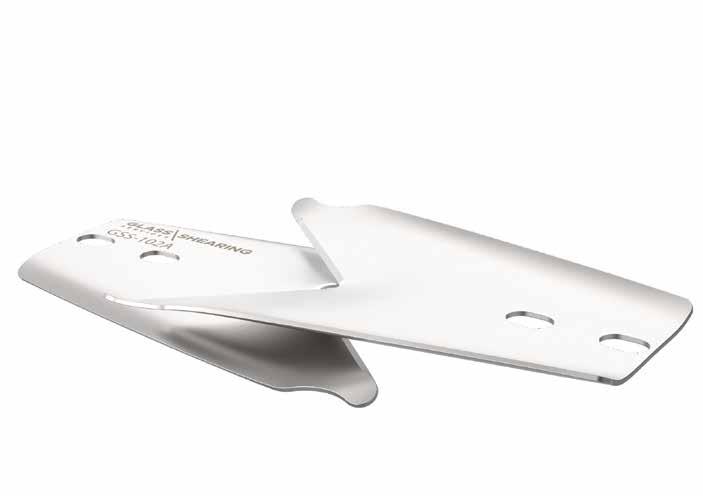
Conclusion
The soda ash market has seen extreme volatility in the recent past. It seems that this volatility is likely to continue with both opportunities and also likely some challenges ahead.
asianglass AG 22-6 www.asianglass.com 54 ANALYSIS: Soda Ash
widely debated, even locally in China.
A prolonged Russia/Ukraine conflict is likely to lower soda ash demand growth over the medium term as a result of a slowdown
-40% -30% -20% -10% 0% 10% 20% 30% 40% 50% 60%
GLASS SERVICES SHEARING We make shear blades. So you can make hollow glass. www.pennine.org sales@pennine.org +44 (0)1484 864733 A division of:
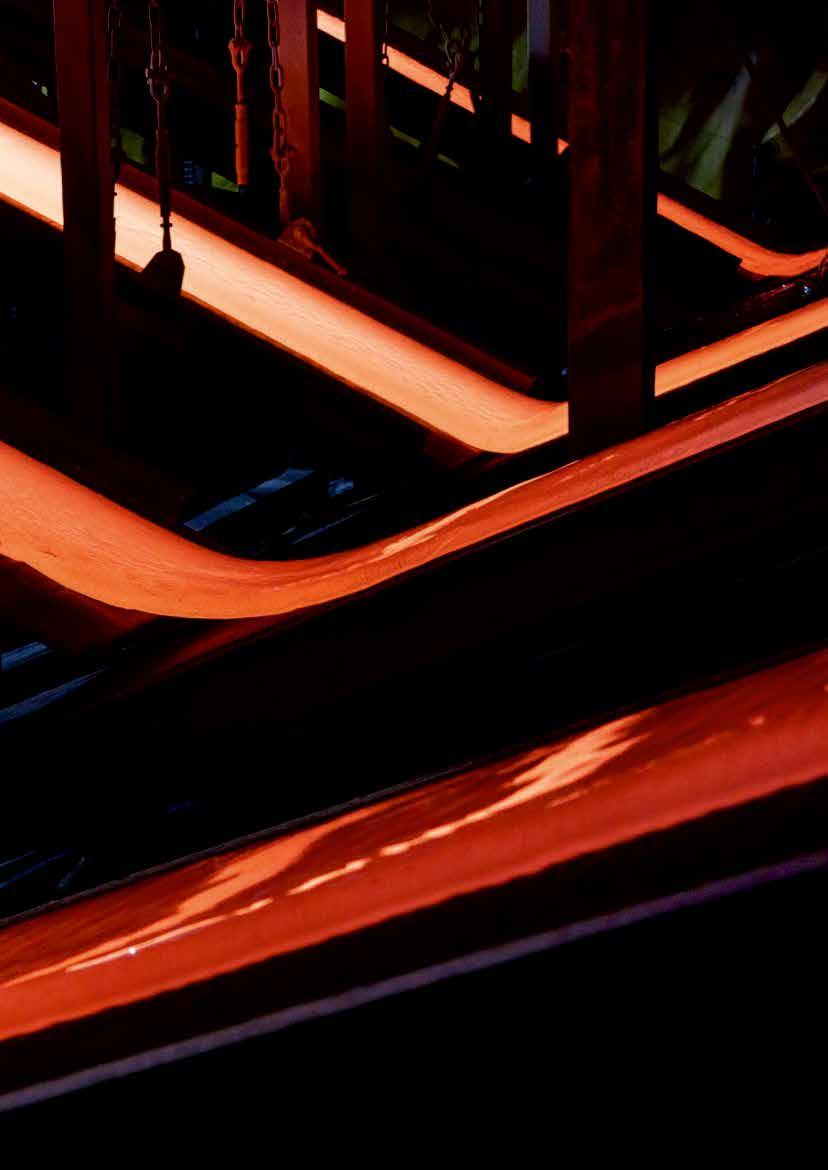
Float glass decarbonisation
Melting and glass furnace operation using alternative energy systems
As climate change progresses and carbon neutrality is required by 2045, our current reliance on foreign fossil fuel imports underscores the need to switch to renewable energies and new technologies.
How can the energy intensive float glass industry so far heavily dependent on natural gas become carbon neutral by 2045?
The energy efficiency of glass production is already close to what is physically-technically feasible today. Carbon neutrality can only be achieved by shifting to new key technologies and sustainable raw materials to avoid process-related emissions.
According to current surveys by the Federal Association of the German Glass Industry (Bundesverband Glasindustrie e.V. – BV Glas), up to 7.4 million tonnes of glass are produced annually in Germany. The final energy consumption required for this stood at 19.1 TWh in 2020, of which 15.1 TWh were generated by means of fossil fuels, especially natural gas, and the remaining 4 TWh by electricity.
Every year 3.9 million tonnes of CO2 are emitted by systems subject to Emissions Trading, i.e., by glass melting and downstream combustion processes. An additional process related million tonnes of CO2 are generated by the thermal decomposition of the carbonate raw materials. The energy efficiency thus achieved is remarkable nonetheless: while some 100 years ago the production of one tonne of glass still required 6,000 kWh, today less than 1,000 kWh suffice. While in former times approximately three tonnes of CO2 were emitted per tonne of glass, it is less than 500 kg today. There is not a lot more to be saved here, which is why carbon neutrality requires a consistent shift to new technologies and renewable energy. According to BV Glas, the glass industry currently covers some 75% of its total energy demand by natural gas.
In Europe float glass, for instance, is mostly produced in cross-fired regenerative furnaces where the batch is molten at constant process
temperatures of around 1,650°Celsius over the complete life of the furnace, ideally at least 15-20 years.
Many of the major glass producers and associations are already conducting in-depth studies into sustainable transformation options, such as Saint-Gobain, for instance. This company is currently examining and will still be until 2025, how its production at the Herzogenrath site might become carbon neutral. They see the highest potential in using regeneratively produced, green hydrogen for glass manufacturing.
Energy savings could still be achieved in processing as well as by energetically optimised energy use and supply at the site. The project is being modelled in cooperation with the city of Herzogenrath, neighbouring communities and numerous institutes like the ‘Gas- und Wärme-Institut Essen e. V.’ (Gas and Heat Institute), the ‘Institut für Technische Thermodynamik’ (Institute for Technical Thermodynamics), the ‘Institut für Industrieofenbau und Wärmetechnik’ (Department for Industrial Furnaces and Heat Engineering) as well as the ‘Institut für Stromerzeugung und -speicherung’ (Institute for Power Generation and Storage) of RWTH Aachen. If the model test is successful, the site could be climate-neutral starting in 2030.
Last August, the NSG Group Company (Pilkington Glass UK) reported the successful float glass production with the help of hydrogen as a fuel. The trial was run at Pilkington’s furnace in St. Helens (nominal load of approx. 800 tonnes of glass per day) in two stages: in the first stage one part of the furnace was fired with 100% hydrogen, replacing 20% of the natural gas volume in total. In the second stage hydrogen was admixed to the natural gas in all burners of the furnace. Due to the limited hydrogen supply its total
asianglass AG 22-6 www.asianglass.com 56 ANALYSIS: What Next For Float Glass
decarbonisation
share was limited to 15% in this stage of the trial.
A permanent shift could only be realised based on a comprehensive network of hydrogen pipelines – otherwise the road transport would counteract the desired climate neutrality. Pilkington’s initiative forms part of the ‘HyNet Industrial Fuel Switching-Project’ to decarbonise industrial processes in the North-West of Great Britain.
Key technologies now being researched
Existing manufacturing processes in the glass industry are already highly optimised to manufacture glass in a consistent quality and with low pollutant emissions. In view of the targets agreed in the Paris Climate Agreement and growing social pressure, the glass industry is doing in-depth research across its entire process chain. The option that seems obvious would be the 100% use of green power (also to avoid conversion losses), but for physical reasons not all
types of glass can be molten electrically and electric furnaces are still limited in size. The furnaces usually operated in the float glass industry cannot be fully electrified at present. BV Glas estimates that it is more probable for furnaces of this size to focus on hybrid technologies that additionally rely on green hydrogen as a fuel.
There are two key technologies on the horizon that might replace the existing base by 2045:
• Fully electric melting furnaces that melt the batch by introducing electric energy via electrodes. The use of regenerative power alone does currently not suffice to fire bigger melting units.
• Hybrid furnaces also using hydrogen could get up to 80% of the energy required for melting electrically via electrodes and get the remaining energy by burning hydrogen. Questions regarding the supply, availability and economic viability of green hydrogen are still unanswered at the moment.
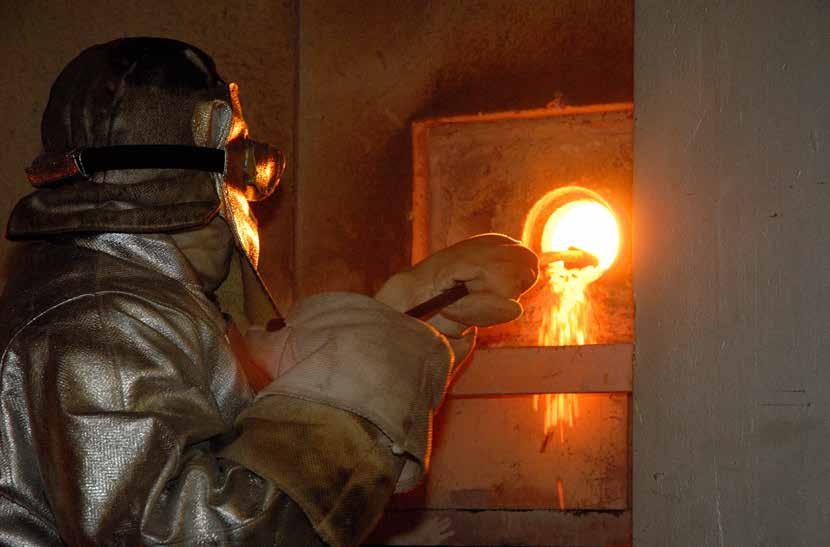
57 AG 22-6 asianglass www.asianglass.com
ANALYSIS: What Next For Float Glass
Roadmap: Which technology is expected when?
By 2025
100% operation of conventional melting furnaces
Late 2020s
Installation of first hybrid furnaces with hydrogen firing

From 2030
• Shift to hybrid furnaces with hydrogen firing
• Use of fully electric melting furnaces
By 2045
Complete replacement of natural gas-fired melting furnaces
Source: BV Glas
Despite all roadmaps, the aforementioned key technologies are still under research, but the possible effects in case of a successful shift can already be calculated for the float glass industry as follows according to BV Glas:
• Decline in absolute CO2 emissions by 75%.
• The share of process-related CO2 emissions from the thermal decomposition of so far non-CO2-neutral raw materials would remain unchanged. The possible use of CO2-neutral raw materials must therefore become the subject of research. The potential savings achieved by using more cullet is very limited in the float glass industry in Germany. Contrary to widespread opinion, float glass cullet in Germany is recycled almost completely, but only 11% in float glass production. The greater part is reused in the container glass and glass wool industry. BV Glas is currently preparing a publication on this topic.
• The specific energy consumption decreases slightly but with an altered mix of regeneratively produced power and green hydrogen.
• Manufacturing costs will rise by 70% because energy costs are expected to triple compared to 2020 – the effects of the Ukraine crisis have not been factored into this estimate yet.
Long term the successful installation of a circular material economy that functions cradle to cradle would offer savings potentials – the buzzword here being buildings as ‘material banks’.
Impact on production processes and product quality
As part of the ‘HyGlass’ project the Federal Association of the Glass Industry (BV Glas) and the Gas and Heat Institute (Gas- und WärmeInstitut Essen eV – GWI)) are studying the impact of using hydrogen as a fuel on the extremely sensitive process of glass production, product quality and pollutant emissions. This study
CARBON NEUTRALITY CAN ONLY BE ACHIEVED BY SHIFTING TO NEW KEY TECHNOLOGIES AND SUSTAINABLE RAW MATERIALS TO AVOID PROCESS-RELATED EMISSIONS
includes both a view of all processes when increasing amounts of hydrogen are admixed to natural gas and the 100% use of green hydrogen along the entire glass production chain.
The HyGlass Project here focuses on studying the impact of hydrogen on regenerative melting furnaces and the downstream combustion processes, for instance in the feeders used in the container glass industry. This makes sense since the European gas industry plans to directly feed a rising percentage of hydrogen into the natural gas grid in addition to building dedicated hydrogen infrastructures in future. Then the production plants in the glass industry will also be supplied with a mix containing significant amounts of hydrogen and therefore featuring combustion properties different to natural gas – producing an impact on product quality, pollutant emissions and possibly on the plant lifecycle.
The impact of all this is specifically studied by HyGlass, especially in terms of combustion, which plays an important role in many process steps, in melting and in the so-called feeders which transport the molten glass and where it is homogenised for moulding. The melting process is the most energy-intensive part of glass production, and the feeder is often decisive for high product quality. One anticipated difficulty here is that melting furnaces and feeders will differ substantially in technical terms and also in terms of size and energy needs.
asianglass AG 22-6 www.asianglass.com 58
ANALYSIS: What Next For Float Glass


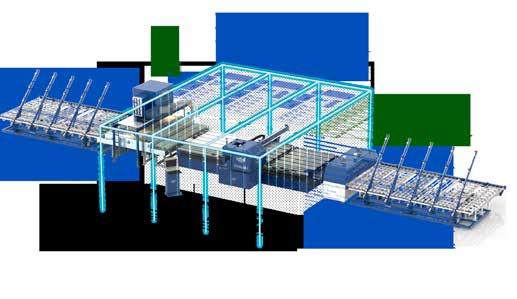
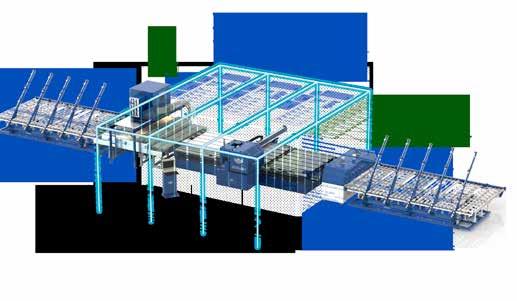






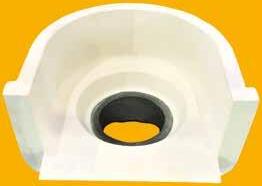




AUTOMOTIVE COMMERCIAL REFRIGERATION ARCHITECTURE HOME APPLIANCES GO DIGITAL! THE RIGHT DIGITAL SOLUTION FOR EVERY GLASS APPLICATION. www.tecglassdigital.com comercial@tecglass.es +34 986 78 76 27
While in the melting furnace burner systems with non-premixed flames and high air preheat temperatures or oxy-fuel burners are used, feeders use numerous small burners with premixed flames mounted to the side walls. Accordingly, the effects of higher hydrogen contents in natural gas need to be assessed differently. While with feeders, process control and possible flame flashbacks are especially relevant questions, the priority aspects for melting furnaces are efficiency, heat transmission and nitrogen oxide emissions (NOX).
The necessary product quality is influenced both in the feeder and in the melting furnace. Initial results of the studies indicate that the effects of hydrogen on combustion are manageable, but that previously fine adjusted measuring and control technologies are required. The thermal nitrogen oxide emissions (NOX) can rise with a higher hydrogen content, but the proven measures for NOX reduction should continue working
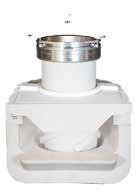
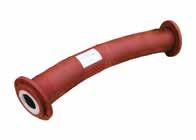

once adapted.

In the light of these studies, it would make sense to bring these two key technologies – fully electric and hybrid melting furnaces with hydrogen – to market maturity as soon as possible – in cooperation with the plant and component manufacturers already operating in Germany and Europe whose expertise should be incorporated into a national strategy.
A global challenge is our consistent departure from fossil energies and the speedy installation of infrastructure for regenerative power along with the connection of glass industry sites to a hydrogen infrastructure yet to be created. Here political foresight and planning are also an imperative –also in view of the long investment cycles. To achieve full carbon neutrality plenty of research in sustainable raw materials is still needed in addition to this and the creation of a reliable circular economy.
Article courtesy: glasstec









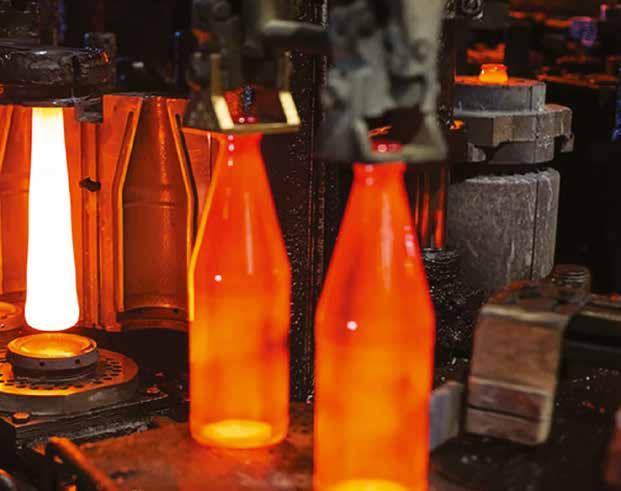
asianglass AG 22-6 www.asianglass.com 60 ANALYSIS: What Next For Float Glass
REFMON Co. Ltd. Hungary · H–9246 Mosonudvar · Bereki út 1. T.: +36 70 424 9439 • info@refmon.hu www.refmon. We are the only one... Hot end Refractories Metering Spout Syspatented rotor tubes Gob-forming precast shapes Orifice ring long Contact us! Batch plant Wear protection Linings represented by: www.mglassfactoryservices.com
































































































































































































ASIA... is one click away www.asianglass.com
In focus
INTERVIEW WITH PHILIPP ZIPPE
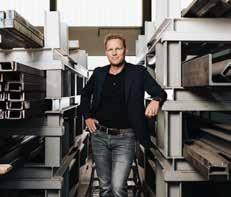
Zippe is one of the leading manufacturers of batch and cullet plants in the global glass industry. Founded in 1920, the Germany-based, fourth-generation owneroperated company offers a comprehensive range of services, from planning to commissioning. Over the past 100 years, it has designed and implemented more than 600 batch plants and more than 1,000 cutting plants in compliance with customer requirements. In an exclusive interview with Asian Glass, Philipp Zippe, CEO, discusses how the company has consistently fulfilled its promises for over a century.
The last 24 months have been challenging for the industry overall. How has Zippe dealt with these challenges?
Firstly, the COVID-19 crisis changed the way we executed projects and acquired new business. Although moving into the digital space worked remarkably well – better than expected – not all processes can be digitalised. For many we need to be on site to see the physical conditions and obviously for erection and commissioning, although we also offered remote commissioning services. Many of these measures will have an enduring effect on business and communication. Luckily, a positive one.
Then there were the supply-chain challenges, which worsened with the Russian war in Ukraine. We have increased our stock to ensure delivery and utilise alternative sourcing methods (including online) to obtain the necessary, especially electronic products. Lead times in general became longer. Now things seem to be moving in the right direction, e.g., steel prices decreasing.
Do you think COVID-19 and the current political and economic turmoil around the world have led to the company reflecting on its priorities?
Yes and no. Personally one obviously looks at life differently but, as a company, we have a certain set of principles that are not subject to outside influence. We remain optimistic because we can all influence the future in our own way.
In fact, you will have noticed that, in the midst of
the pandemic, we updated and modernised our corporate design. I see this as being symbolic of our positive attitude and being “ready for tomorrow”.
…and how has this affected product development and capacity expansion?
Actually, our aim was to maintain and even strengthen our workforce during the COVID-19 years. We are positive about the future of glass and will increase our efforts in R&D and energy efficiency.
How has the war in Ukraine and the subsequent energy crisis affected business?
The Russian war has impacted our clients in Ukraine with previously unknown severity – even destruction of their production facilities. Luckily our direct exposure to these markets has been low but the increase in energy pricing, incl. EU-goals and targets for CO2-reduction affects our industry as a whole and increases efforts towards further strengthening energy-efficiency. Most important to us, however, is that the suffering ends.
Your company has supplied over 650 batch plants and over 1,100 cullet plants on an international basis. Are we likely to see more of these operations in the near future?
Most definitely, currently we are working on projects on all continents (except Antarctica) most of which I can’t speak about but suffice to say that we are very busy these days. You will have seen that our slogan is ‘right from the start’ and, aside from the fact that our batch plants are at the start of the glass making process, I think
62 asianglass AG 22-6 www.asianglass.com CORPORATE PROFILE
Philipp Zippe
the customers know that they are ‘right’ to choose Zippe. In addition, the first steps in a project, i.e the engineering and design are key to its success and our experience and expertise ‘right from the start’ is what sets us apart. At this point I would also like to thank our customers for their trust and collaboration, which is key to the success of all projects.
What is your opinion of the markets in Asia at the present time, in particular India and China, which are the biggest players in the region?
South-East Asia and India have been important markets for us for decades. During COVID-19 we could not travel in the region as much as we wanted to. China is probably the largest glass producer worldwide, but it is also increasingly protected, also due to the ongoing COVID-19 measures. But we actively service our customers in all the ASEAN countries. These, including India, have a very big potential. In fact, we are currently finalising a large project for a major pharmaceutical producer in India.
Zippe is considered to be the world’s leading supplier of batch and cullet systems to the international glass industry? Do you have any strategies for staying ahead of the competition or simply managing your position. Well, for success there are always several parties involved, most importantly, our customers. However, let me try to answer this in two parts.
Firstly, it has to do with our heritage. From the word go, Zippe has been future oriented. For example, my great grandfather, Alfred Zippe, designed, built and installed the first batch charger in Germany and went on to develop the first automatic batch chargers. Several innovations followed: the first automatic cullet return system, cullet crushers, scraping conveyors, glass level control systems and the first of many automatic batch plants and weighing lines for float glass. This pioneering spirit is part of every project we are involved in.
Secondly, it is a matter of specialisation. We live and breathe batch and cullet. We focus all our efforts on engineering and supplying the best batch and cullet solutions for the glass maker. Many other players
(for whom we have a high regard) offer a wide range of other products, but we find that the batch and cullet field in itself is so broad and exciting, that we have honed our skills in this area.
Considering the growing importance of environmental issues, what is your policy on reducing waste and energy consumption, and what steps are you taking to implement it? I would go so far as to say that sustainability is part of Zippe’s DNA. So much of what we do is directly geared to recycling material and to lowering emissions.
The most obvious is our factory cullet recycling equipment range – crushers, scraping conveyors, etc – technology geared to maximise the usage of raw materials, avoid wastage and minimise energy usage. Zippe also offers a range of equipment and technology for post-consumer glass recycling, hollow and flat.
Then our batch chargers, for example the Vibrotube’s heat protection shield seals the doghouse completely, ensuring a dust free encapsulation of the doghouse and eliminating uncontrolled inflow of air, resulting in a significant reduction of NOX emission. We also have a wide range of chargers for electric furnaces.
Additionally, an unsung hero of sustainability is batch preheating, where we see ourselves as pioneers. By using waste gasses from the melting process to preheat batch and cullet, melting energy requirement can be reduced by up to 15%. Simultaneously, CO2 emissions can be reduced considerably, and the capacity of production increased. Certainly worthwhile considering.
I could carry on, but this gives you the general idea of how important the subject is to us. Incidentally, at Zippe we have been using solar power for 20 years or so and our Wertheim facilities have been largely heated by geothermal energy for over 10 years.
63 AG 22-6 asianglass www.asianglass.com CORPORATE PROFILE
We focus all our efforts on engineering and supplying the best batch and cullet solutions for the glass maker.
How has the year 2022 been for you? In what ways have you achieved your goals this year, and what are the remaining goals you have in mind?
The year 2022 has been an extraordinary year in terms of new projects. The strong demand apparently accumulated over the COVID-19 years, which resulted in a record-activity level in the glass industry this year. However, we are affected by some price increases because of the longer-term nature of our projects but given the challenges around the world, we must be thankful for the positive situation. Glass is still going strong.
You are an owner-operated company that has been in business for more than 100 years. Is it possible that you may become more active in acquiring additional capacity through acquisitions in the future?

Yes, we certainly see ourselves as a large family and you probably know that our family has extended to include the companies MMB and Lahti Glass Technology Oy. Each have brought a meaningful contribution in terms of expertise and market know-how. Lahti, for example, not only has expertise in the float sector but also in the sector glass fibre sector, where it has proprietary technologies.
What are your top three challenges and potential market opportunities for the next three years?
The reduction of our environmental footprint is probably the number one, two, and three priority for our industry. However geographically there are opportunities, for example, Africa, a continent that could have a promising future.
In closing, if you could make one wish for your company in the coming 12 months, what would it be in terms of economics, production, or politics? It would be that reason, tolerance, compromise, and, maybe this sounds banal, and kindness is a foundation for action. We share this period of time here together, let’s make the best out of it.
IR Cameras. Pyrometers. Accessories. Software. We measure temperature non-contact from –50 °C to +3000 °C. Visit: www.optris.global
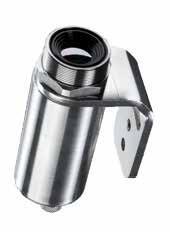
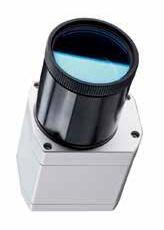
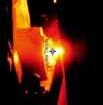
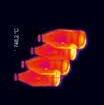
Our affordable and fixed installed longwave and shortwave IR cameras with analog/digital outputs are ideal for industrial and R&D applications.
when temperature matters
64 asianglass AG 22-6 www.asianglass.com CORPORATE PROFILE
On target.
Asian Glass Editorial & Distribution Schedule
AG22-5
■ Greenfield options for container glass
■ Thailand: an industry in focus
■ Trade or make? Flat glass dilemmas for Asia
■ Chinese automotive glass
■ STATE PROFILE: Maharashtra in focus
Bonus Distribution: AFGM 2022
AG23-1
■ Central Asian Flat Glass: An analysis
■ VIPV prospects: driving on sunshine
■ The Turkish container glass industry: what drives it
■ Glass tableware in ASEAN: examining the sector's increasing popularity
■ TECH FOCUS: Lithium market demand and supply
Bonus Distribution: Glassman Europe 2023
AG23-2
■ IGU markets and issues
■ Glass Packaging: insights into a rapidly expanding sector
■ Refactory Raw Materials: A stimulating analysis
■ Automotive Glass in Thailand
■ STATE PROFILE: Uttrakhand
Bonus Distribution: GLASSPRINT 2023, INTERPAC 2023, WINDOOREX 2023, GLASSMAN SOUTH AMERICA 2023
AG23-3
■ ASEAN Float Glass Demand
■ Ultrathin Glass: Evaluating the growth
■ Indian Flat Glass Industry: Analysing the key trends
■ Container glass industry in GCC region
■ TECH FOCUS: Armoured glass supply and demand
Bonus Distribution: Big 5 Egypt 2023, China Glass 2023, GPD 2023, Intersolar 2023
AG22-6
■ Indonesia: benders and shapers
■ Beverage packaging trends
■ Thin glass in façade construction
■ Scale of the problem: thin glass upgrades
■ TECH FOCUS: What next for flat glass?
Bonus distribution: Iran Glass 2023
FREE WITH THIS ISSUE - THE 2023 YEARPLANNER!
AG23-4
■ Vietnam Glass Expansion
■ Cosmetics & Perfumery glass industry in GCC region
■ Automotive Glass In India: focusing on the key trends
■ Intelligent Coatings in Glazing & Packaging
■ STATE PROFILE: Gujarat
Bonus Distribution: Glassman Asia 2023, Glasspro India 2023, Unitecr 2023, Vitrum 2023
AG23-5
■ Challenges for Indian Container Glass industry
■ AFGM
■ Thailand In Focus
■ Safety in glass manufacturing
■ TECH FOCUS: Emissions reductions in Asian glass furnaces
Bonus Dist: AFGM 23, Glass Eurasia 23, Glasstech Asia 2023, Glassbuild USA 23, Gulf Glass 23, ZAK Glasstech 23
AG23-6
■ Bangladesh: A Rising Glass Market

■ Solar Glass industry in Asia ( sans China)
■ Container Glass v Can/Metal Packaging in ASEAN Countries
■ Optical glass demand and supply
■ STATE PROFILE: Rajasthan
Bonus distribution: Iran Glass 2024
FREE WITH THIS ISSUE - THE 2024 YEARPLANNER!
Maximise your exposure, maximise your budget… find out how by contacting:
Paul Russell, Tel: +44 (0) 208 638 0619
Email: prussell@asianglass.com
Valerie Adamson, Tel: + 44 (0) 208 133 5273
Email: vadamson@asianglass.com
● ● ● ● ● ● ● ● ● ● ● ● ● ● ● ● ● ● ● ● ● ● ● ● ● ● ● ● ● ● ● ● ● ● ● ● ● ● ● ● ● ● ● ● ● ● ● ● ● ● ● ● ● ● ● ● ● ● ● ● ● ● ● ● ● ● ● ● ● ● ● ● ● ● ● ● ● ● ●
● ● ● ● ● ● ● ● ● ● ● ● ● ● ● ● ● ● ● ● ● ● ● ● ● ● ● ● ● ● ● ● ● ● ● ● ● ● ● ● ● ● ● ● ● ● ● ● ● ● ● ● ● ● ● ● ● ● ● ● ● ● ● ● ● ● ● ● ● ● ● ● ● ● ● ● ● ● ●
● ● ● ● ● ● ● ● ● ● ● ● ● ● ● ● ● ● ● ● ● ● ● ● ● ● ● ● ● ● ● ● ● ● ● ● ● ● ● ● ● ● ● ● ● ● ● ● ● ● ● ● ● ● ● ● ● ● ● ● ● ● ● ● ● ● ● ● ● ● ● ● ● ● ● ● ● ● ●
● ● ● ● ● ● ● ● ● ● ● ● ● ● ● ● ● ● ● ● ● ● ● ● ● ● ● ● ● ● ● ● ● ● ● ● ● ● ● ● ● ● ● ● ● ● ● ● ● ● ● ● ● ● ● ● ● ● ● ● ● ● ● ● ● ● ● ● ● ● ● ● ● ● ● ● ● ● ●
● ● ● ● ● ● ● ● ● ● ● ● ● ● ● ● ● ● ● ● ● ● ● ● ● ● ● ● ● ● ● ● ● ● ● ● ● ● ● ● ● ● ● ● ● ● ● ● ● ● ● ● ● ● ● ● ● ● ● ● ● ● ● ● ● ● ● ● ● ● ● ● ● ● ● ● ● ● ●
● ● ● ● ● ● ● ● ● ● ● ● ● ● ● ● ● ● ● ● ● ● ● ● ● ● ● ● ● ● ● ● ● ● ● ● ● ● ● ● ● ● ● ● ● ● ● ● ● ● ● ● ● ● ● ● ● ● ● ● ● ● ● ● ● ● ● ● ● ● ● ● ● ● ● ● ● ● ●
● ● ● ● ● ● ● ● ● ● ● ● ● ● ● ● ● ● ● ● ● ● ● ● ● ● ● ● ● ● ● ● ● ● ● ● ● ● ● ● ● ● ● ● ● ● ● ● ● ● ● ● ● ● ● ● ● ● ● ● ● ● ● ● ● ● ● ● ● ● ● ● ● ● ● ● ● ● ● ●
● ● ● ● ● ● ● ● ● ● ● ● ● ● ● ● ● ● ● ● ● ● ● ● ● ● ● ● ● ● ● ● ● ● ● ● ● ● ● ● ● ● ● ● ● ● ● ● ● ● ● ● ● ● ● ● ● ● ● ● ● ● ● ● ● ● ● ● ● ● ● ● ● ● ● ● ● ● ● ●
A wealth of exciting opportunities… ✷ ON-PAGE: full and half display advertising ✷ DIGITAL: full and half display advertising…and more! ✷ DUMMY COVERS: the ultimate, high impact creative… take ownership of the issue ✷ BELLY-WRAPS: high profile, hard-hitting message conveyance www.asianglass.com The AG Yearplanner! FREE INSIDE
AG Yearplanner! FREE INSIDE
The
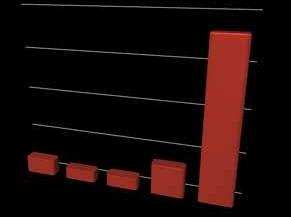
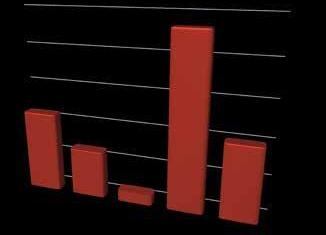
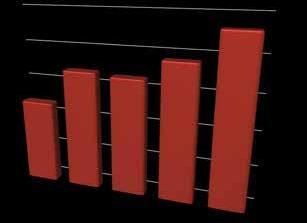
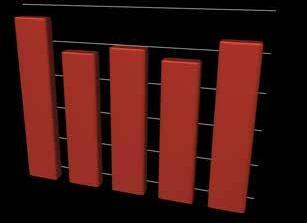




















66 asianglass AG 22-6 www.asianglass.com 2018 121,197 2019 128,658 2020 324,035 2021 1,631,334 Glass; multiple-walled insulating glass units - Exports (USD) Table 1 2017 396,645,426 2018 385,816,378 2019 373,551,915 2020 425,944,657 2021 394,444,277 1 Glass, float glass and surface ground/polished glassExports (USD) 2019 15,798,048 2020 18,336,664 2021 22,224,305 Glass mirrors, whether or not framed - Exports (USD) Table 1 2017 9,449,758 2018 7,752,268 2019 8,133,165 2020 7,662,015 2021 8,708,626 2 Safety Glass - Exports (USD)
Window on INDONESIA
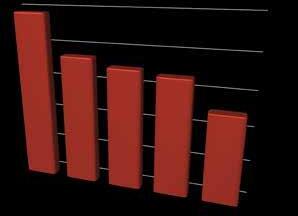
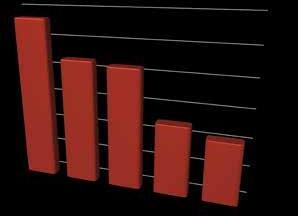
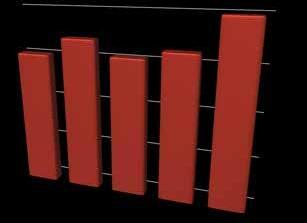
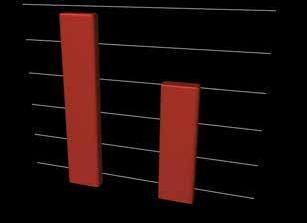
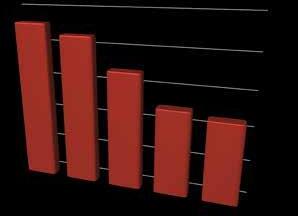
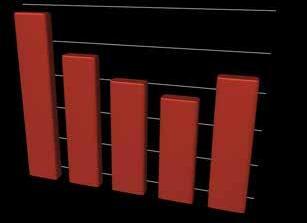
67 AG 22-6 asianglass www.asianglass.com 19,412,108 2018 14,850,737 2019 13,921,577 2020 13,422,077 2021 10,072,605 Glass mirrors, whether or not framed - Imports (USD) 2018 8,699,403 2019 8,453,265 2020 4,975,848 2021 4,290,144 Glass; multiple-walled insulating glass units - Imports (USD) 2018 17,760,736 2019 16,038,312 2020 16,930,499 2021 20,766,375 7 Safety Glass - Imports (USD) Table 1 2017 0 2018 136,093,495 2019 0 2020 90,255,613 2021 0 6 Glass, float glass and surface ground/polished glassImports (USD) Table 1 2017 73,173,142 2018 68,543,865 2019 54,408,840 2020 39,933,008 2021 37,150,934 5 Glass used in kitchen, office or similar - Exports (USD) Table 1 2017 32,918,888 2018 25,717,457 2019 21,752,134 2020 19,541,822 2021 23,896,640 Glass used in kitchen, office or similar (USD) Import
Refractory Zone
Morgan wins 2021 TRI Chairman’s Safety Award
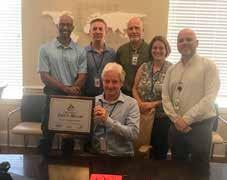
Morgan Advanced Materials won the 2021 TRI Chairman’s Safety Award at the Refractories Institute annual spring meeting.
The award, based on an independent survey, assesses the number of safety incidents per hours worked. With significant progress shown and an impressive record Morgan has demonstrated a real commitment to safety on the journey to ‘zero harm’.
Erik Duloisy, managing director, Americas shared on behalf of the team: “We are honoured to receive this safety award from TRI. This is the recognition from our peers in the industry that Morgan is committed to the safety of its employees, customers, contractors, and end users. We are very proud of this win, which
recognises the team’s safety efforts.”
Craig Addington, CEO, The Refractories Institute, commented on Morgan’s award win: “The safety of employees is the highest priority, and each year, The Refractories Institute (TRI) recognises member companies that have demonstrated the highest level of safety.
“The TRI Chairman’s Safety Award is given to those member companies with the least amount of man hours lost due to injury. TRI is pleased to recognise Morgan Advanced Materials as a recipient of the 2022 Chairman’s Safety Award.”
Morgan Advanced Materials is a manufacturer of specialty materials that include carbon, advanced ceramics, and composites. It is
RHI Magnesita to buy DBR’s Indian refractory
RHI Magnesita has agreed to buy the Indiabased refractory business of Dalmia Bharat Refractories (DBR). The acquisition will take place via a share swap agreement in exchange for 27million shares in RHI Magnesita India. The Austria-based refractory manufacturer hopes to grow its presence in the Indian market and benefit from market synergies. DBR employs approximately 1200 people in India. It has a production capacity of over 300,000 tonnes per year of refractory and operates five refractory plants and raw material sites.
The acquisition will add production capacities in industrial regions in the south and west of
India where RHI Magnesita currently has no assets. No completion date for the transaction has been disclosed.
Stefan Borgas, CEO, RHI Magnesita, said: “We see material financial and operational benefits from the addition of the Dalmia Bharat Refractories business to our existing network, which will enable us to increasingly serve our customers with a ‘local for local’ approach in India and offer a broader range of products, in particular in the Industrial segment, in which RHI Magnesita is currently under-represented.
“This transaction demonstrates our ability to continue to grow our business in India where
business
the outlook for the refractory industry is strong, at a time when demand in other geographies is weakening.”
A global supplier of refractory products, systems and services, RHI Magnesita is headquartered in Vienna, Austria. The company is listed on the London Stock Exchange and is a constituent of the FTSE 250 index.
Dalmia Bharat Refractories is the refractories division of Dalmia Bharat Group. With origins going back to 1939, the Group is one of India’s oldest business conglomerates, encompassing interests in cement, sugar, power, as well as refractories.
Shinagawa enters into licence agreement with Hefeng of China
Shinagawa Refractories (Shinagawa), a global supplier of refractory solutions, has signed a Know-How License Agreement for continuous casting refractory products and services with China refractory producer Anshan Hefeng Refractory Material (Hefeng).
Shinagawa and Hefeng jointly established a mould powders JV, Liaoning Shinagawa Hefeng Metallurgical Material in 2008. Through the JV, Shinagawa and Hefeng have achieved a predominant market share as spraydried mould powders for major steel producers in China.
Masayuki Negishi, division manager of Shinagawa Overseas Business Planning, said:
“Shinagawa is fully committed to supporting essential industries worldwide, and this Agreement with Hefeng accelerates further enhancement of our proximity for customers in China. This Agreement is particularly targeted at the world’s largest steel producing country, and, more than ever, Shinagawa is ready to serve all the needs of refractory solution for high quality steel.”
Shinagawa, a Japanese company headquartered in Tokyo, is one of the largest refractory suppliers in the world. The company was established in 1875 as a first private fire brick company in Japan.
Established in 1999, Anshan Hefeng Refractory Material is a private enterprise specialising in R&D, design, production and sales of metallurgical refractory materials, flux accessories and alloys. The company is located in Anshan, Liaoning, known as an important steel base in China and has the reputation of “Steel Capital.” It covers an area of about 80,000 square meters, 450 employees, refractory shaped products, unshaped refractory materials, large refractory preforms, various flux materials, three continuous casting functional materials and alloys and other products, and its annual production reached nearly 100,000 tonnes in recent years.
68 asianglass AG 22-6 www.asianglass.com Anaylsis
headquartered in Windsor, United Kingdom. The company is listed on the London Stock Exchange and is included in the FTSE 250 Index.
United States/ United Kingdom India
Japan/China
Primetals Technologies blast furnace replacement technology
Primetals Technologies is developing a new green steel technology to replace blast furnace plants and has signed a collaboration contract with RHI Magnesita, the global leader in refractory innovations.
The new solution is called the Smelter, a furnace powered by electrical energy and used for melting and final reduction of direct reduced iron (DRI). Operated together with a direct reduction plant and an LD converter (BOF), the Smelter is producing hot metal for the steelmaking plant and liquid slag that can be used in the cement industry.
The conventional BF– LD converter route results in almost two tons of CO2 per tonne
of liquid steel. Thanks to the new technology, CO2 emissions will be reduced by a factor of six, to 0.33 tonnes of CO2 per tonne of liquid steel.
Constantin Beelitz, president Europe, CIS & Turkey at RHI Magnesita, said: “If you are serious about green steel, you have to start with the blast furnace processes, i.e. where the CO2 emissions are massive. RHI Magnesita has been working closely with both steel and nonferrous industries around the world for years. We are proud to be an integral part of the push for the development of green steel production solutions together with Primetals Technologies, not only as supplier of refractories but also as a
technology partner.”
Gerald Wimmer, vice president of converter steelmaking, Primetals Technologies, said: “RHI Magnesita and Primetals Technologies have extensive experience in the development of new technologies. That is an excellent base for successfully developing just the right technology for steel producers who struggle to find a replacement for the blast furnace.”
Engineering and plant construction company Primetals Technologies Limited is headquartered in London, United Kingdom, and has a presence all over the world. As a metals company, it serves both ferrous and nonferrous metals customers.
Saint-Gobain sustainability action gets ecovadis certification
Saint-Gobain announced the results of the 2022 evaluation of its sustainability actions by the independent organisation ecovadis.
With a score of 57/100, the company’s three US plants in Worcester, Niagara Falls and Latrobe have obtained silver ecovadis certification. This puts the plants in the 73rd percentile
of companies within their sector in terms of sustainability.
Ecovadis is an independent organisation that evaluates companies’ corporate social responsibility (CSR) performance according to four main criteria Environment, Social & Human Rights, Ethics and Responsible Purchasing.
Saint-Gobain said it was pleased to have achieved a silver ecovadis rating for its activities and manufacturing of refractory products and technical ceramics at it US based sites and that this was a 16% improvement of its ecovadis rating compared to 2019 and shows its commitment to ESG and sustainable development.
Siam Refractory Industry aligns with Sri Trang Gloves
A memorandum of understanding on environmental management was signed by the Siam Refractory Industry Company Limited under Circular Plus by CPAC Green Solution and Sri Trang Gloves (Thailand) Public Company Limited during a ceremony held to facilitate the management of waste materials from industrial plants according to a circular economy model.
SRCI has signed a Memorandum of Understanding (MOU) regarding environmental management in accordance with the Circular Economy with Sri Trang Gloves (Thailand) Plc (STGT).
The signatory team included Visut Chongcharoenkit, director of Green Circularity Business Group, CPAC Green Solution and Malee Thanapempulpol managing director, The Siam Refractory Industry Co., Ltd, together with Wittanat Sincharoenkul, director and chairman of the Corporate Governance and Sustainable Development Committee from Sri Trang Gloves (Thailand), Aumaporn Charoensak, waste
circularity business director, CPAC Green Solutions and Vitchaphol Sincharoenkul, director and sustainable development committee member, Sri Trang Agro-Industry, witnessed this event.
Sri Trang Gloves (Thailand) uses the principle of resource management in order to achieve maximum efficiency. To produce high-quality latex gloves, it is necessary to have a prototype mould in good condition whenever the mould is changed in production each round. In this regard, the company is seeking a partner who can assist with handling this mould material without disposal in order to maximise its benefit.
While Siam Refractory is the world’s leading manufacturer of refractory materials used in high temperature furnace industries such as steel, ceramic, cement, rubber and electricity under the SRIC brand. The company has a concept based on over 69 years of experience in High Temperature Technology and Management quality from a variety of raw materials to create a renewable resource management according to the Circular Economy.
In the past, the Siam Refractory Industry has been continuously researching the use of recycled materials as raw materials in refractory manufacturing through the development of research into the properties of raw materials, the creation of processes to improve the quality of recycled materials for the use as renewable materials, including setting up a quality management structure so that a variety of raw materials can be used while maintaining a high level of product quality. The company has experience working with a wide variety of recycled materials, including refractory bricks, sanitary ware scraps, insulators, and moulds from the rubber glove industry.
As of today, it is capable of using over 30% recycled materials in certain product groups and continues to study and expand the results to be part of the Circular Plus by CPAC Green Solution to manage industrial waste and waste materials with the aim of maximising the economic and environmental benefits to the country.
www.asianglass.com Anaylsis 69 AG 22-6 asianglass
France Thailand
United Kingdom
HWI receives $3M from UBCD for new markets tax credits
United States
UB Community Development, LLC (UBCD), a community development partner of United Bank, announced the closing of nearly $8 million of new markets tax credit (NMTC) allocation to support the modernisation of the HarbisonWalker International (HWI) plant in Fairfield, Alabama.
HWI is the largest refractory products and services supplier in the US. Its international network spans North America, Europe, and Asia with 21 manufacturing facilities, 20 global sourcing centres, and technology centres in the US and China. Its revitalised Alabama operation will produce world-class magnesia-carbon refractories specifically engineered to optimise efficiency and performance in steel-making applications like steel ladles and low-emission
electric arc furnaces.
Michael Werner, senior vice president, commercial, HWI said: “We are so pleased to be an active member of the Fairfield – Birmingham business community in Jefferson County again and bring jobs to the region. The location is ideal for delivering quality refractory products and high-value services to our customers’ growing steel operations in the southern US.”
The Fairfield facility has been owned by HWI since 1951. The plant was idled in 2019 due to a global lack of demand for carbon bake refractory products used in the aluminium market. The company is now expanding its US manufacturing capabilities of magnesia carbon refractories in response to the increasing needs of its steel customers in the southern US. The
modernised facility will become one of HWI’s most efficient manufacturing facilities, creating 50 highly skilled jobs for the residents of the community and surrounding area.
UB Community Development (UBCD) promotes economic and community development through programmes such as New Markets Tax Credits, affordable housing, and community facilities.
Established more than 150 years ago, HWI is the largest supplier of refractory products and services in the US. Headquartered in Pittsburgh, Pennsylvania, the company’s international network spans North America, Europe, and Asia, with 18 manufacturing plants, 20 global sourcing centres, and the largest refractory industry research facility in North America.
PSR invests in new, onsite battery storage system
United Kingdom
As part of its commitment to operating an environmentally ethical and sustainable business, Parkinson Spencer Refractories has invested in a new, onsite battery storage system.
PSR’s latest investment sees the installation of a battery energy storage system with microgrid technology to make the best use of its renewable electricity resources.
The 250kW/250kWh battery, incorporating a 400kVA MAX voltage optimisation system, is not only capable of supporting its site in the event of a power cut, but enables PSR to use energy more efficiently. The company believes that each step it takes brings it closer to its goal of a sustainable future.
As a manufacturer of refractory materials for the glass container industry, the majority of PSR’s products require sintering on one of its seven high temperature gas fired kilns, at temperatures of up to 1550°C, over periods of seven to 21 days. Any interruption to these firing programmes can cause damage to the product in the kilns and delays to manufacturing schedules. This is because failed kiln firings usually have to be restarted, once product has been allowed to cool naturally, and then inspected for any damage. As such, the company is reliant on continuous energy supplies in the form of gas and electricity.
To protect its equipment, product and production schedules, it approached Powerstar to
provide a solution to its electrical energy supply security. The 250kW/250kWh battery energy storage system, which has now been installed, is capable of powering the PSR site for up to two hours. It will also cover most electricity supply outages, with the majority of these events only lasting for seconds or a few minutes.
The incorporation of the voltage optimisation system provides both economic and environmental benefits, according to PSR. By regulating the electrical supply voltage to the site, the system ensures it only uses the electrical power it needs. This reduces its electricity consumption and its indirect carbon emissions, supporting its drive to operate an ethical, sustainable business.
Calucem plans a $35M investment in US plant
Germany/United States
Specialty cement manufacturer Calucem will enter the US market by developing a $35 million manufacturing facility in eastern New Orleans. Calucem, a subsidiary of Cementos Molins, is the world’s second-largest producer of calcium aluminate cement, a high-performance product applied in a variety of commercial and industrial uses.
The project will create 70 direct jobs and the Louisiana Economic Development estimates the project also will result in 158 indirect jobs, for a total of 228 new jobs for Louisiana’s Southeast Region.
Gov. John Bel Edwards said: “In choosing Louisiana, Calucem recognises our unrivalled logistical advantages for connecting manufacturers to both domestic and foreign markets.
“The site this international company has selected in New Orleans is emblematic of
the state’s many strategic locations for the manufacture and worldwide shipment of products. We welcome this latest foreign direct investment in our diversified economy.”
Calucem plans to develop the facility at a nineacre site on the Industrial Canal. The facility is expected to begin operations in the third quarter of 2023.
Calucem President and CEO Yuri Bouwhuis said: “Calucem is taking on a new investment that will support our growth and diversification in the US and ensure that we continue to offer high-value products to our global customers.
“Our choice of Louisiana for our first all-new manufacturing project in the US is due to the availability of strategic raw materials such as limestone and natural gas, access to waterways and skilled labour, and the long history of using
specialty cement products in the US.”
Cementos Molins, Calucem’s parent company, operates facilities in 12 countries on four continents. The Louisiana project will create its third calcium aluminate production centre, joining Barcelona, Spain, and Pula, Croatia.
Cementos Molins CEO Julio Rodriguez said: “This investment drives the company’s growth in innovative solutions for the construction sector and consolidates Cementos Molins as a world reference in the production of calcium aluminate cement.
“I deeply thank the entire Calucem team for their efforts to announce this operation and the great work developed by the company in recent years in favour of the development of more sustainable products and solutions.”
70 asianglass AG 22-6 www.asianglass.com Anaylsis
Asian Glass New subscription form

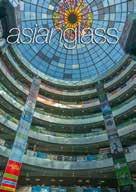

Customer Details
Method of Payment (please tick)
Payment has been sent to your bankers:
A/C name: Adamson-Russell Communications Ltd

Lloyds Bank PLC; P.O. Box 1000 BX1 1LT United Kingdom
Sort Code: 30-98-97 A/C No: 56809663
IBAN: GB22LOYD30989756809663
SWIFT Code: LOYDGB21031

All new subscribers will receive an invoice by email
In order to process your order, please sign and date below: Signature Date
Anaylsis Paul Russell - Asian Glass Email: prussell@asianglass.com Tel: +44 (0)
Valerie Adamson - Asian Glass Email: vadamson@asianglass.com Tel: +44 (0) 208 133 5273
208 638 0619
Asian Ceramics annual subscription (please tick)
Contact Name (Mr/Mrs/Ms/Dr) Position in company Company/Organisation Address Country Telephone Fax Email Please debit my credit card Mastercard Visa Amex credit cards will charged in GBP (UK Sterling) Card Number Expiry Date Security ID Please supply registered cardholder’s address if different to delivery address
High grade silica supply Gujarat in focus Glazing developments Isthisyourowncopy? PBang rocessors …and it’s goodbye from me; AG editor retires after 20 years Covers_CURRENT.indd GujaratHighgradesilicasupply infocus Glazingdevelopments Isthisyourowncopy? subscribeonlineatwww.asianglass.com AG22-1 PBangladesh: rocessors in focus …andit’sgoodbyefromme;AGeditorretiresafter20yearsCovers_CURRENT.indd 31/01/2022 20:32 Subscription enquiries: Once you have completed this order form, please return it to: 135 GBP 175 Euros 270 USD Post: ARC Ltd, 27 Old Gloucester Street, London WC1N 3AX, UK Asian Glass (ISSN: 1475-6501), is published by Adamson-Russell Communications Ltd, registered in the UK No. 13652192, 27 Old Gloucester Street, London, WC1N 3AX, UK. VAT: 401304956. Data Protection Notice The personal information you give on this form will be held on a database by Adamson-Russell Communications Ltd. in the UK and internationally. Your contact details may be used by us to contact you from time to time with offers on similar products and services: Please tick if you do NOT wish to receive these by: Mail ❑ Email ❑ Tel ❑. From time to time we may pass your details on to carefully selected companies approved by us who wish to contact you. Please tick if you do NOT wish to receive these by Mail ❑ Email ❑ Tel ❑ Subscriptions last for one year (6 issues) and includes airmail delivery GET EVERY ISSUE


In the next issue... AG23-1 PLUS: news, views, analysis and much, much more! CAN YOU AFFORD TO MISS OUT? CONTACT US TO SUBSCRIBE TODAY, OR USE THE FORM IN THIS ISSUE: E: enquiries@asianglass.com www.asianglass.com VIPV prospects: driving on sunshine Central Asian Flat Glass: An analysis ASEAN glass tableware: examining the rise of the sector TECH FOCUS: Lithium market demand and supply Isthisyourowncopy? Subscribeonlineatwww.asianglass.com AG23-1 e Turkishntainer glass ustry: what es it Plus news, views, interviews and more… 08/12/2022 16:55 • VIPV prospects: driving on sunshine • Central Asian Flat Glass: An analysis • ASEAN glass tableware: examining the rise of the sector • TECH FOCUS: Lithium market demand and supply Is this your own copy? Subscribe online at www.asianglass.com AG23-1 The Turkish container glass industry: what drives it Plus news, views, interviews and more… AG Covers_CURRENT.indd 1 08/12/2022 16:55 Features include GLASSMAN EUROPE ISTANBUL, TURKEY See us at • The Turkish container glass industry: what drives it • VIPV prospects: driving on sunshine • Central Asian Flat Glass: An analysis • ASEAN glass tableware: examining the rise of the sector • TECH FOCUS: Lithium market demand and supply

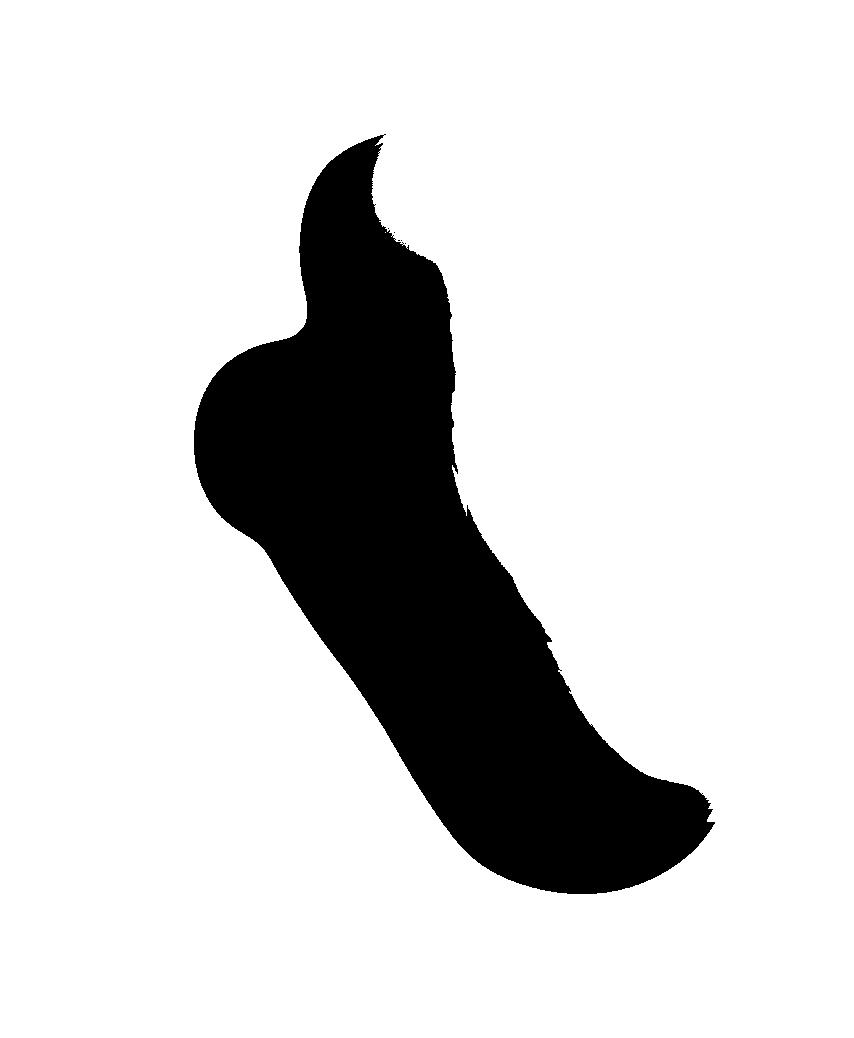
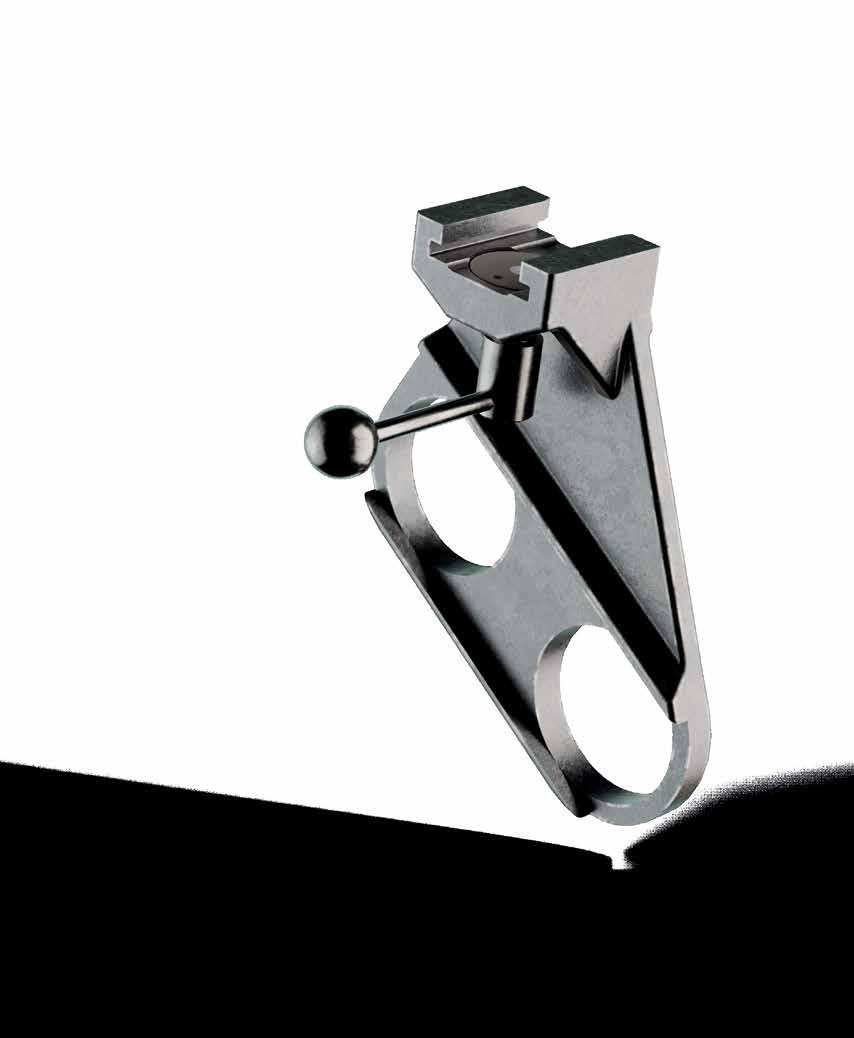
Choose only the best original parts for your machines.
emhartglass.com
when it comes to delivering quality.
When you need a batch plant or cullet treatment, come to the specialist. We are independent and dedicated entirely to producing the finest batch plants, cullet plants and associated products. Zippe has been on the cutting edge of technology for over 100 years and place this innovative spirit and expertise at your disposal.
Be it batch plants, cullet plants, automation, modernization, engineering, factory cullet recycling, glass recycling, batch charging, glass level measuring, preheating, as well as maintenance & service, with Zippe you’re right from the start!
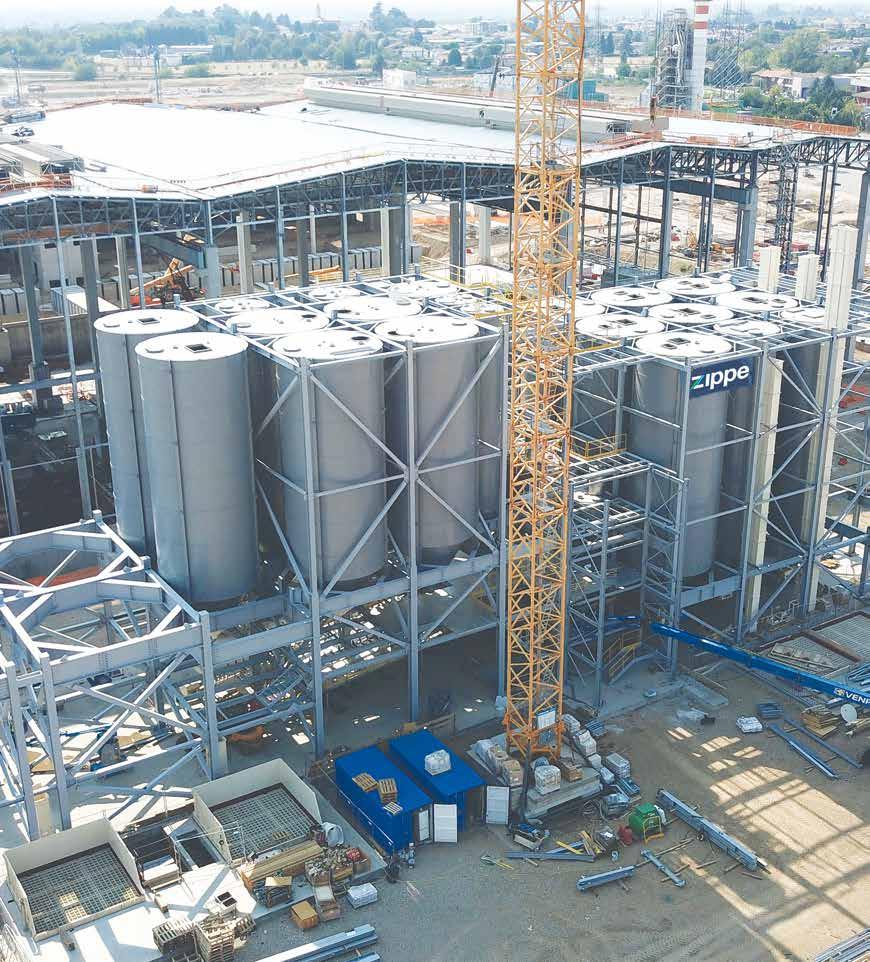
T: +49 9342 8040 zippe@zippe.de www.zippe.de
from the start
right






 Machinery, services and solutions designed with the future in mind for the architectural, automotive, solar and appliance industries.
Machinery, services and solutions designed with the future in mind for the architectural, automotive, solar and appliance industries.















































































































































































































































































































